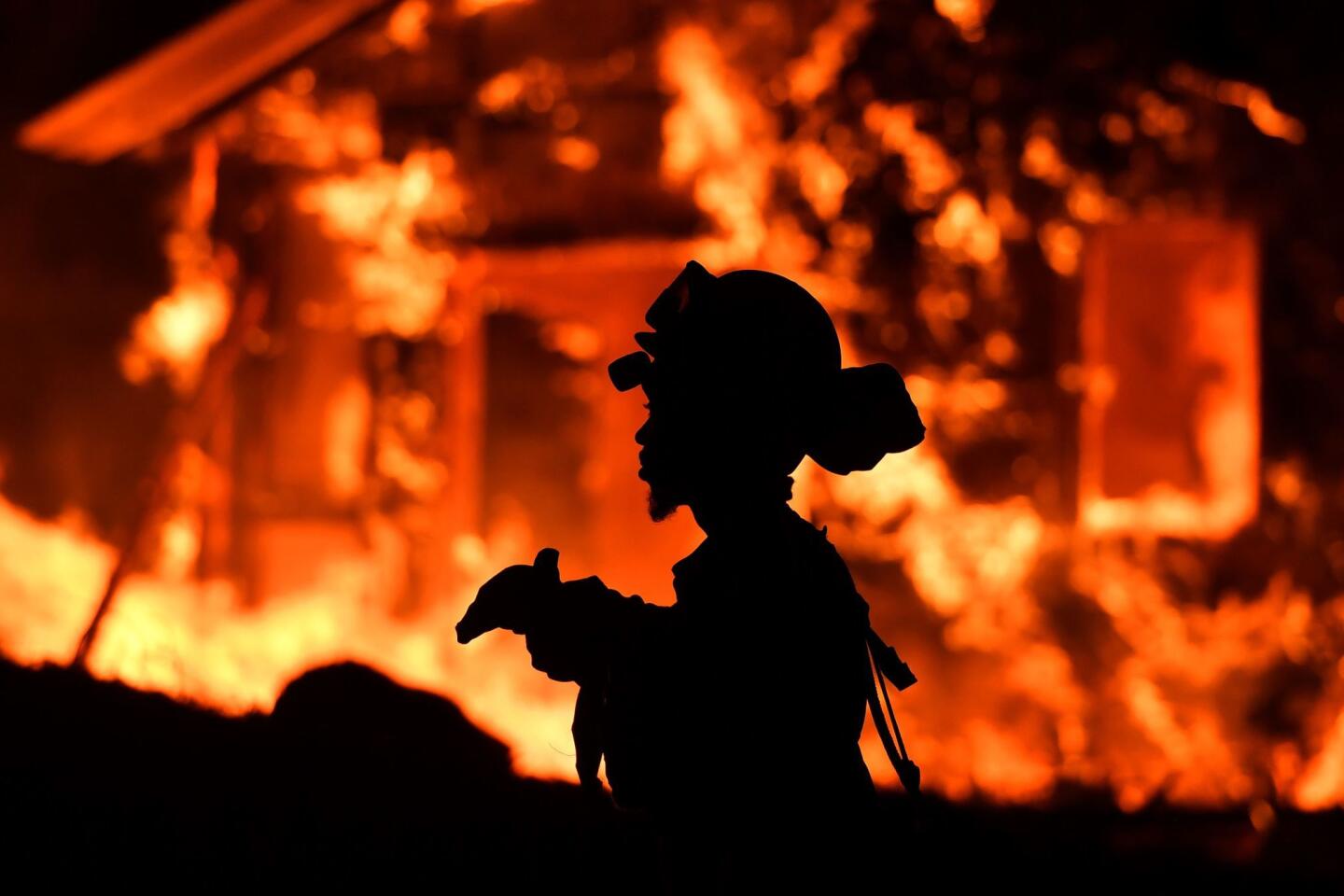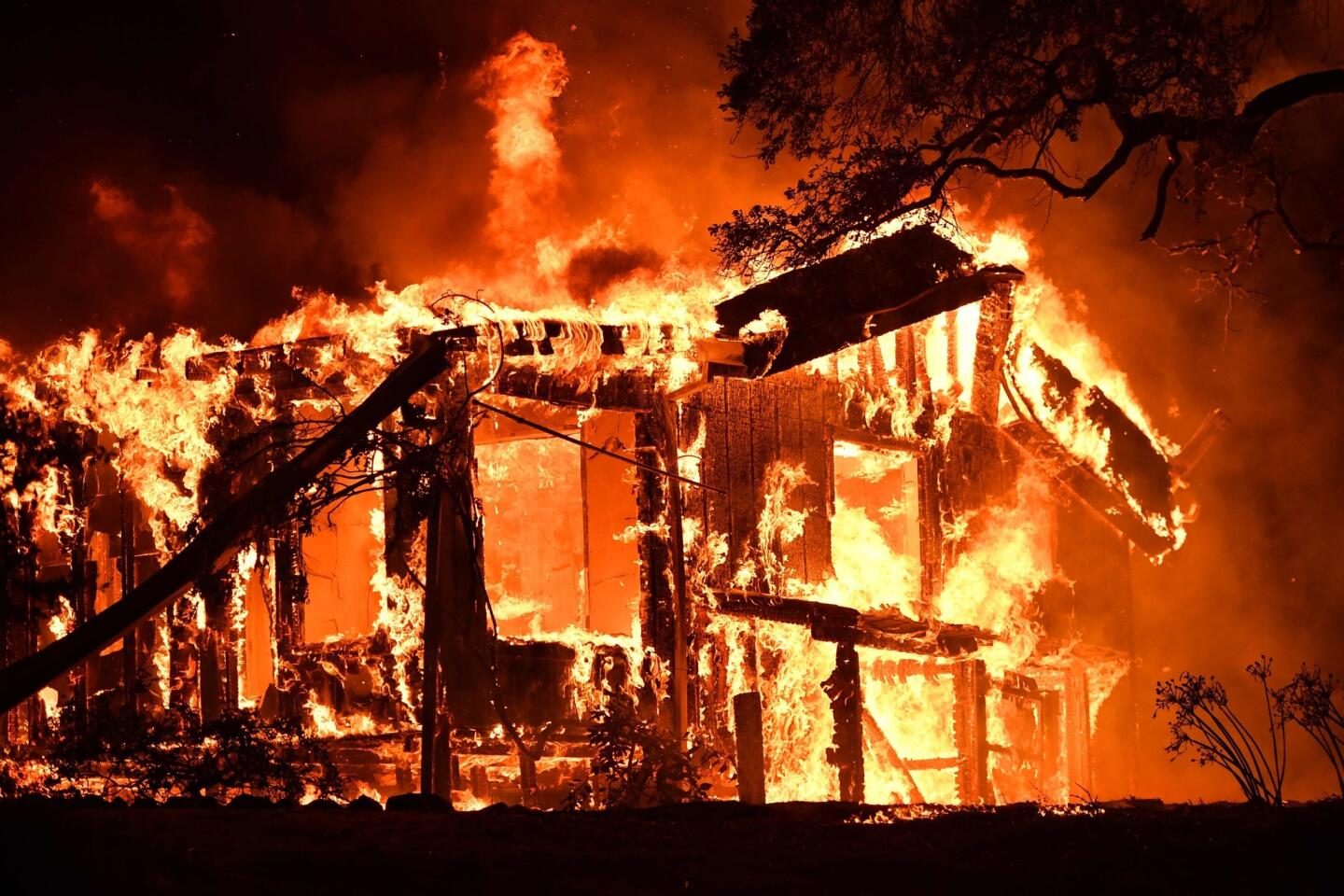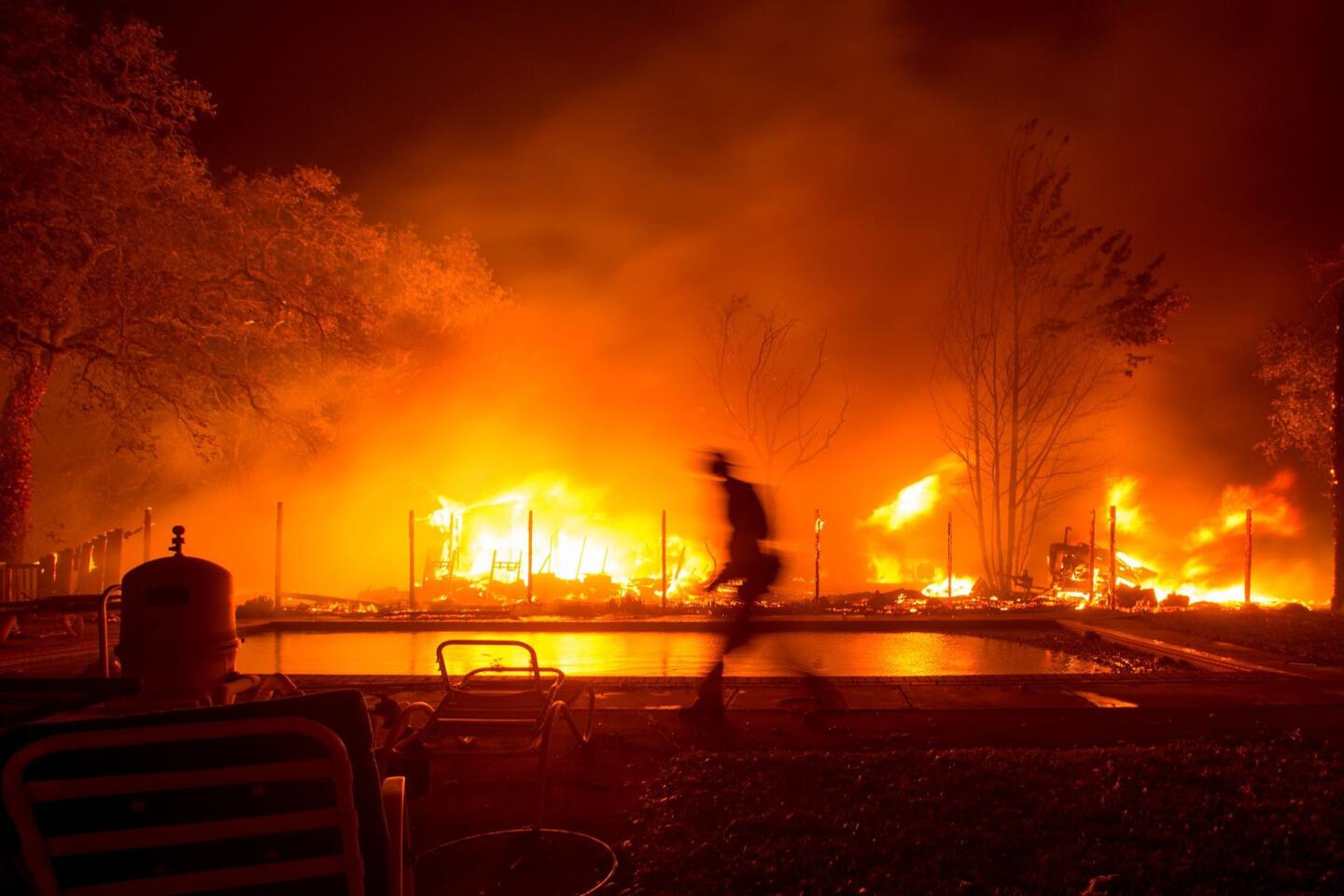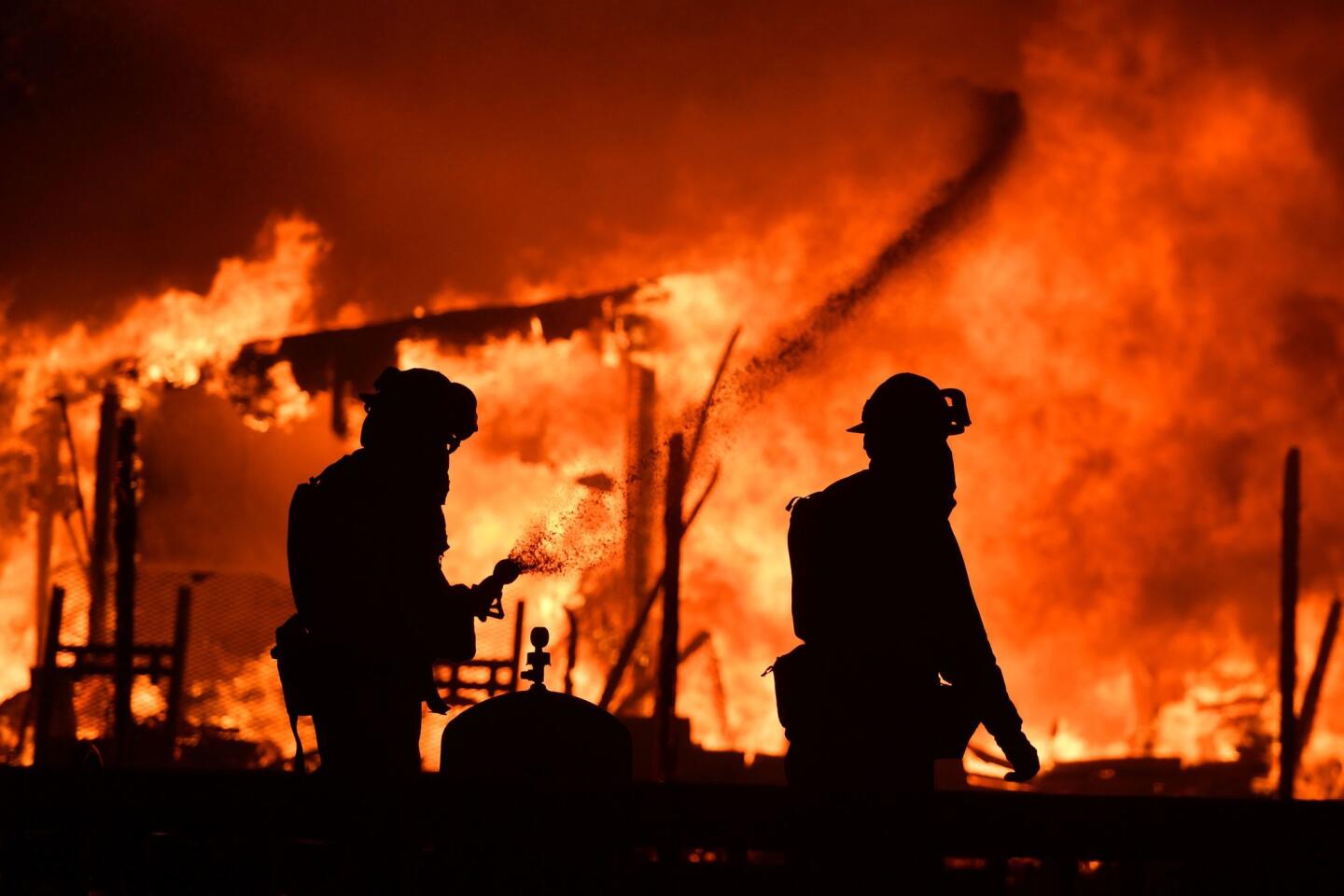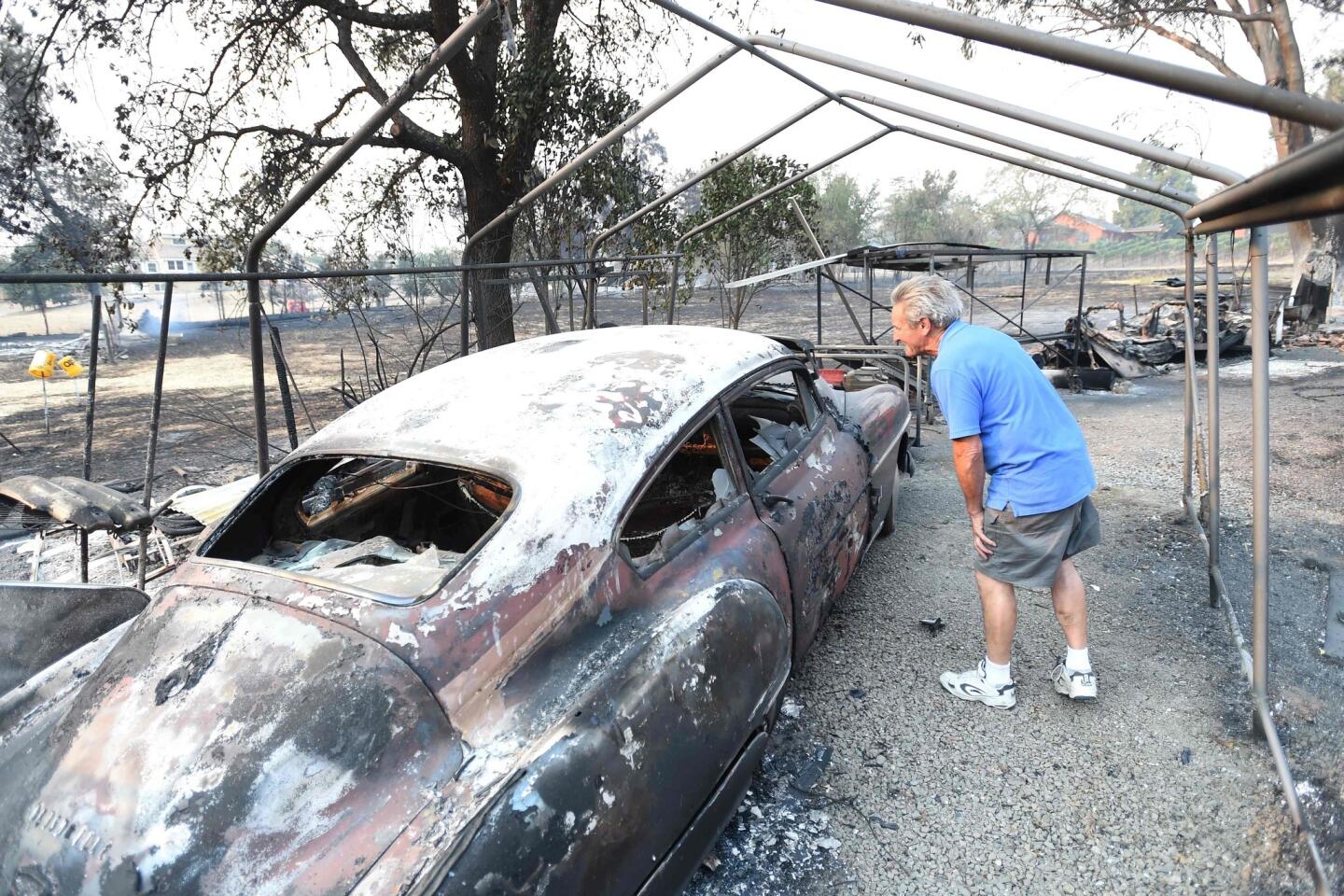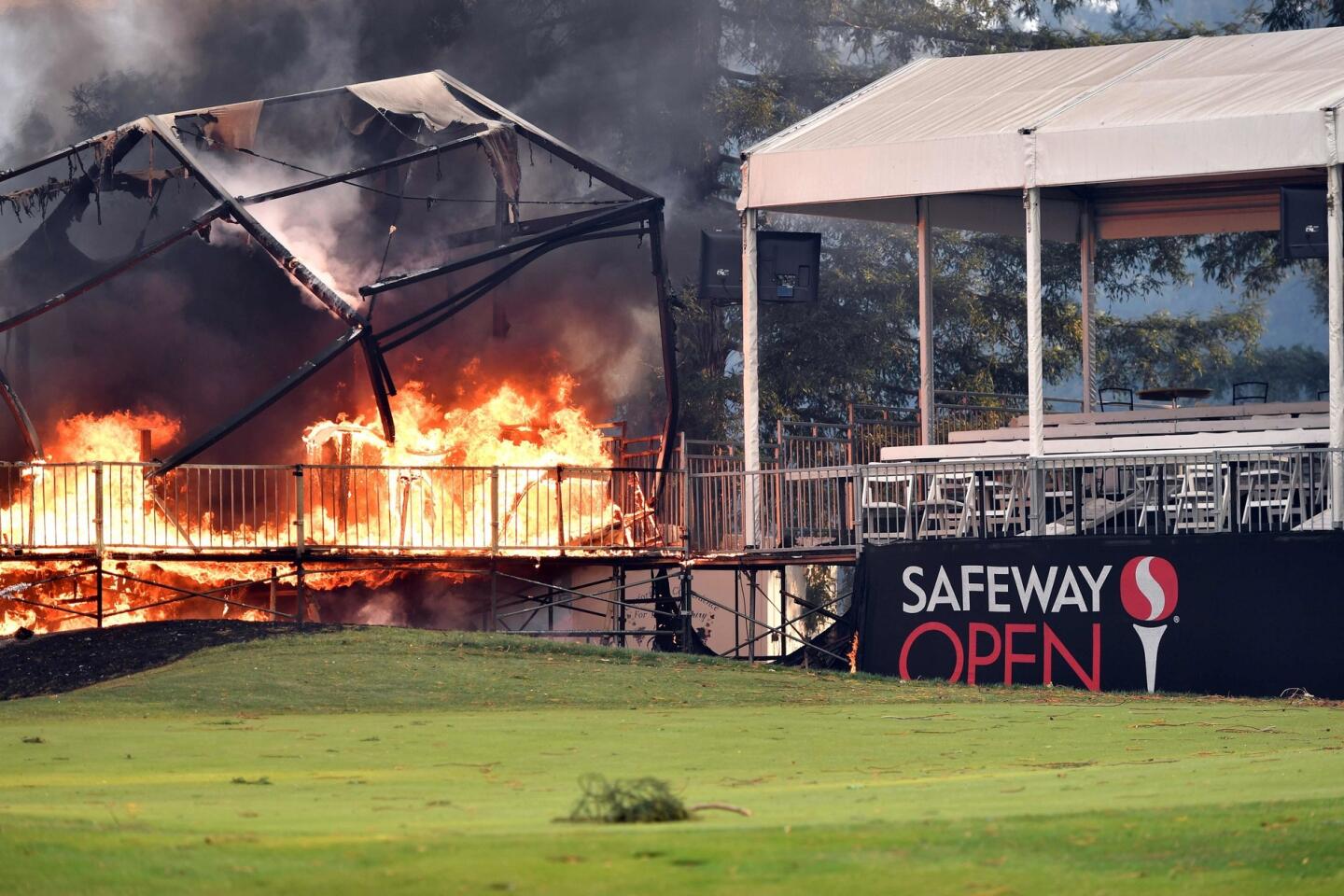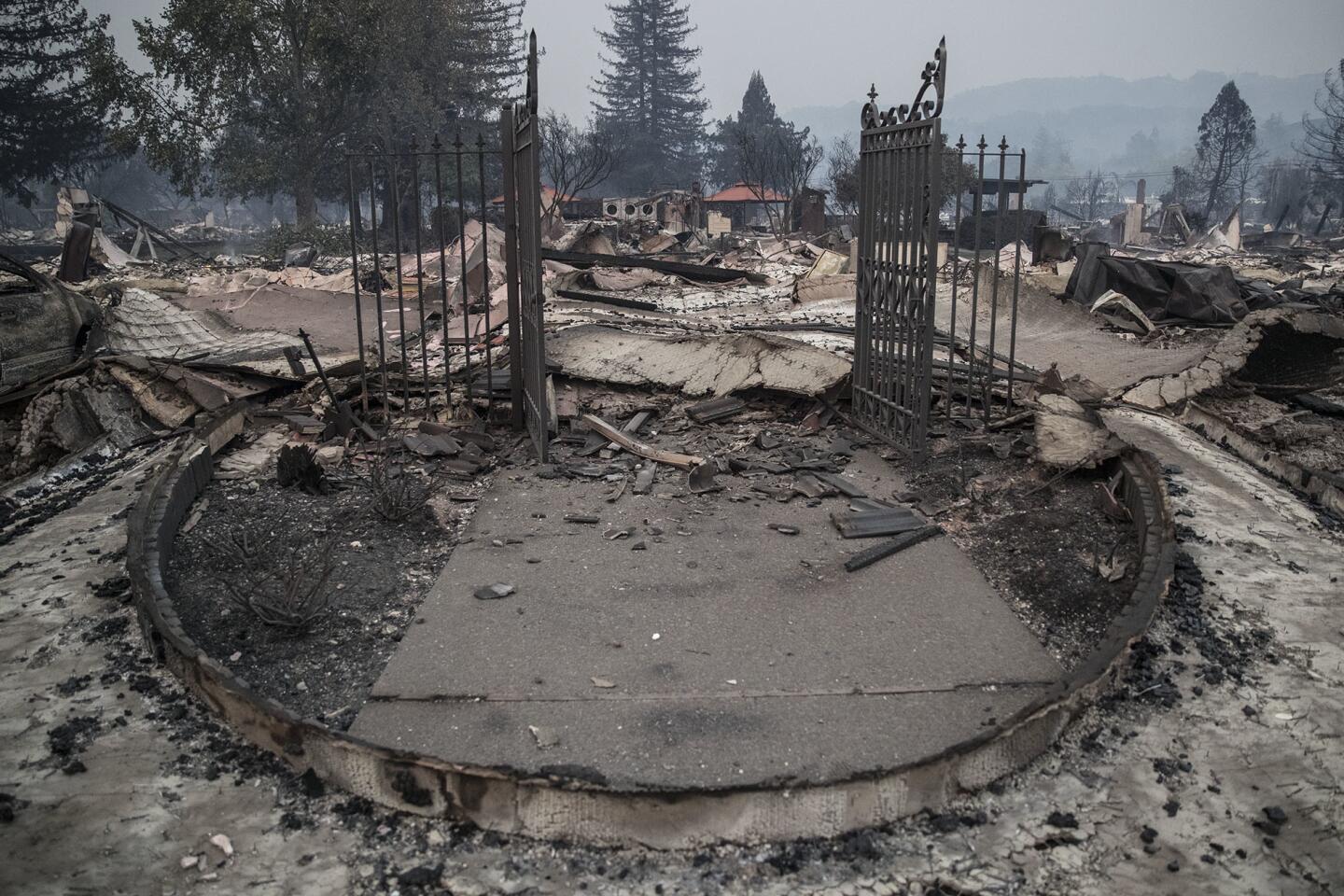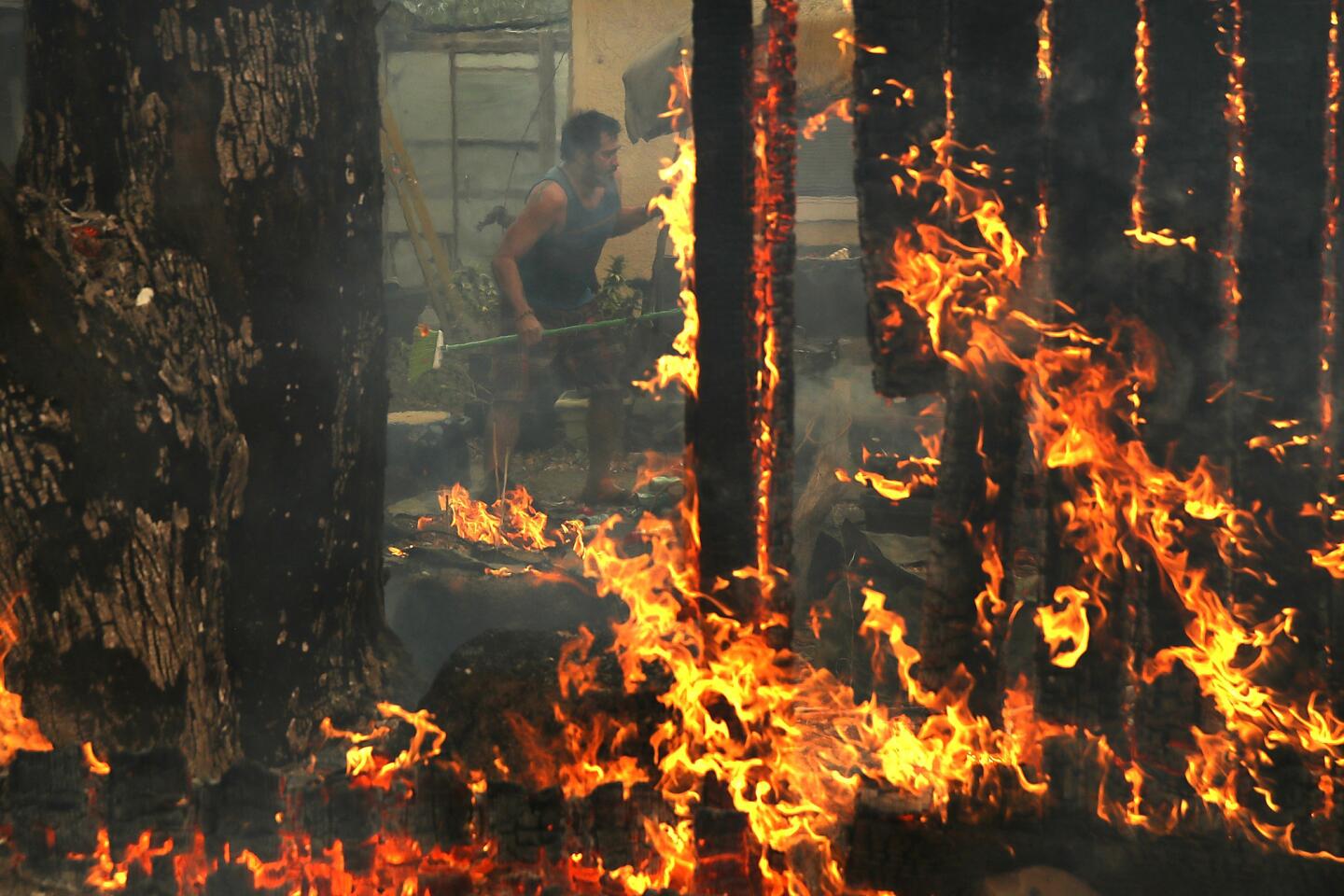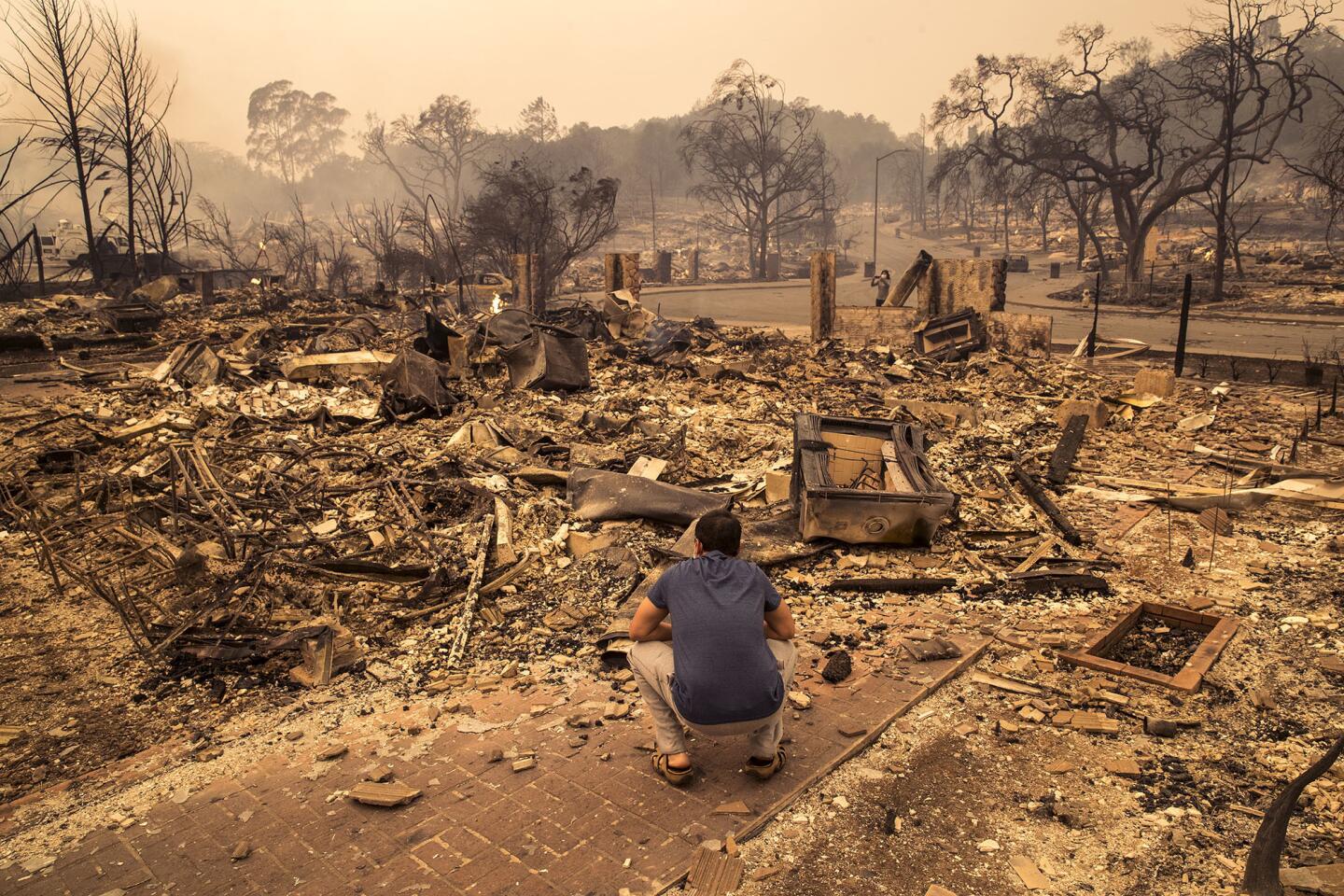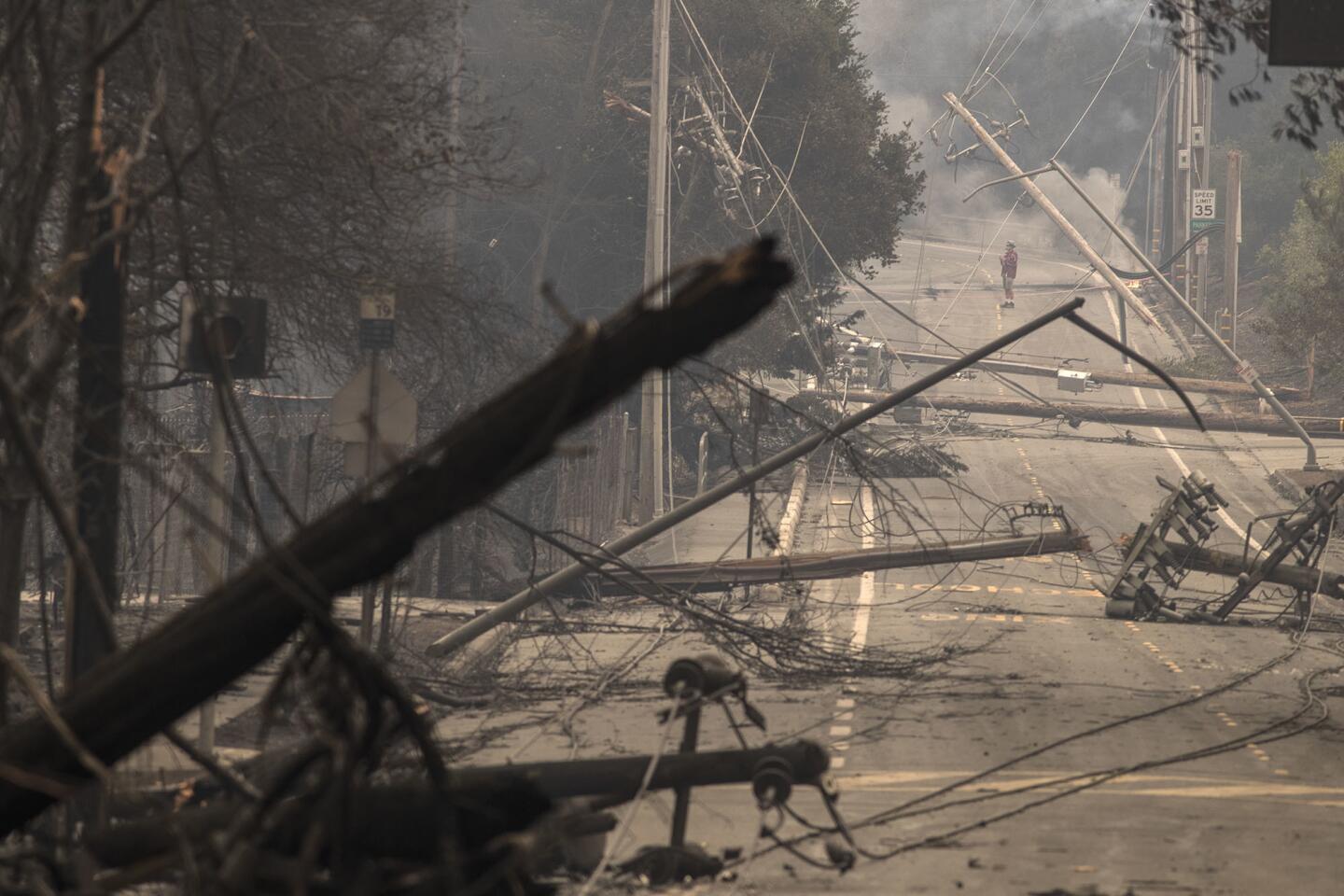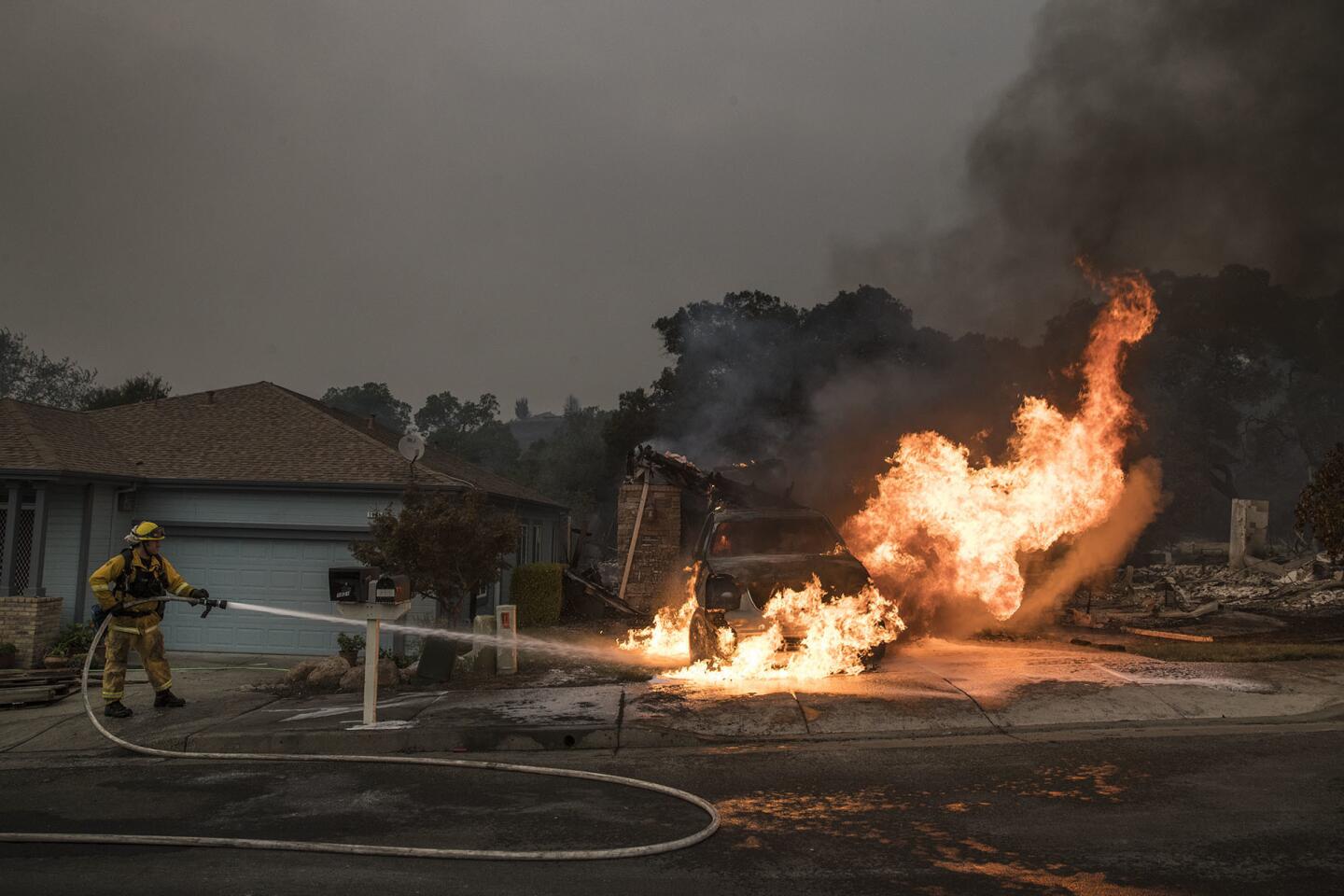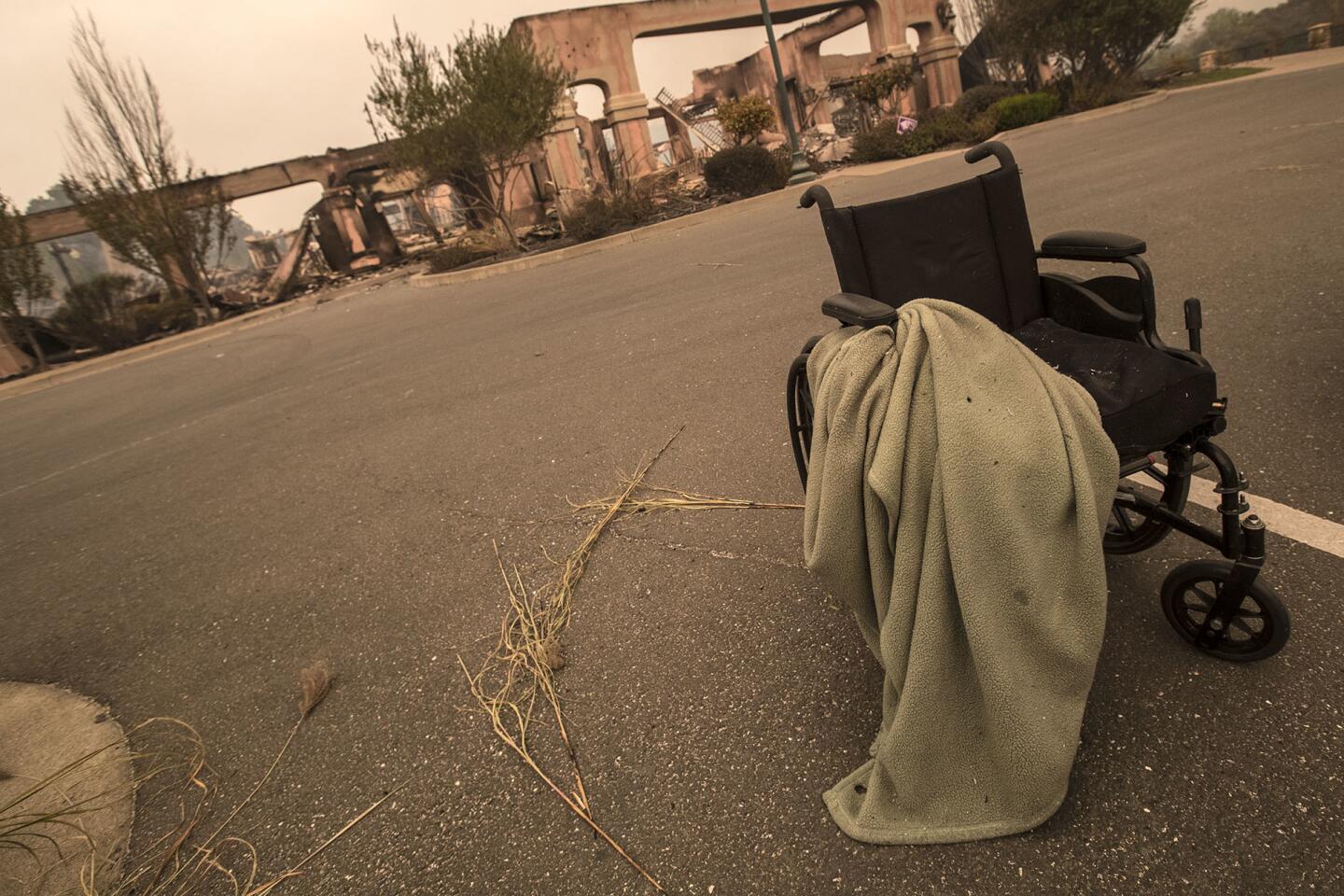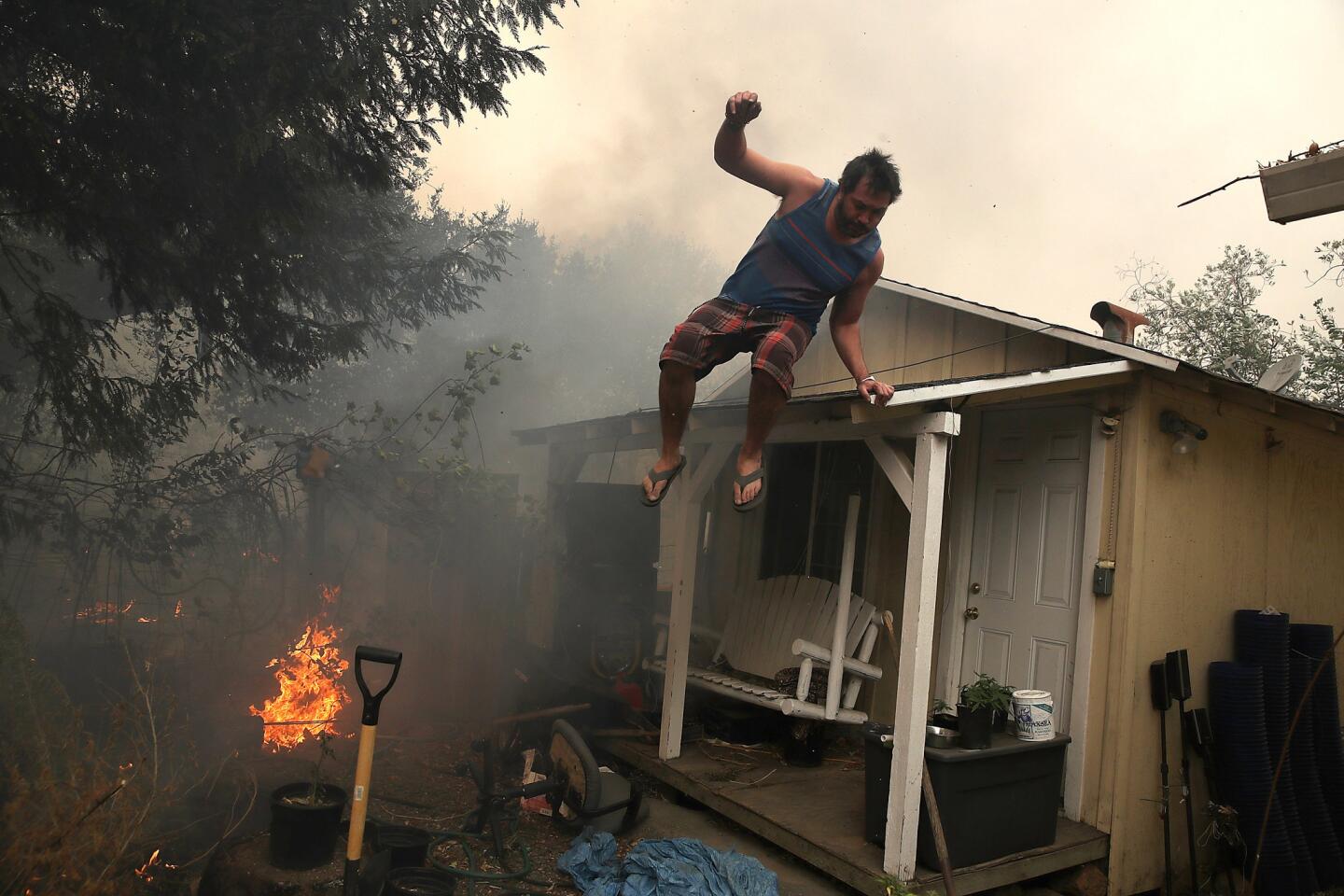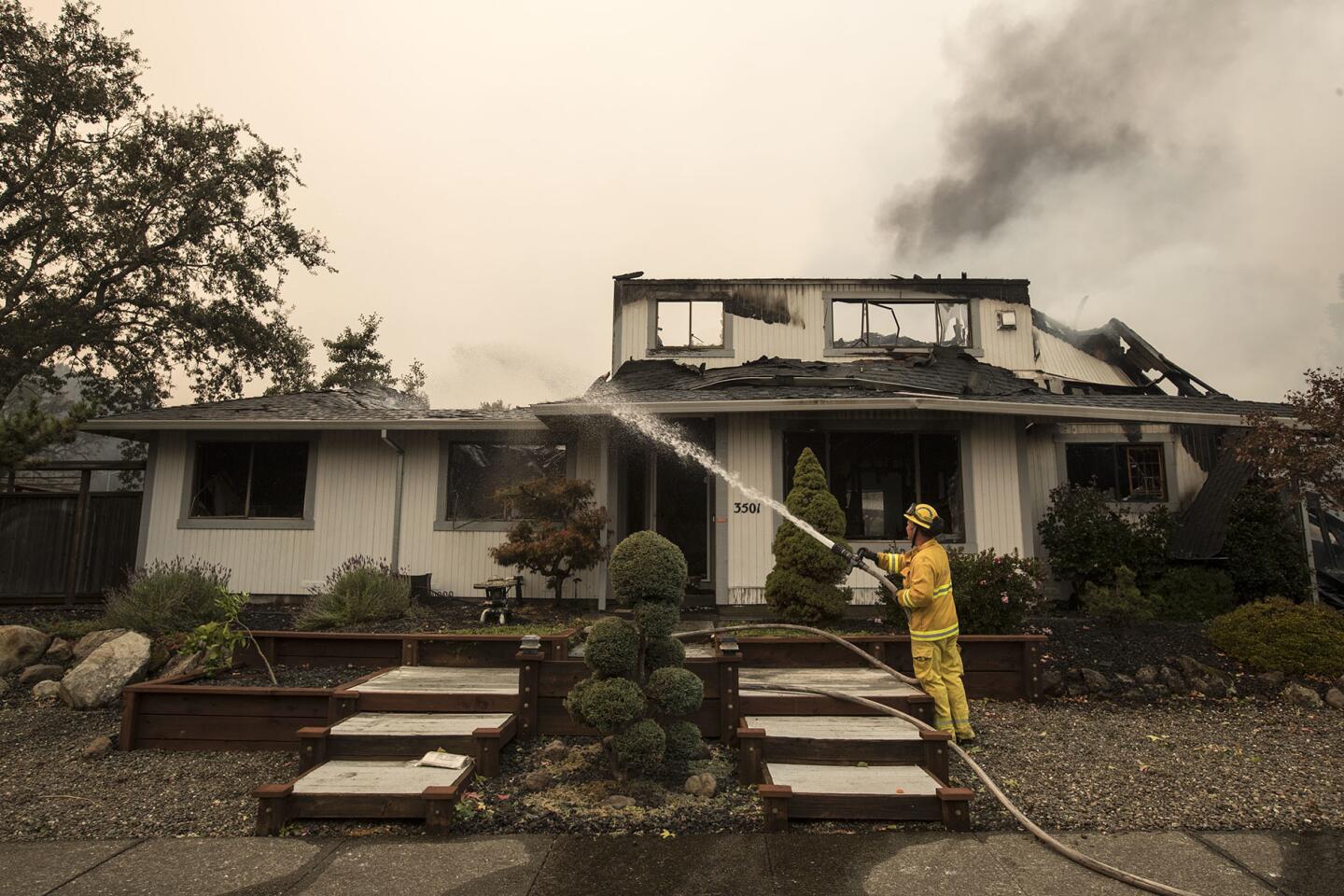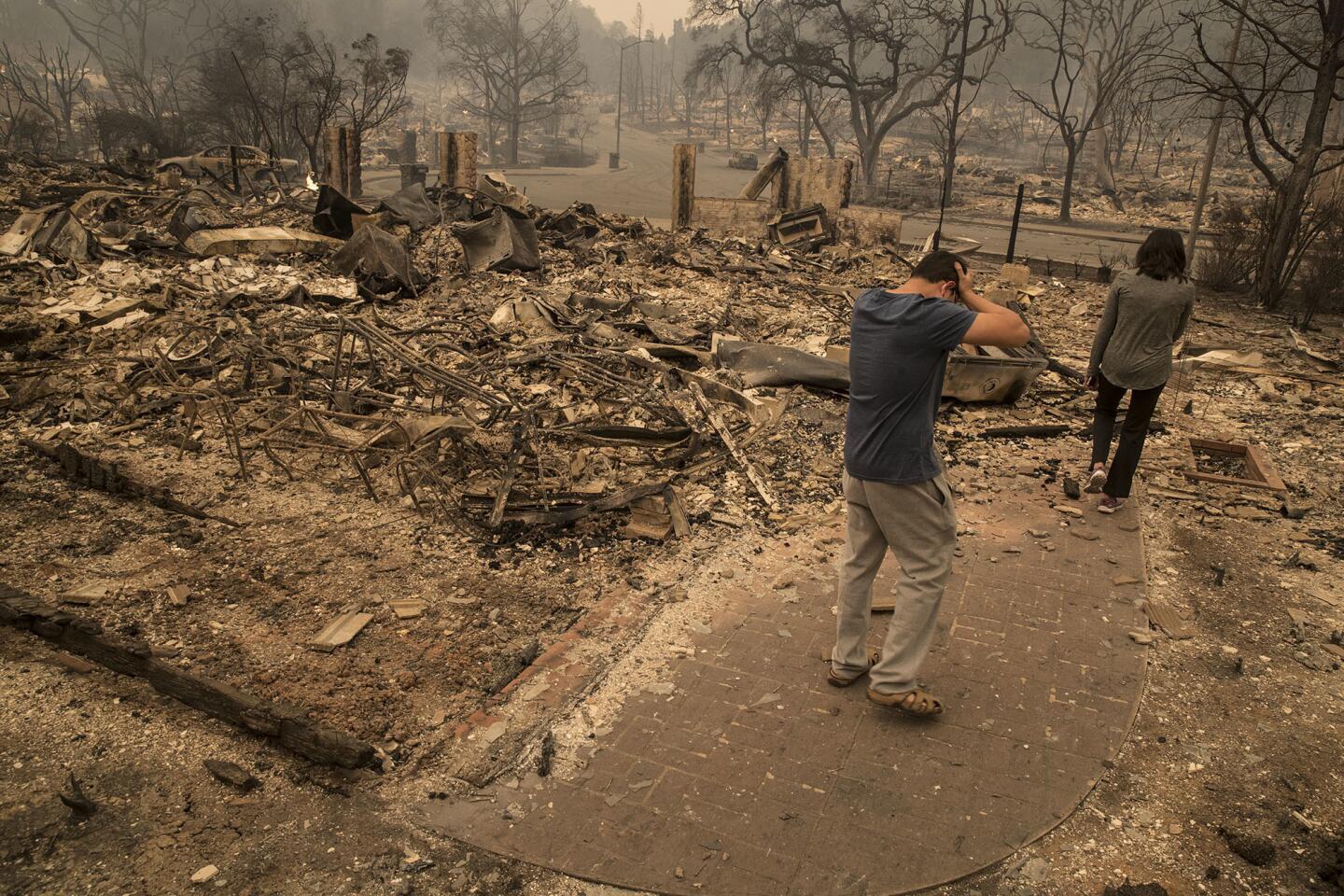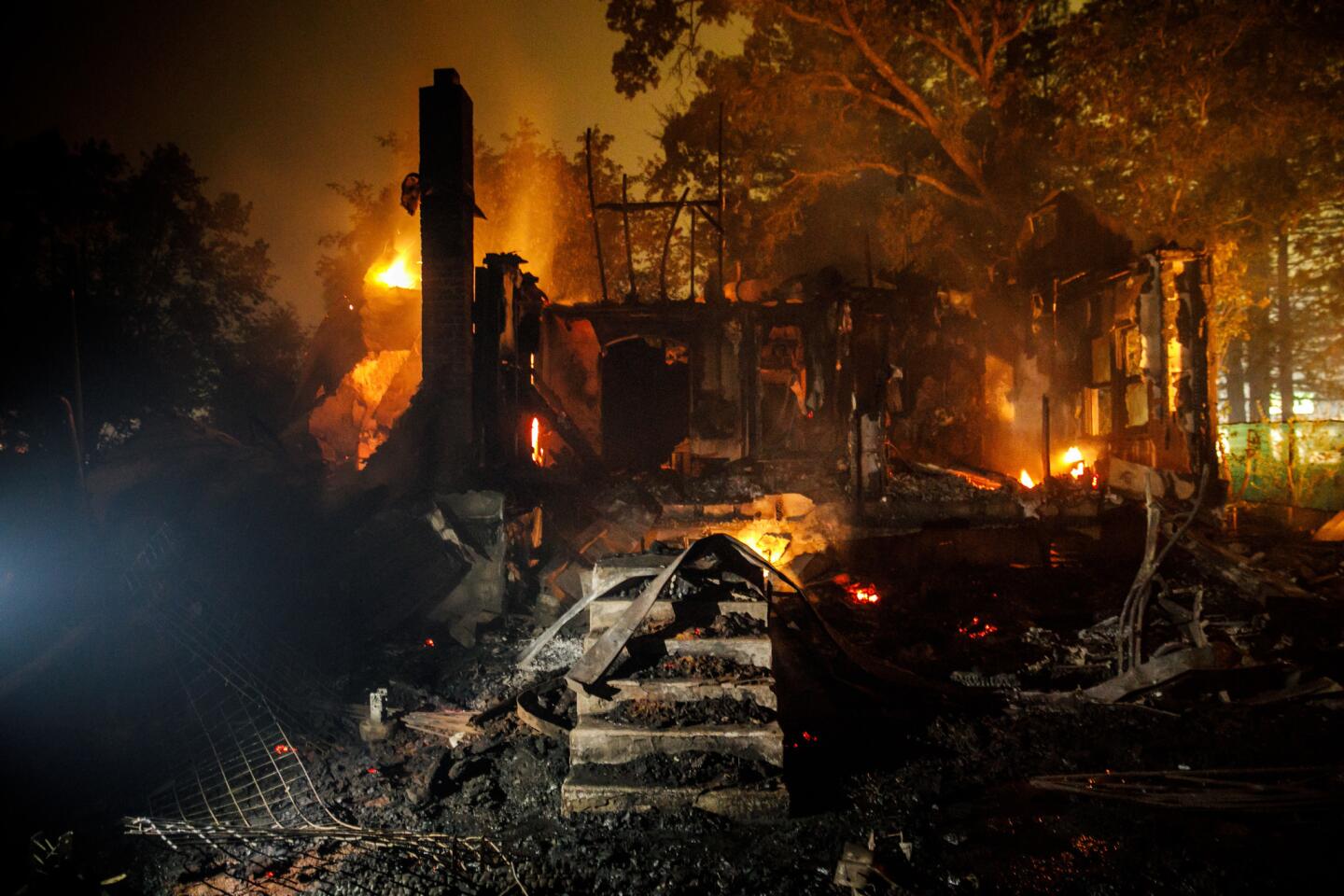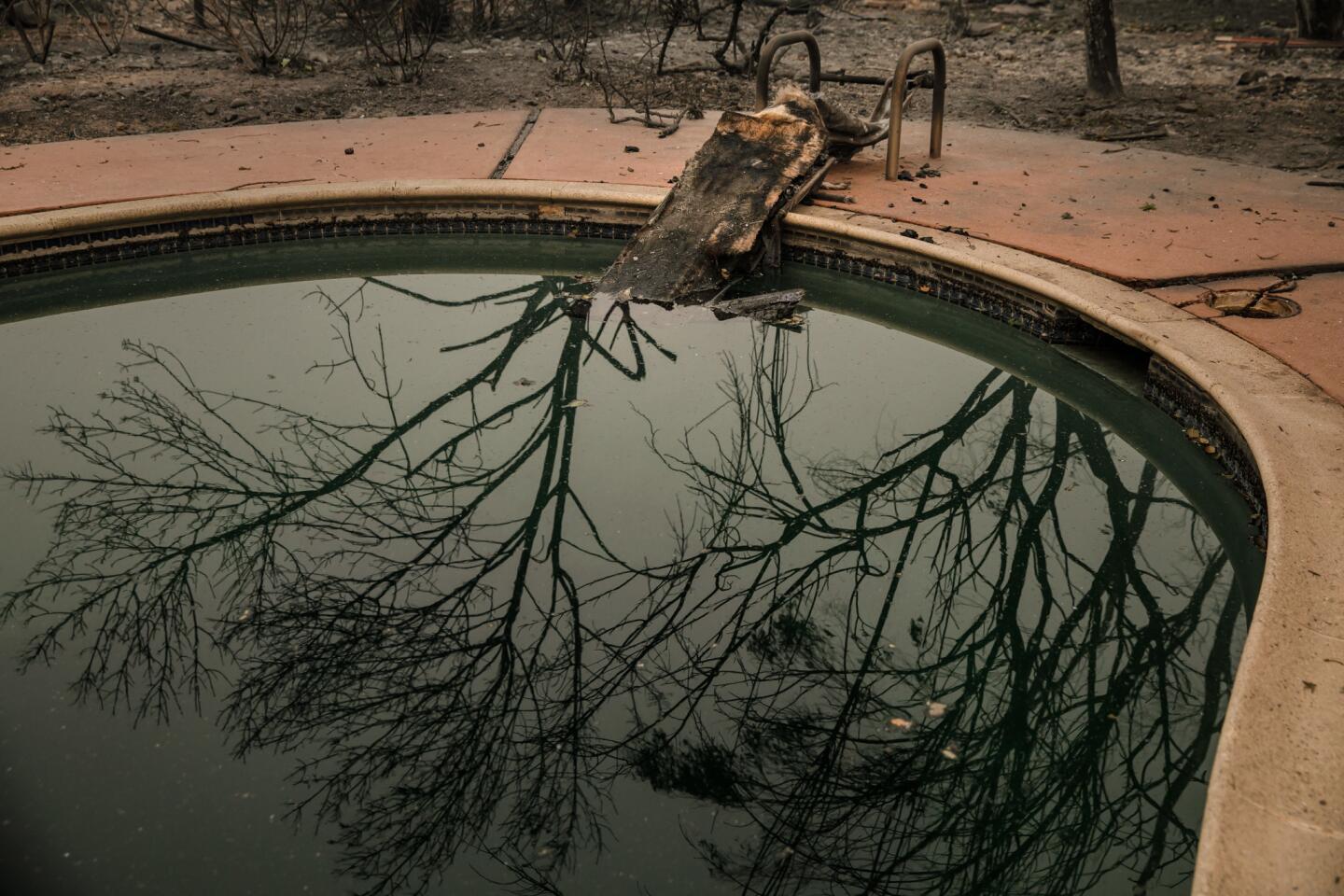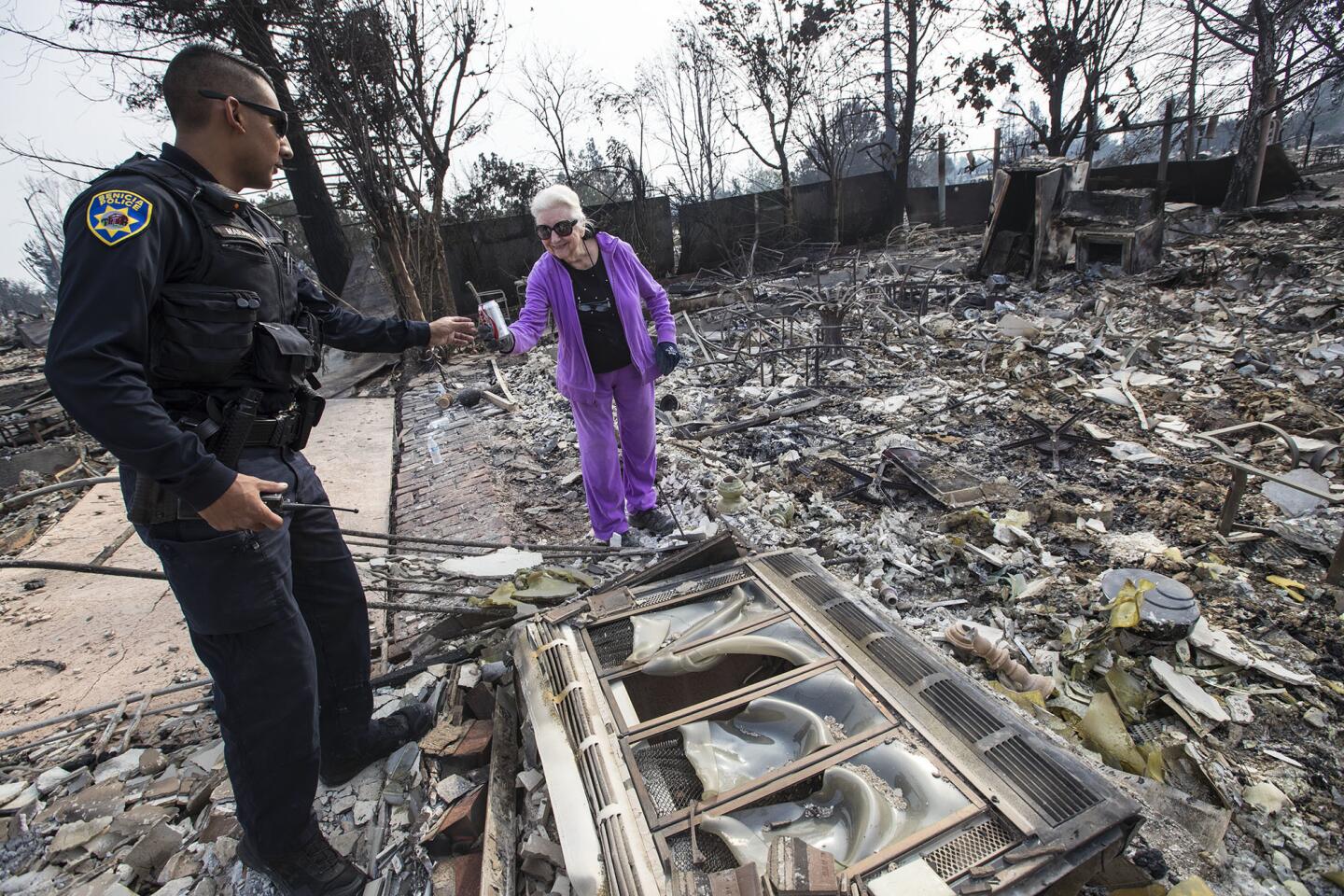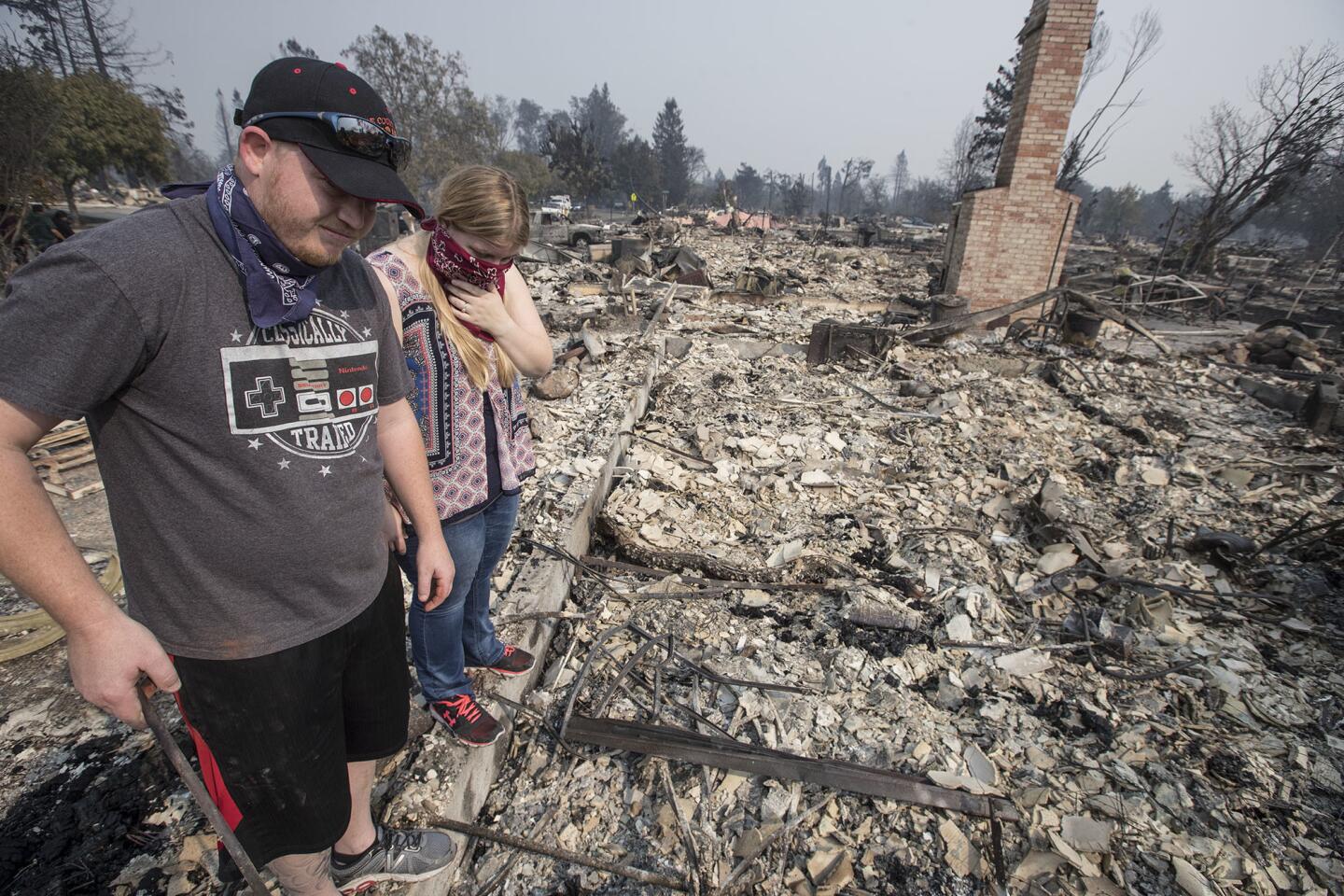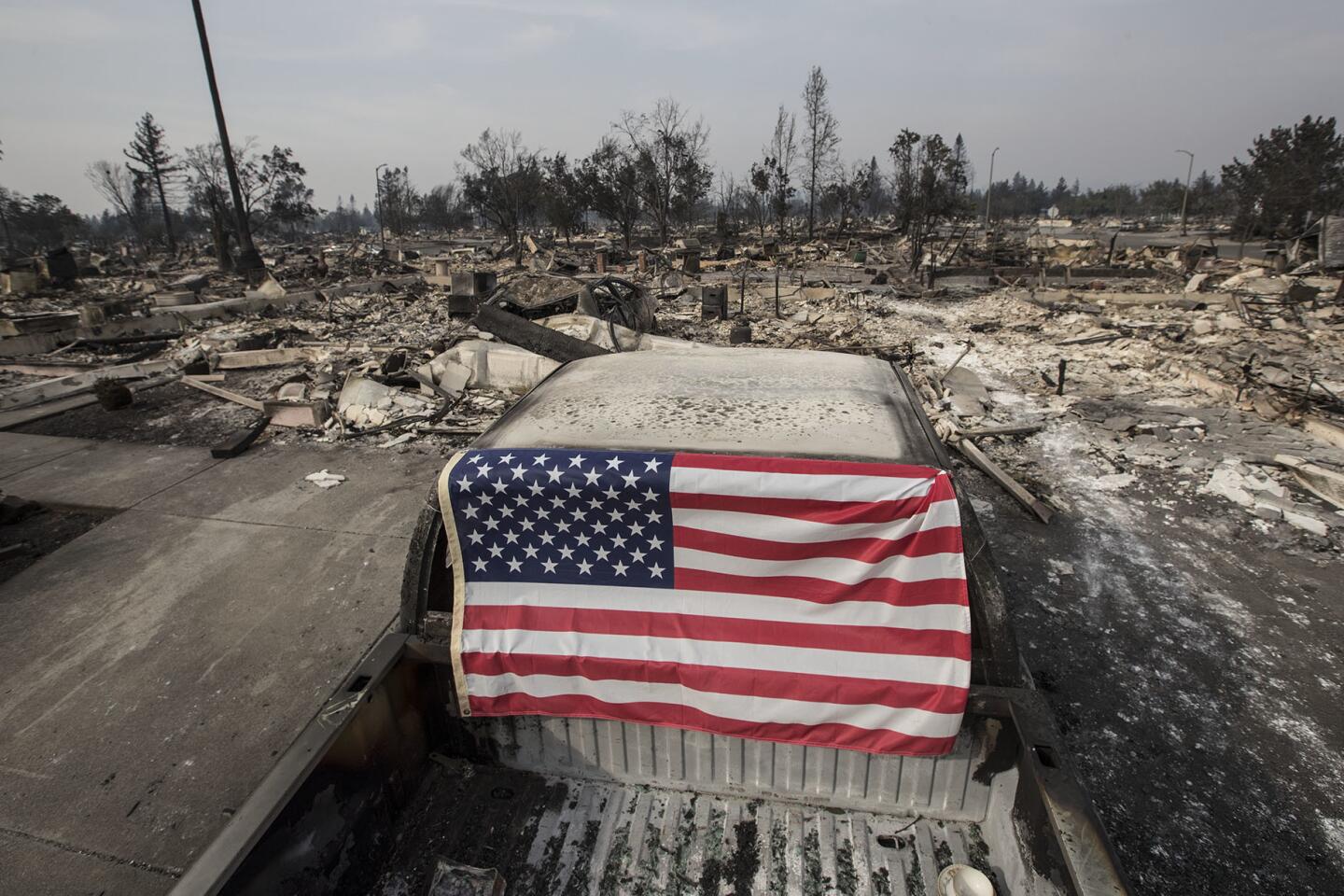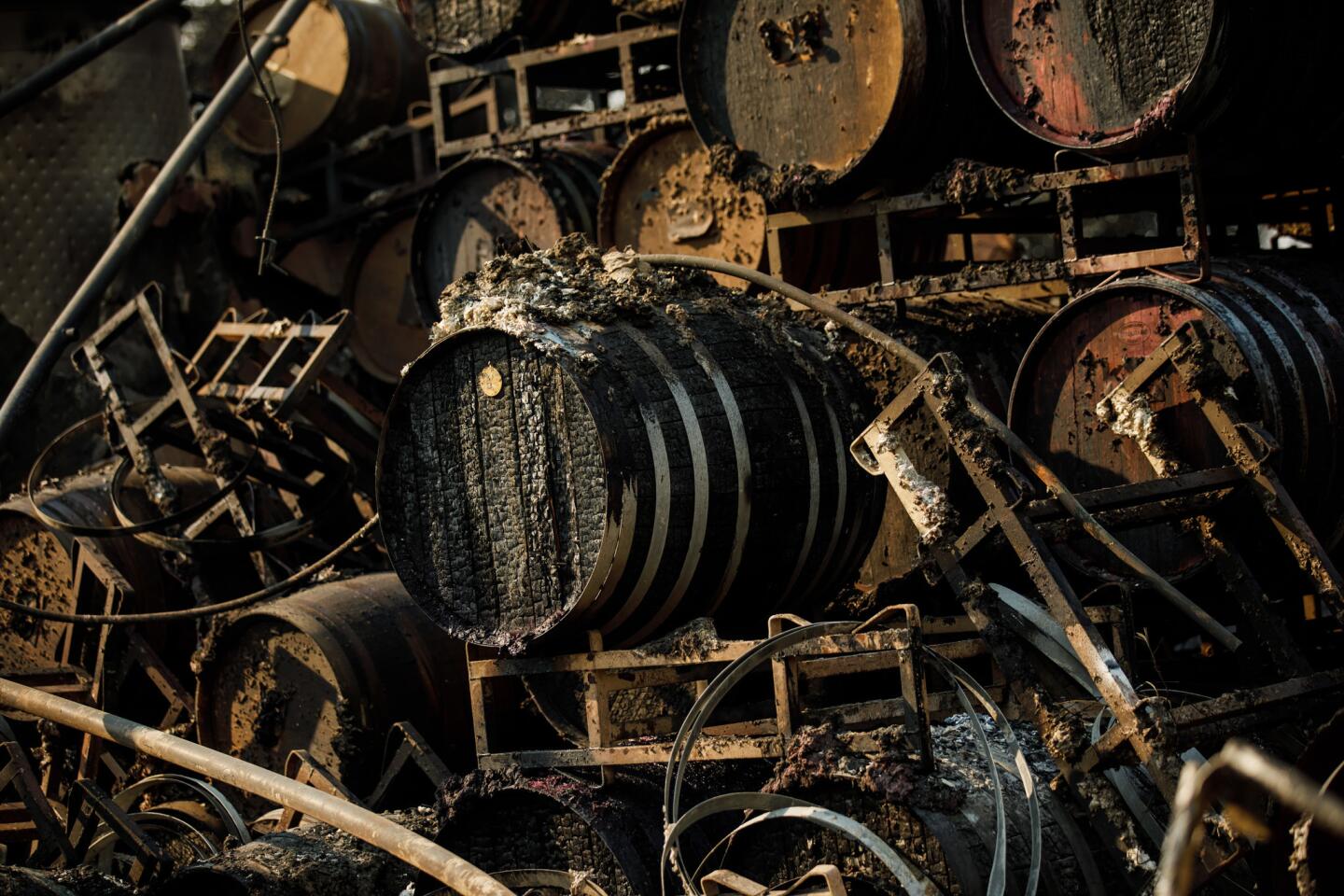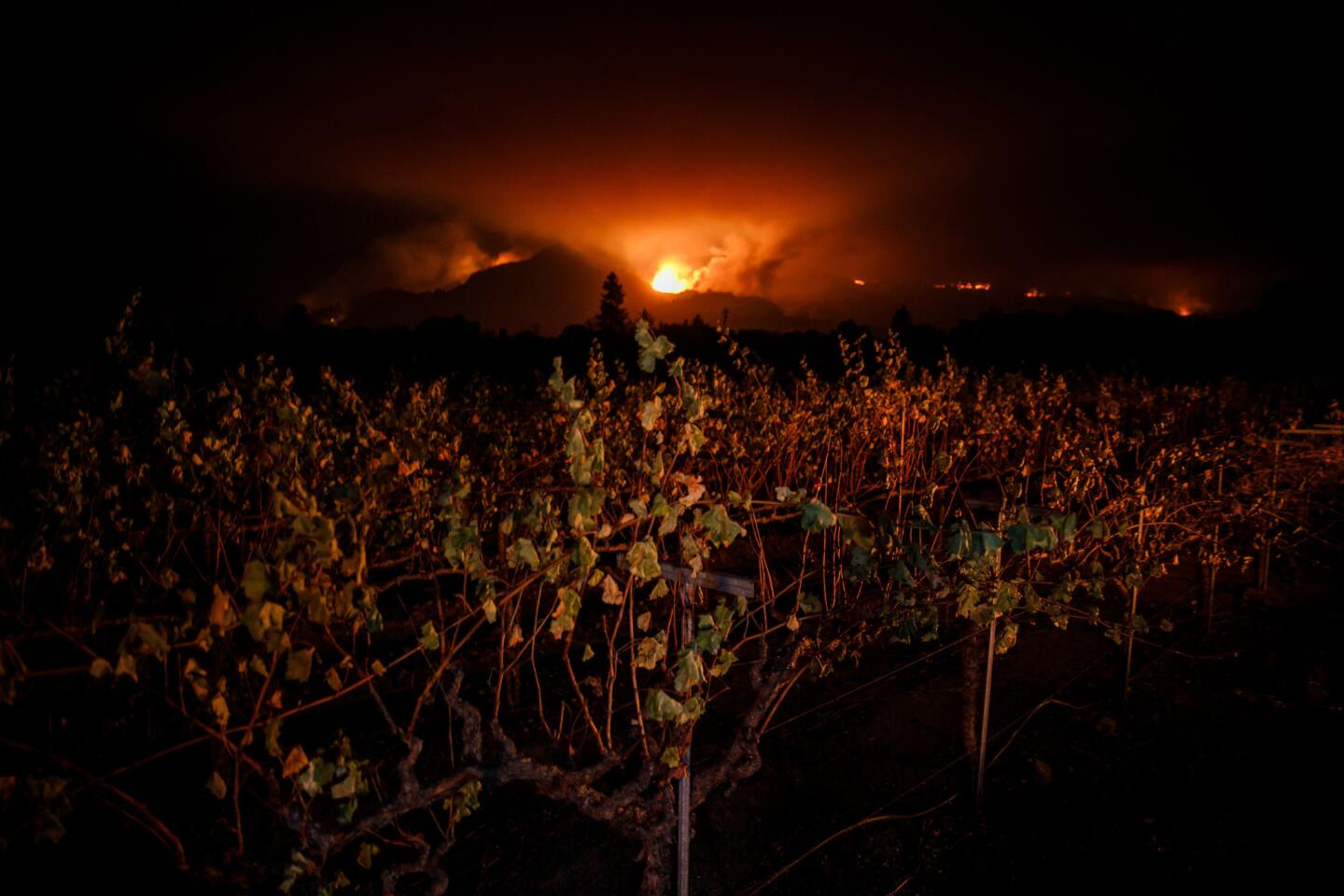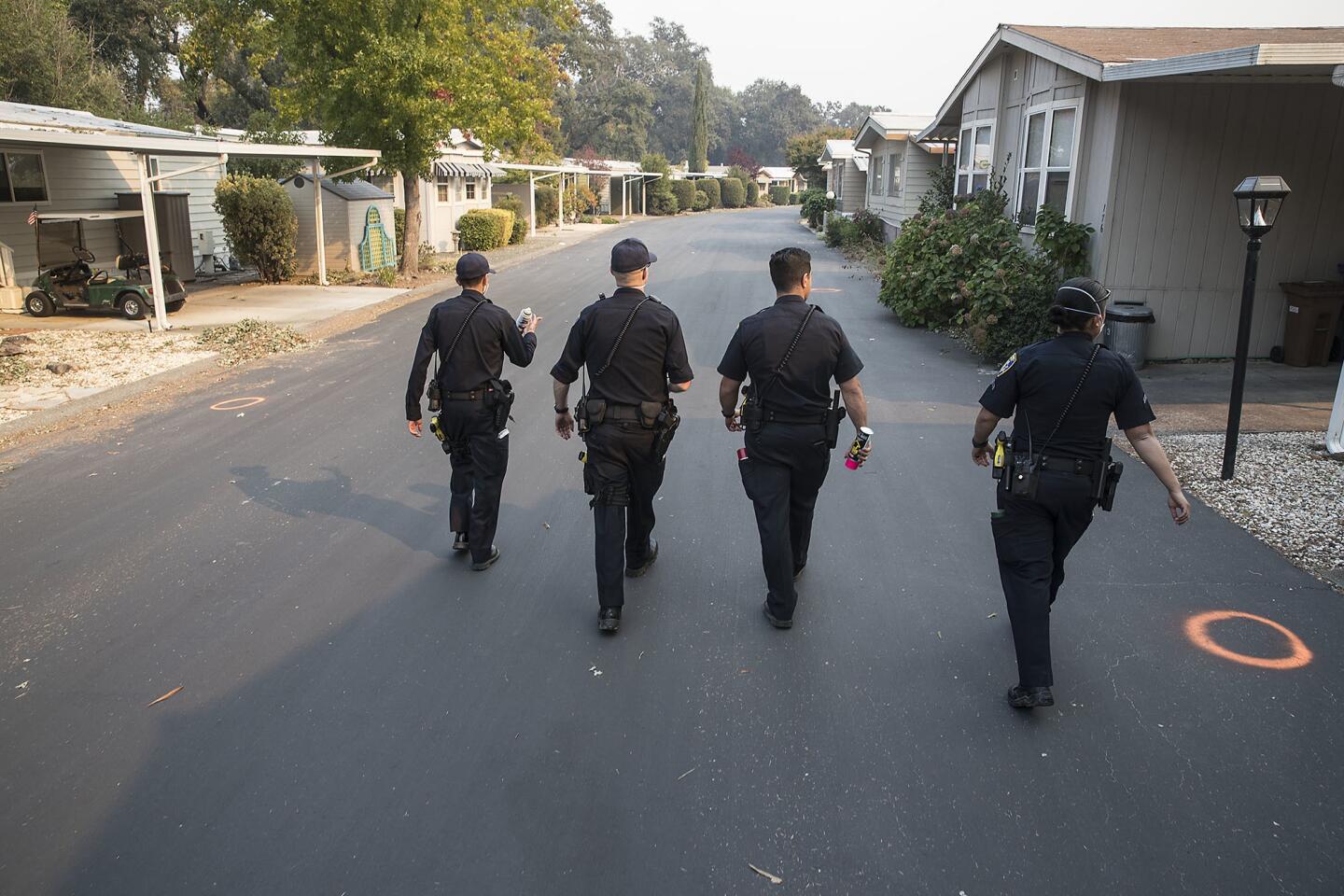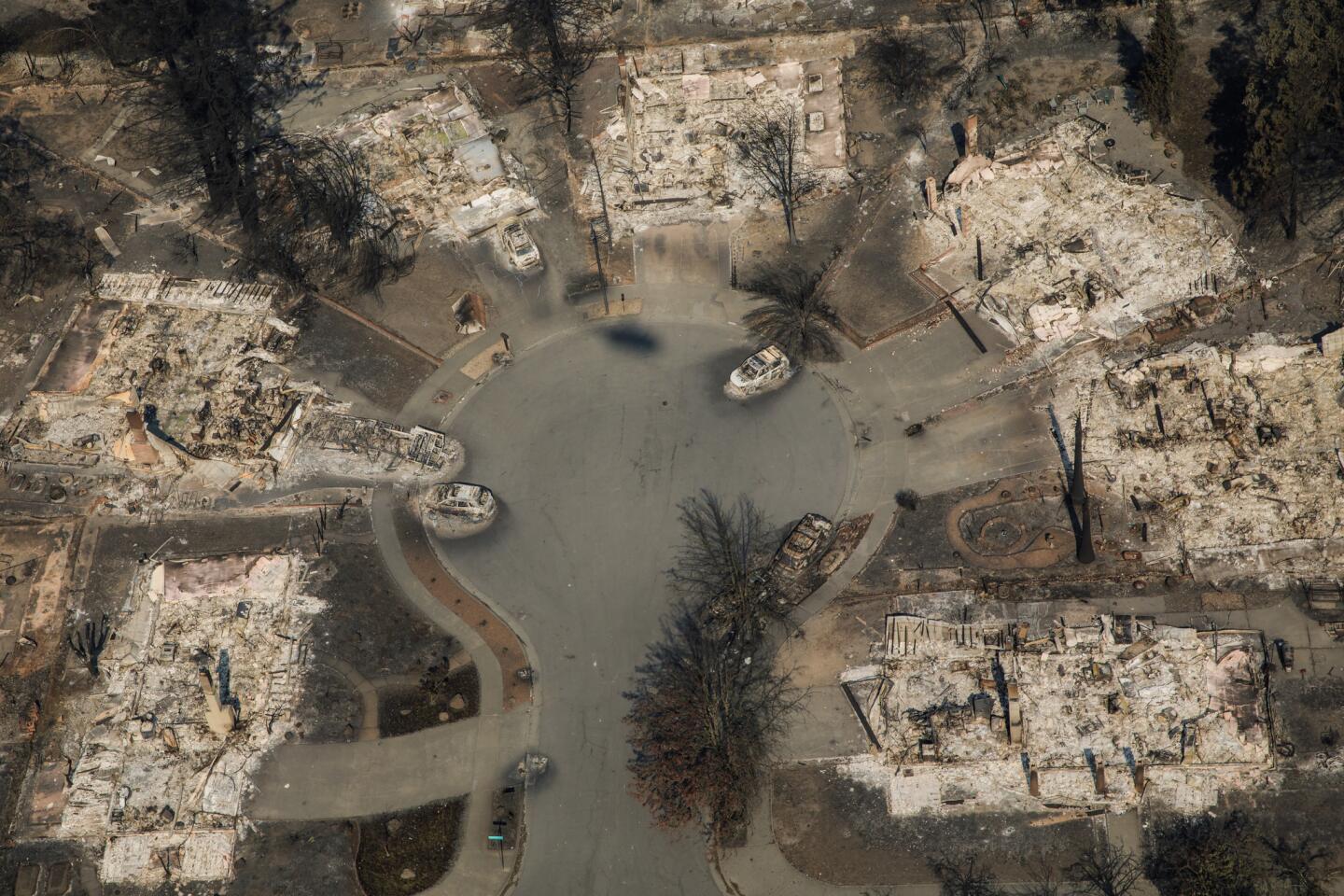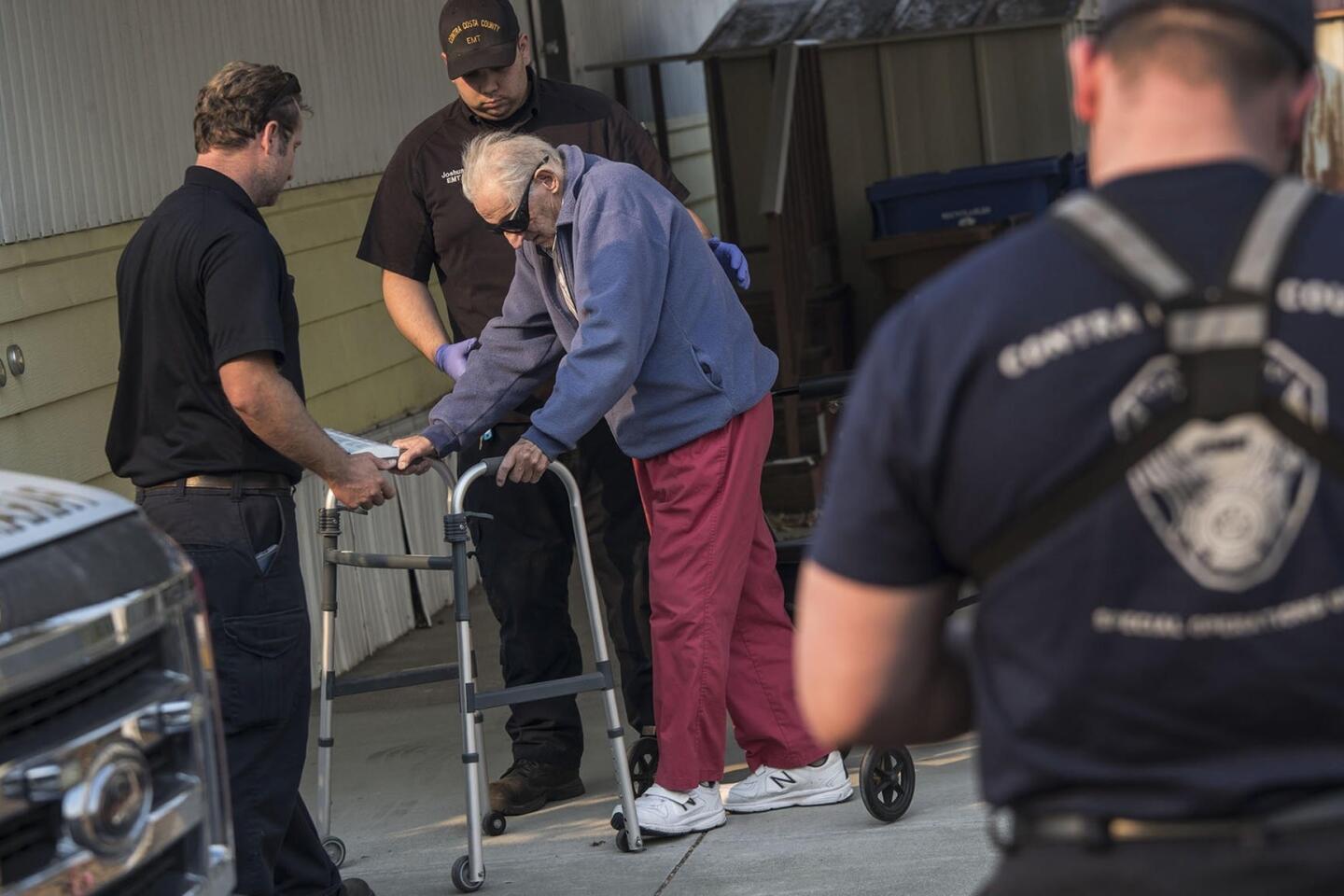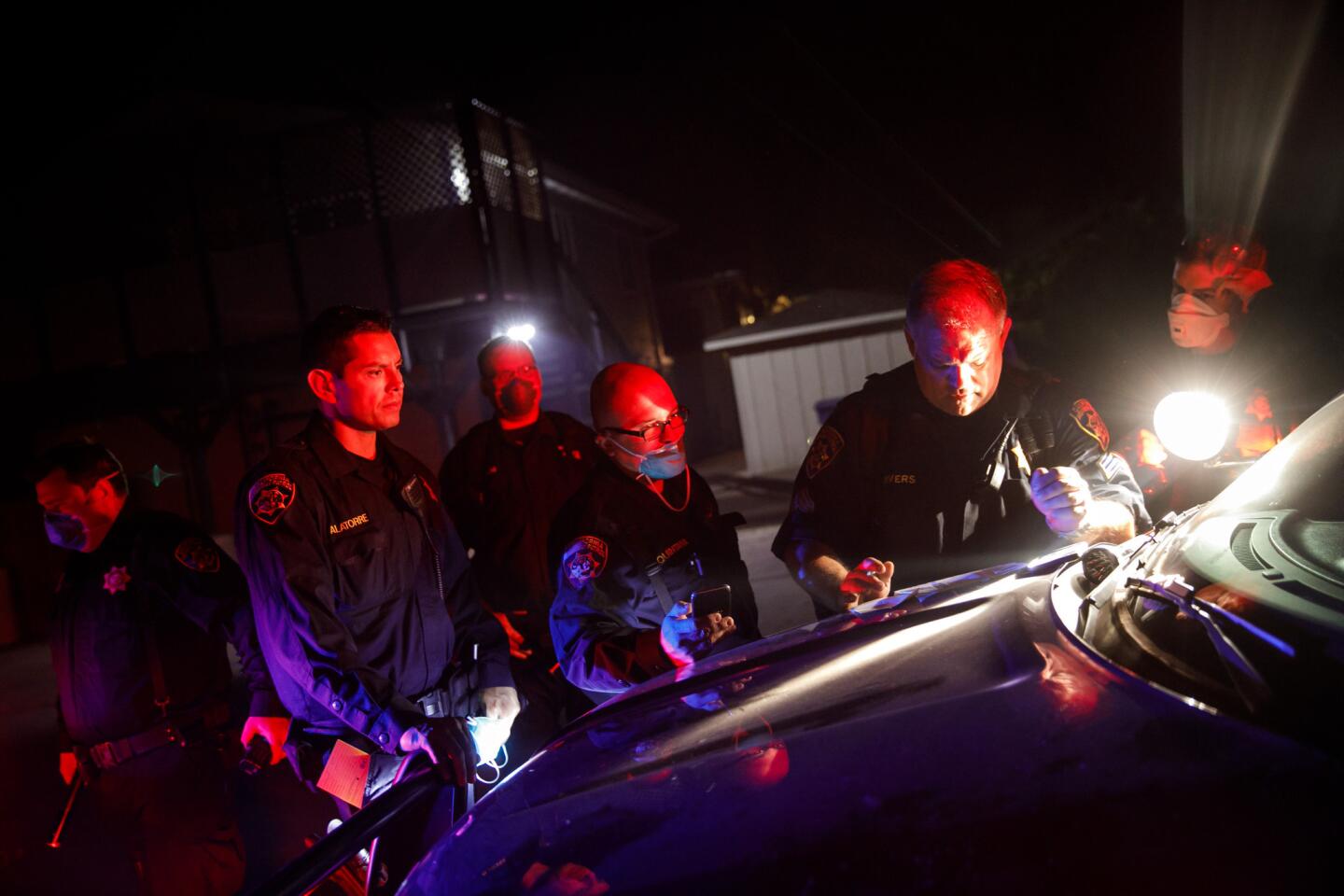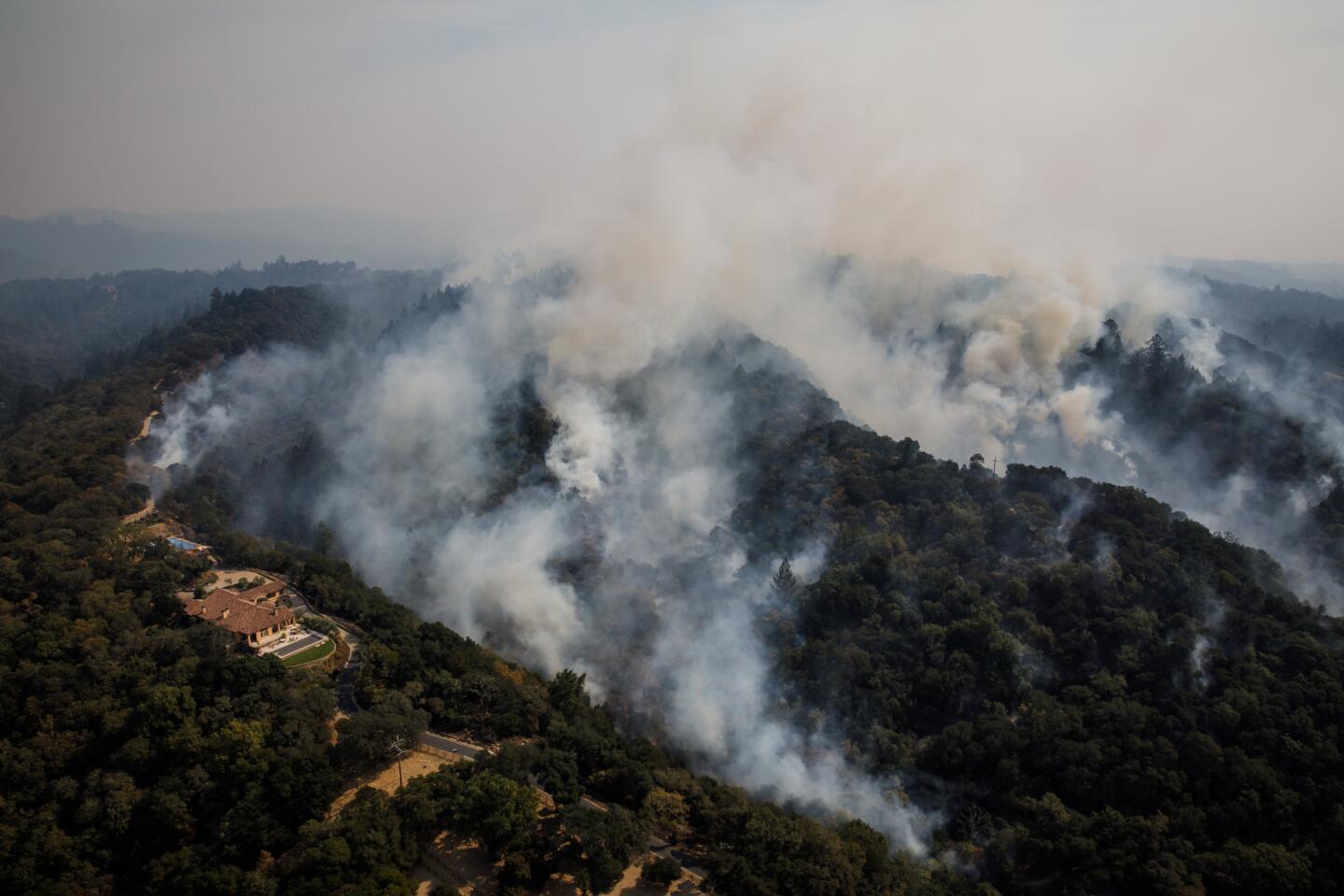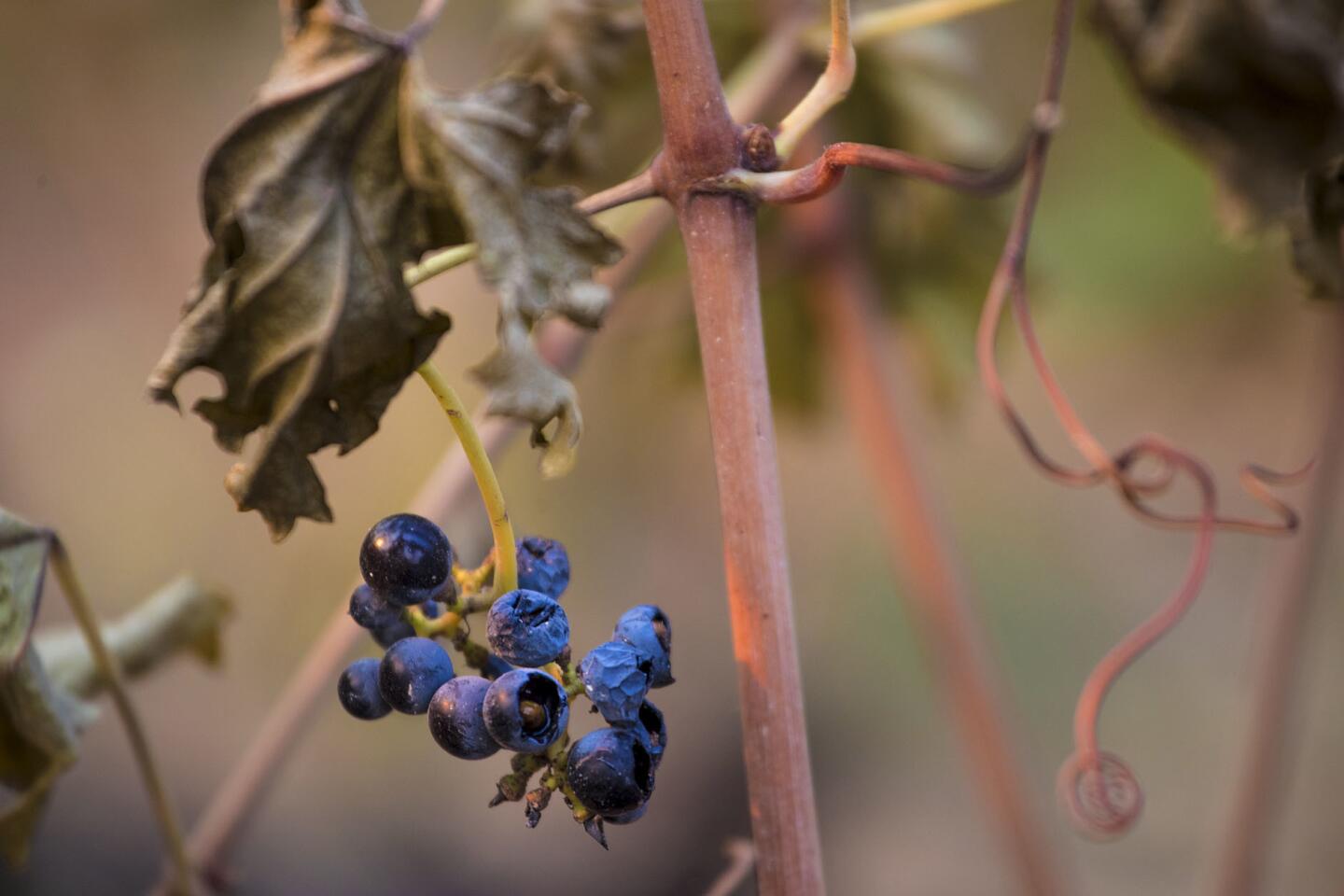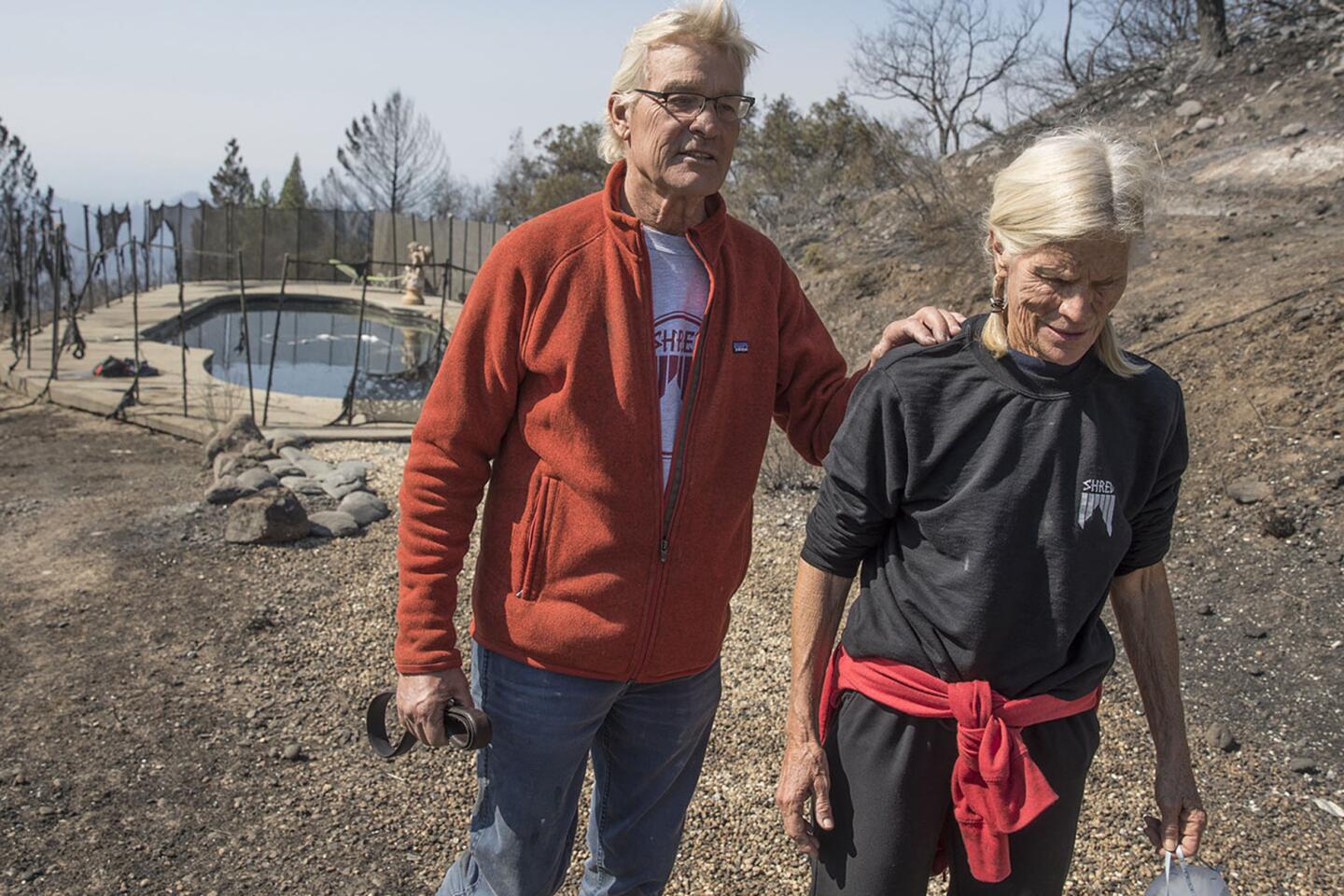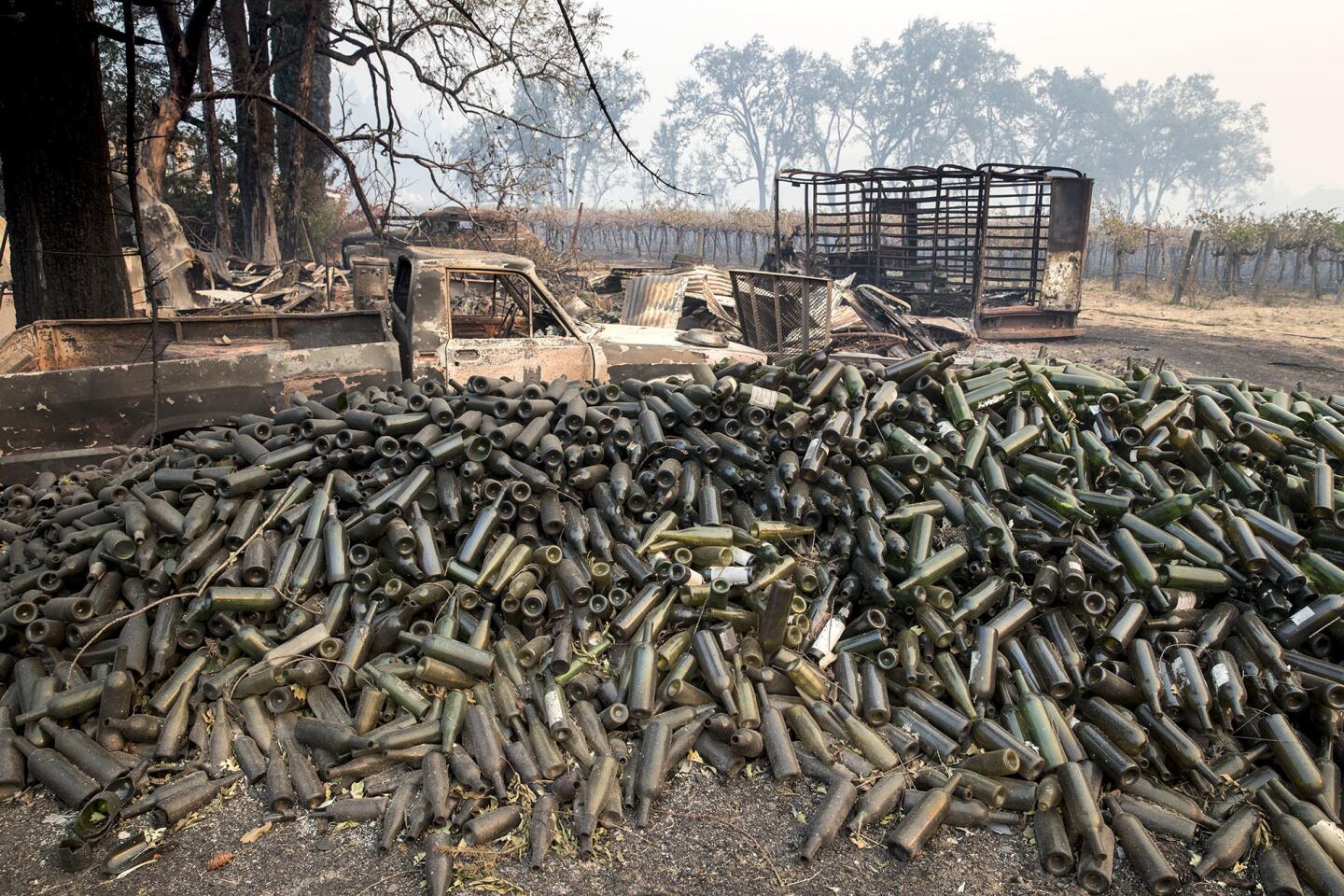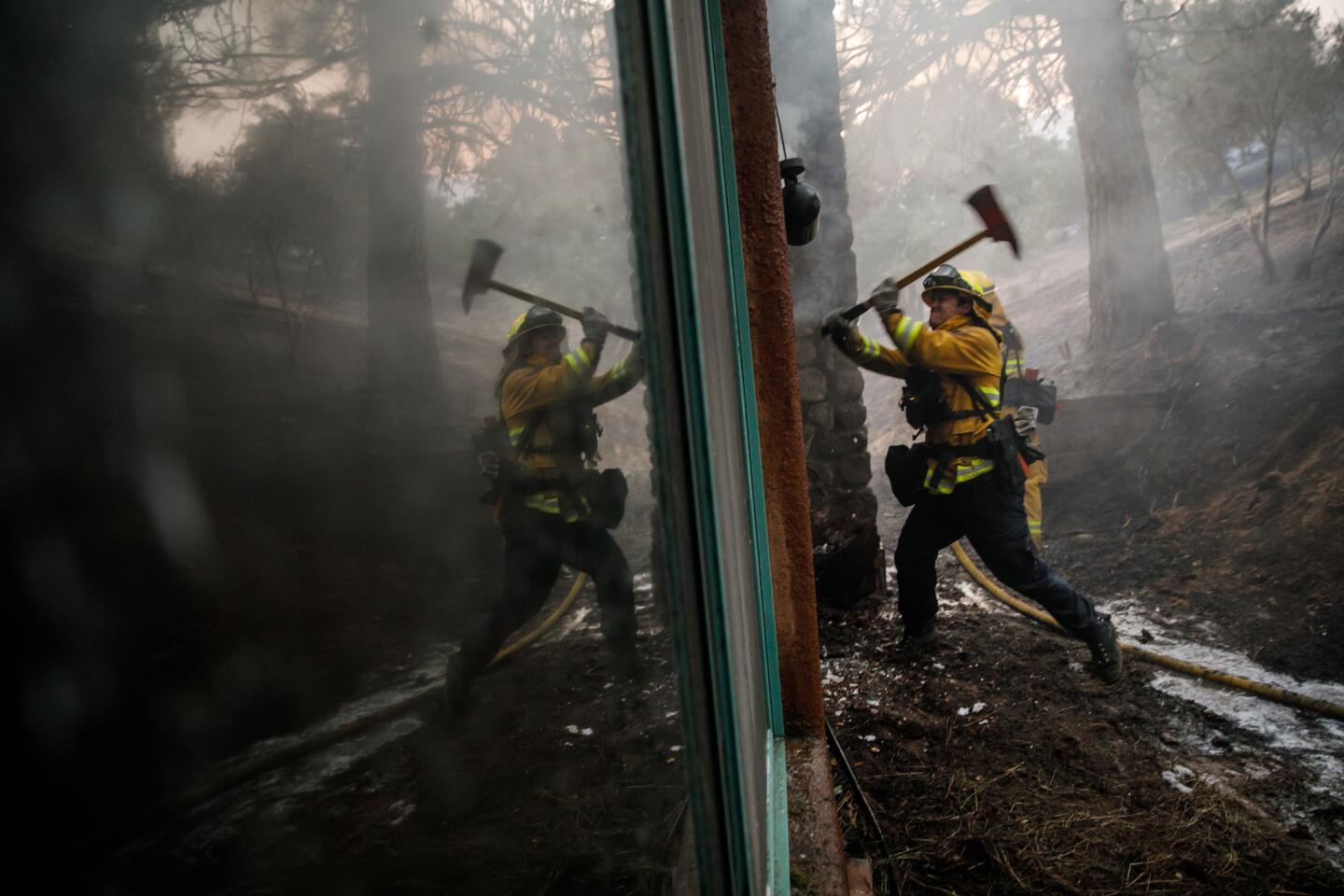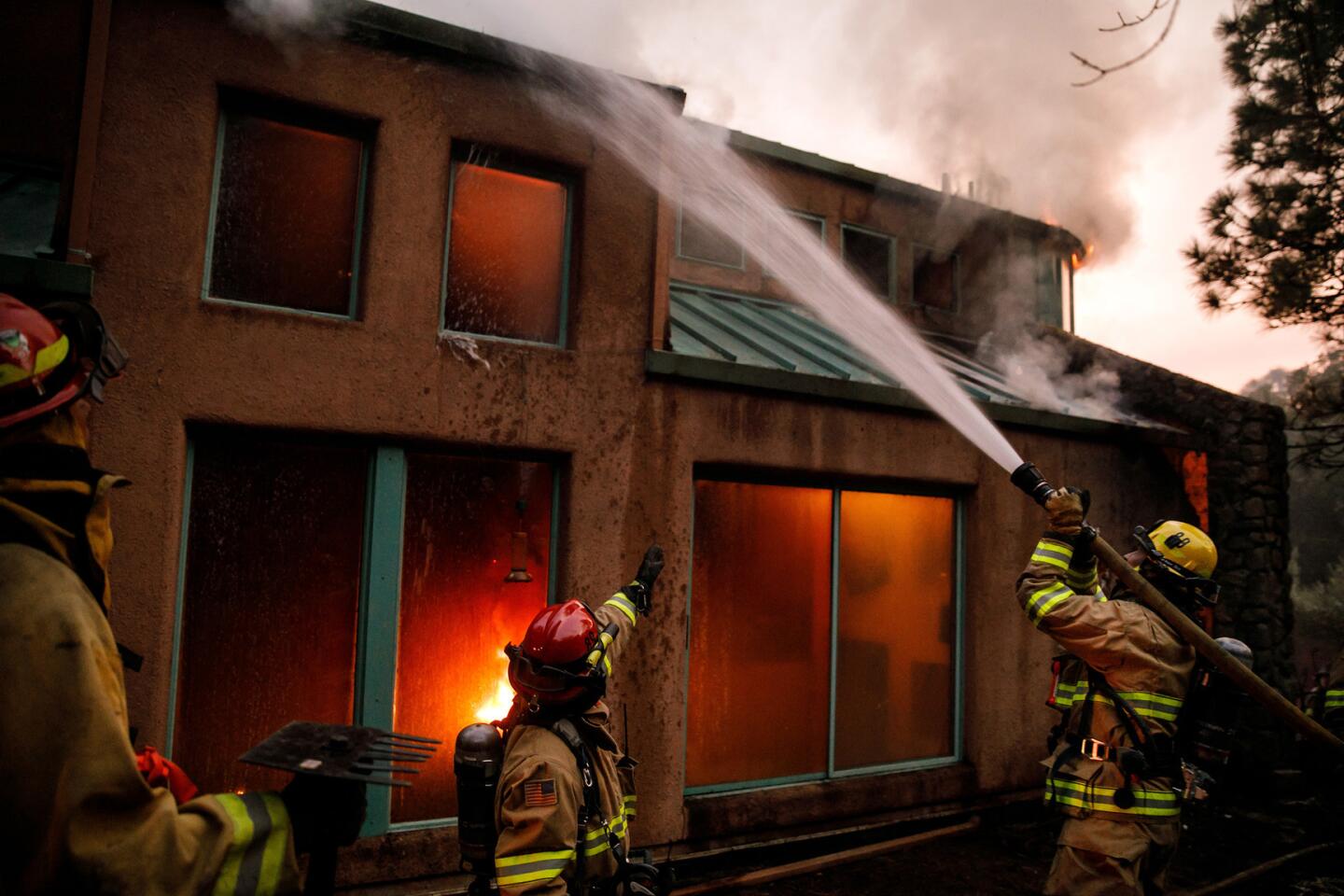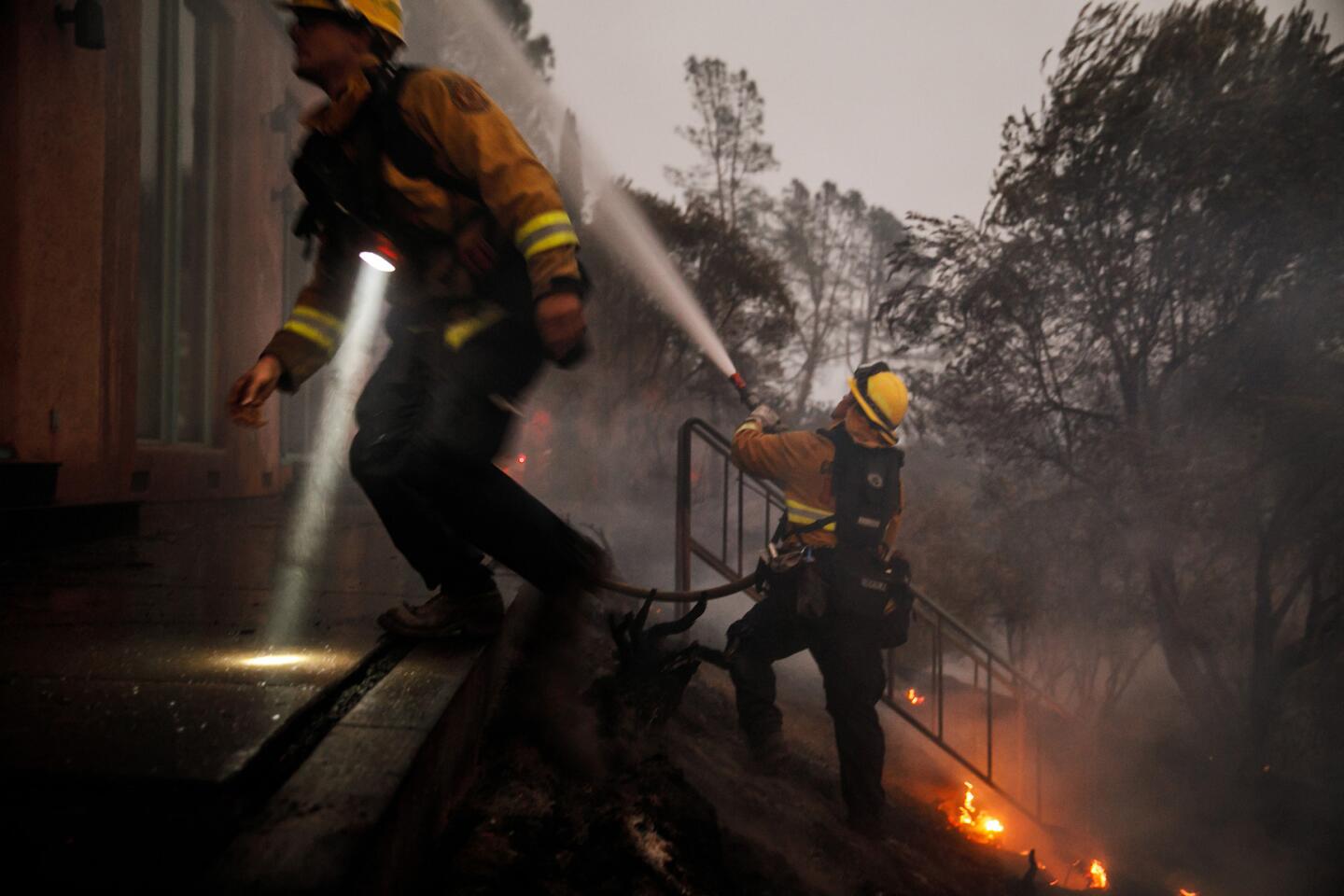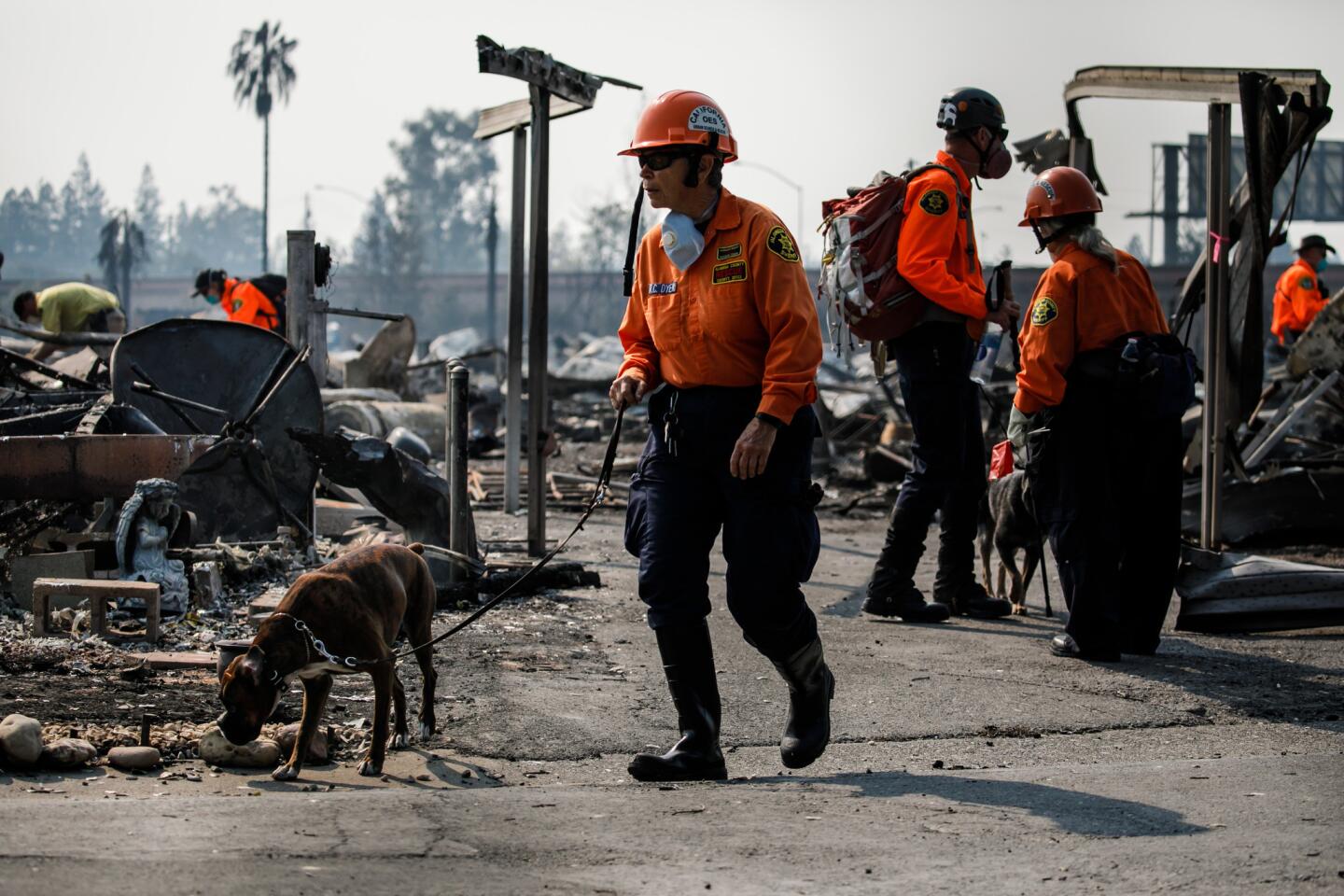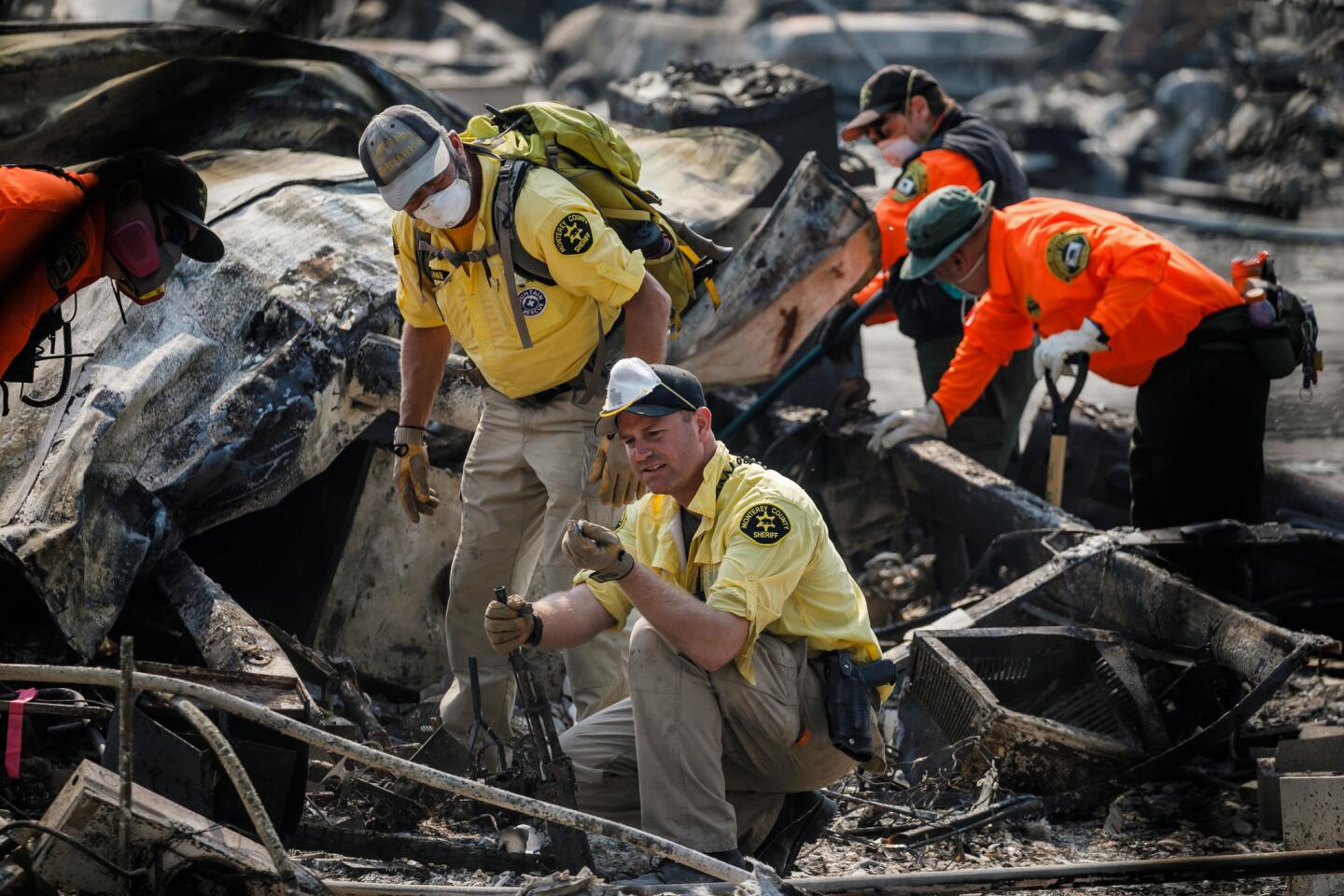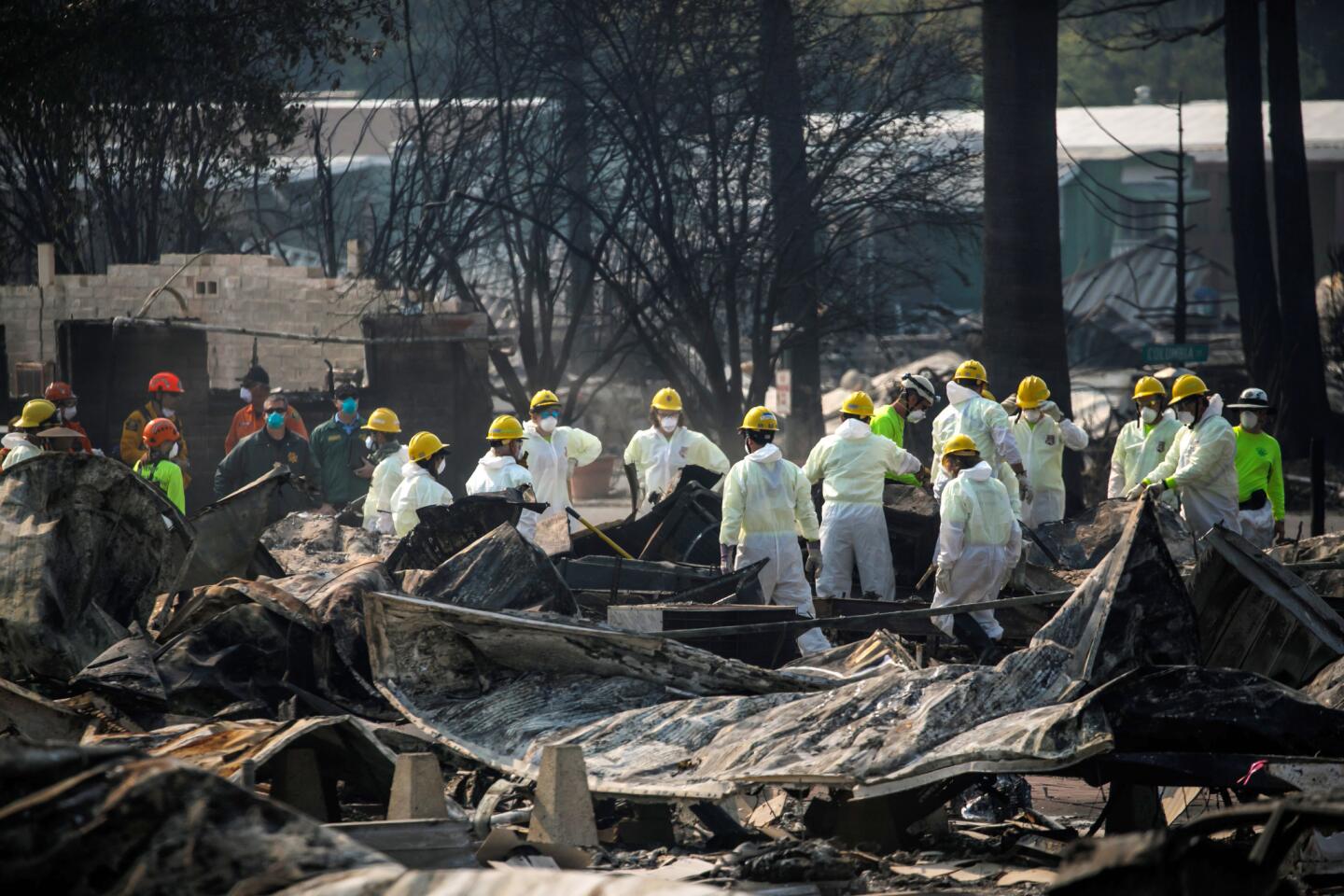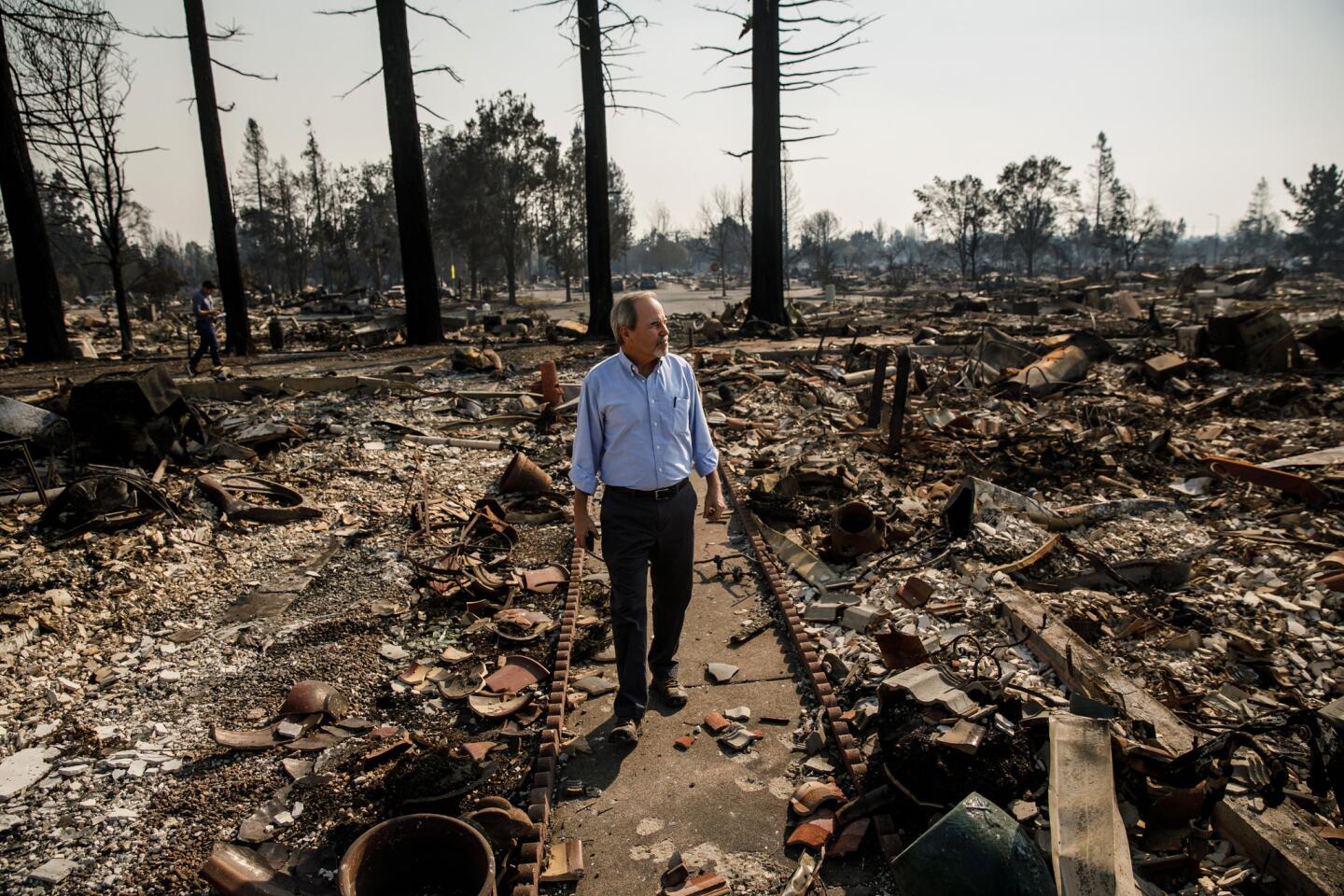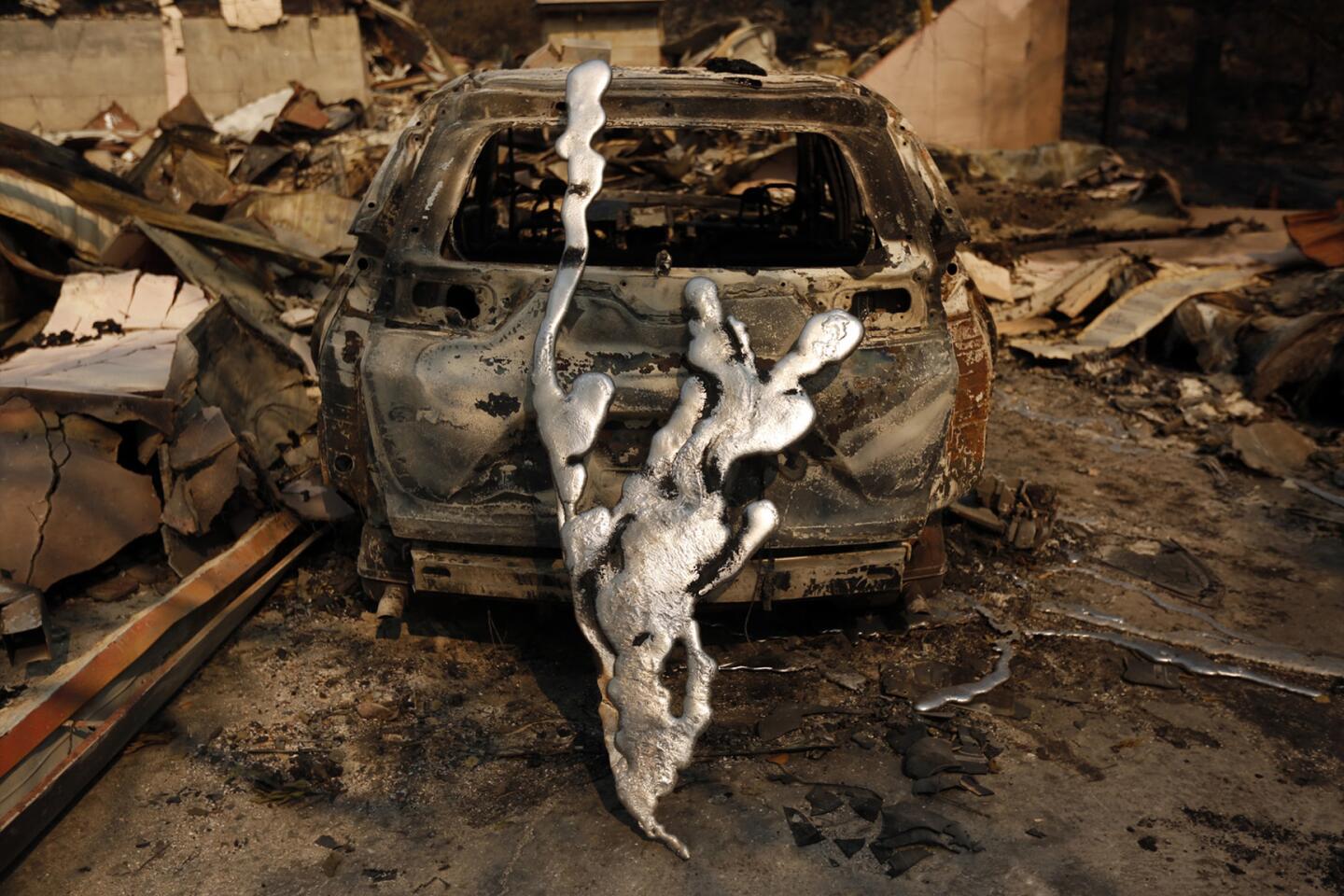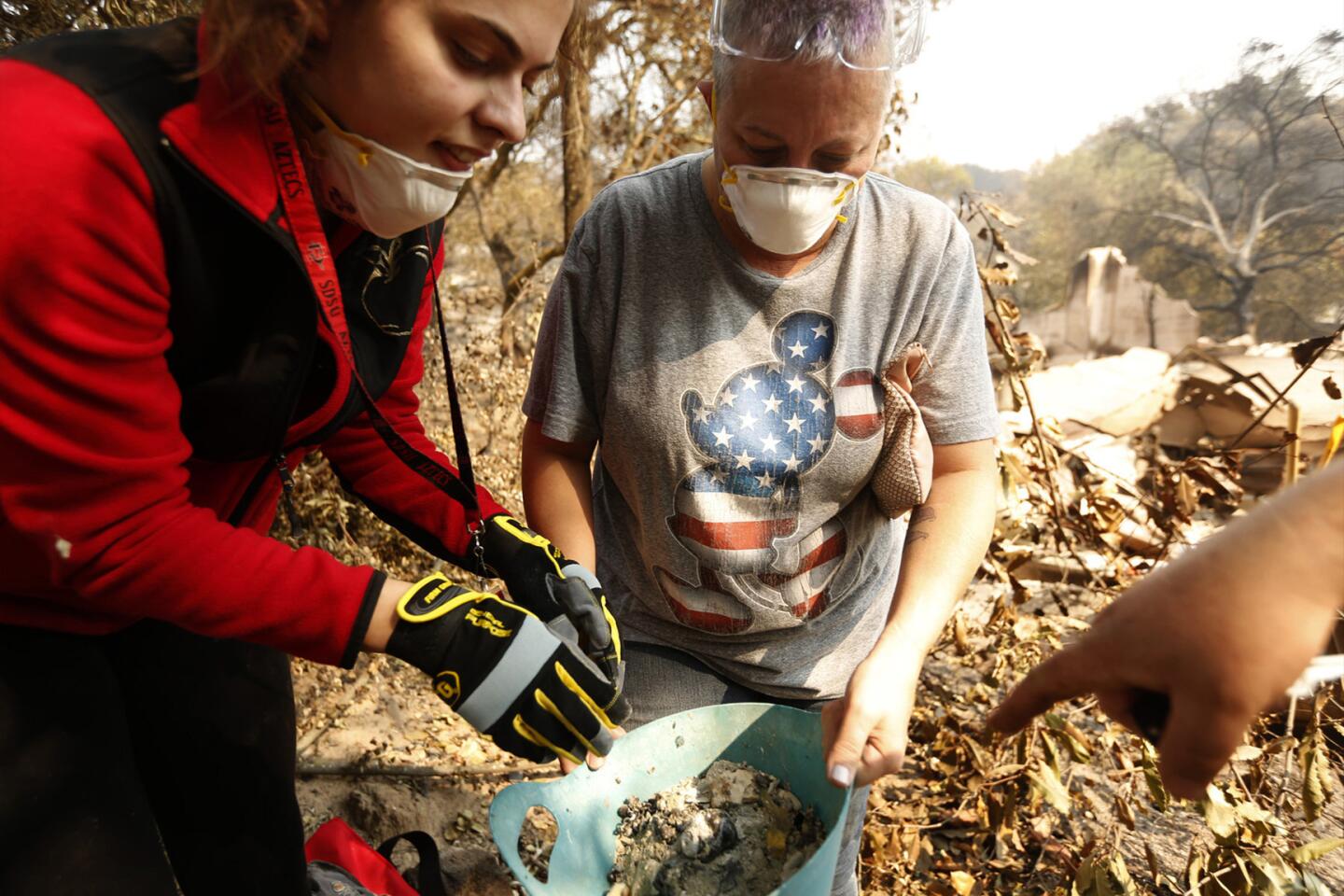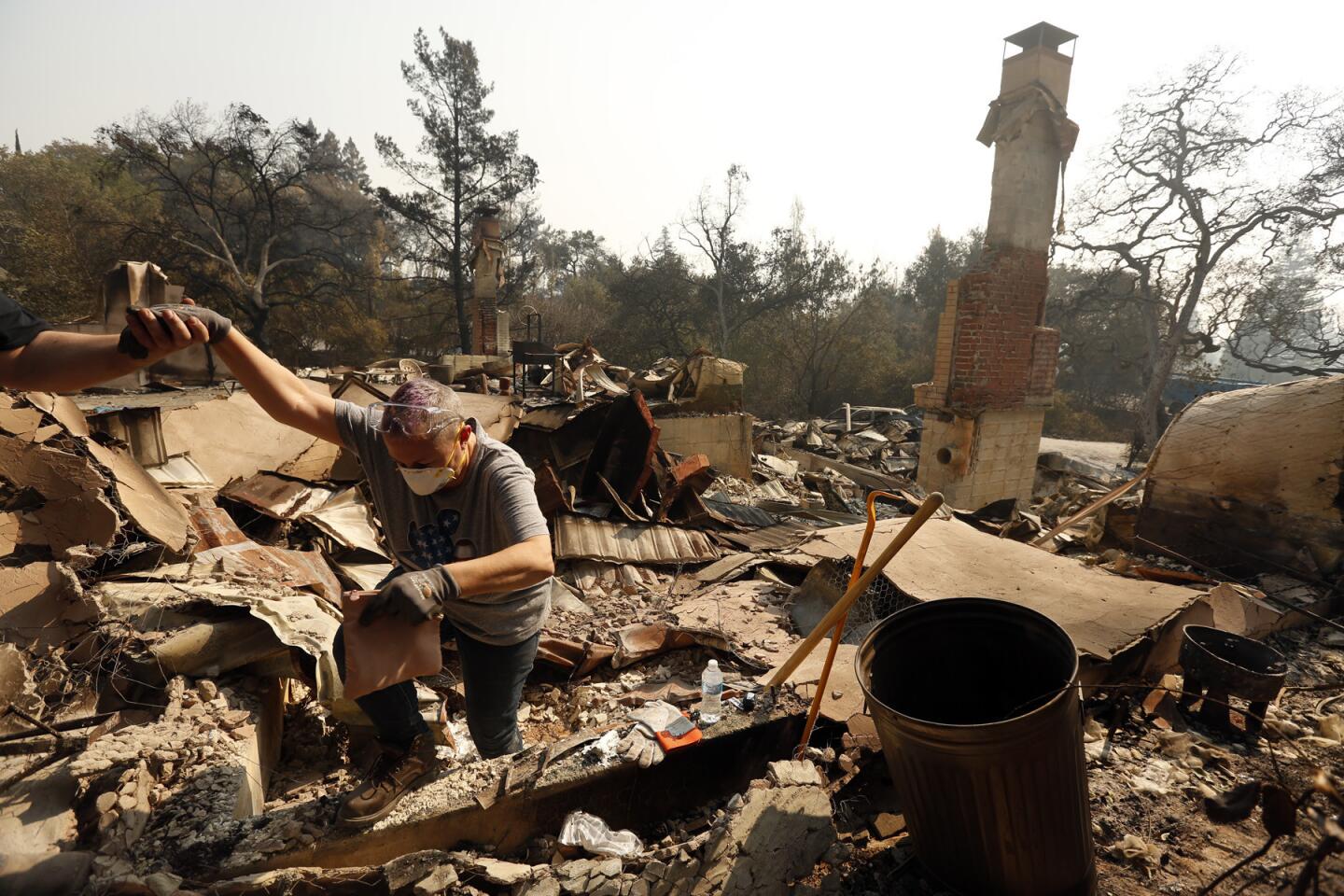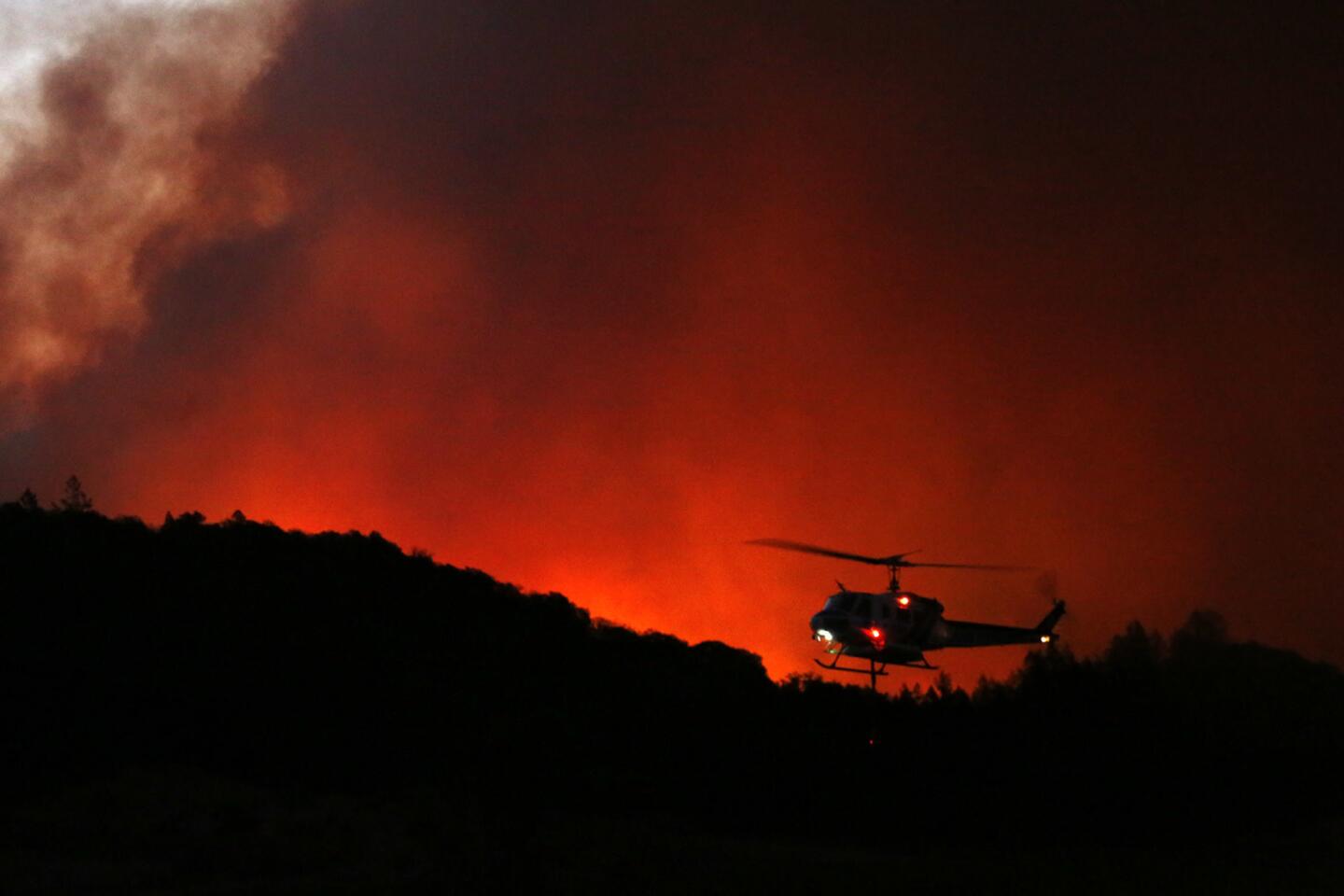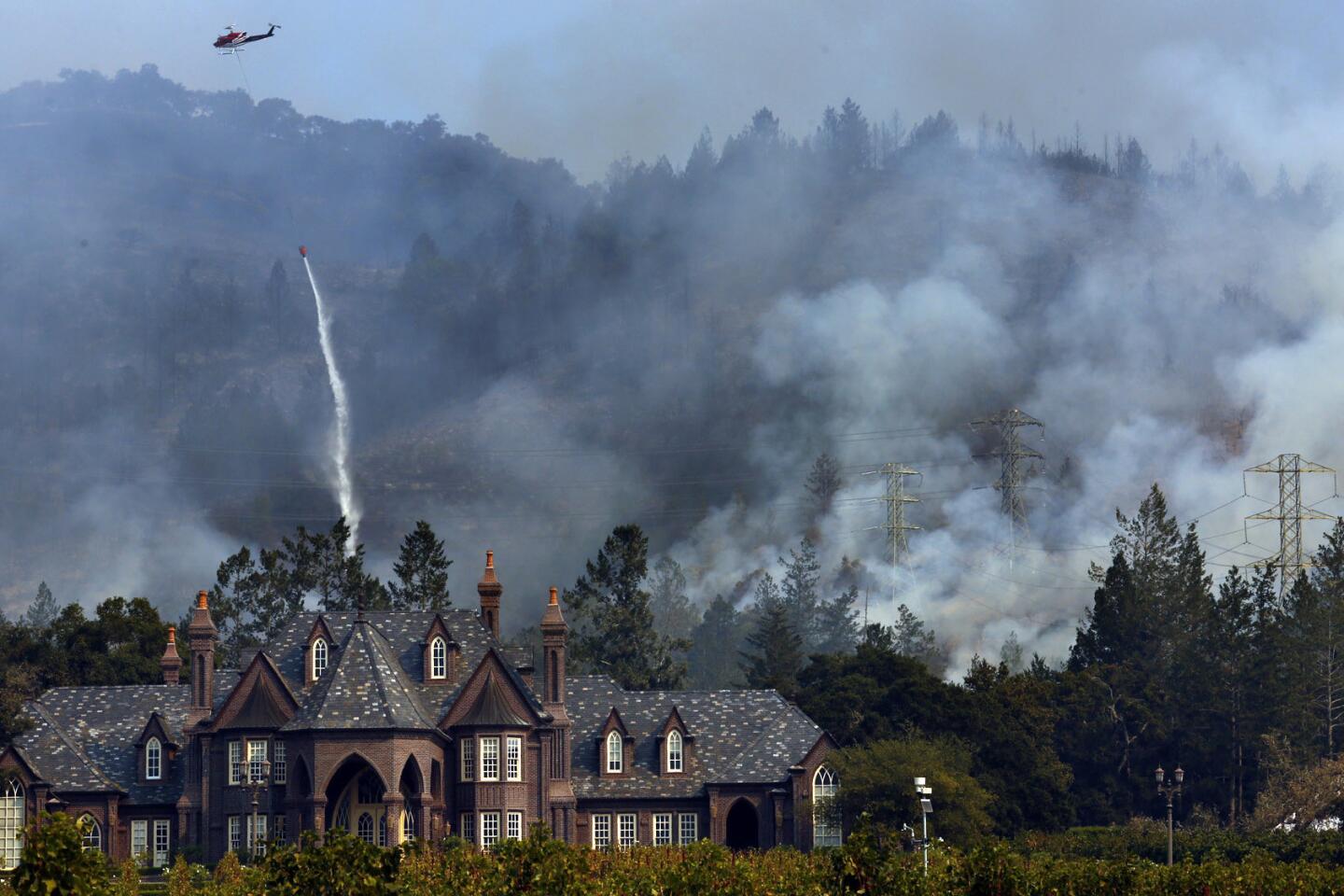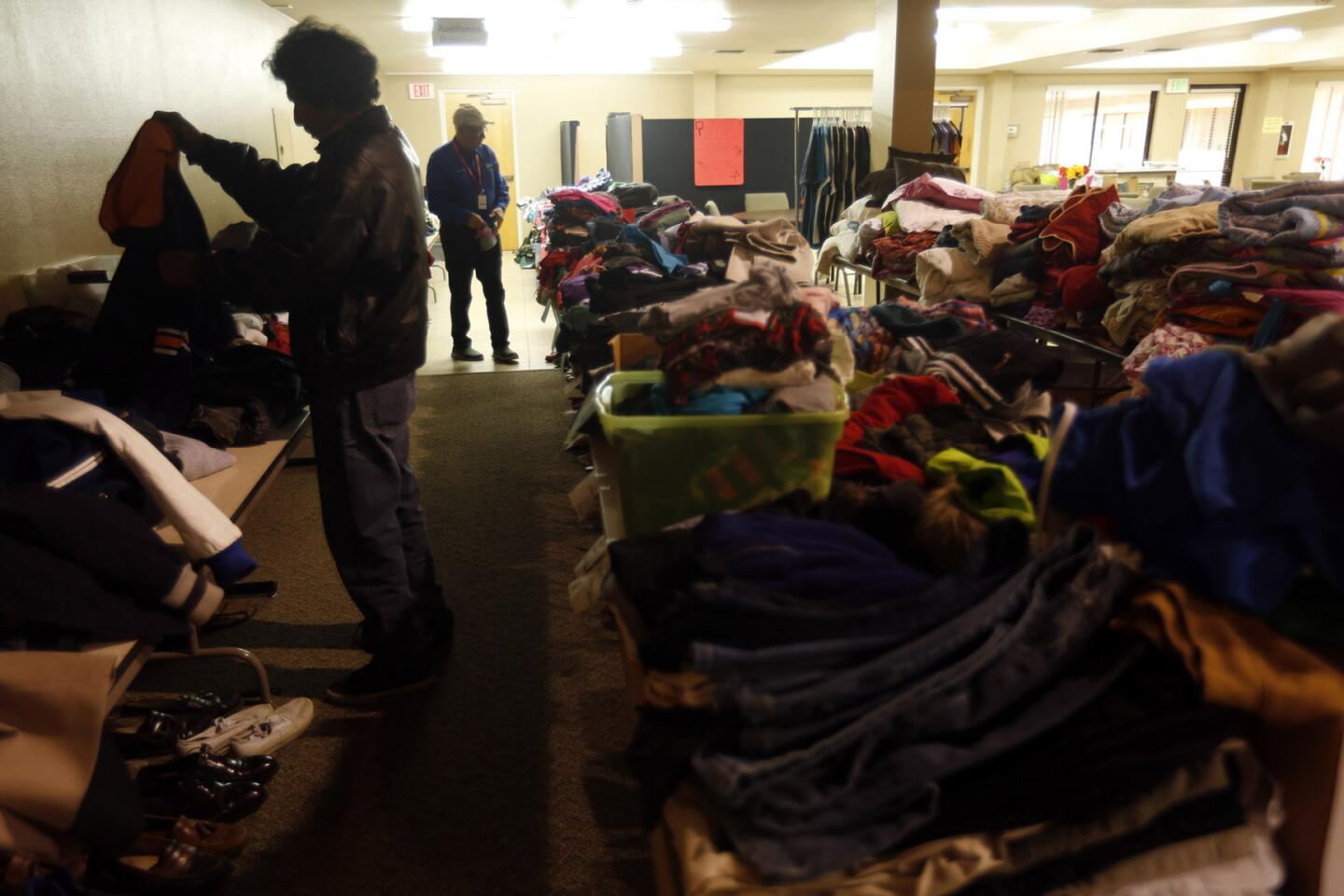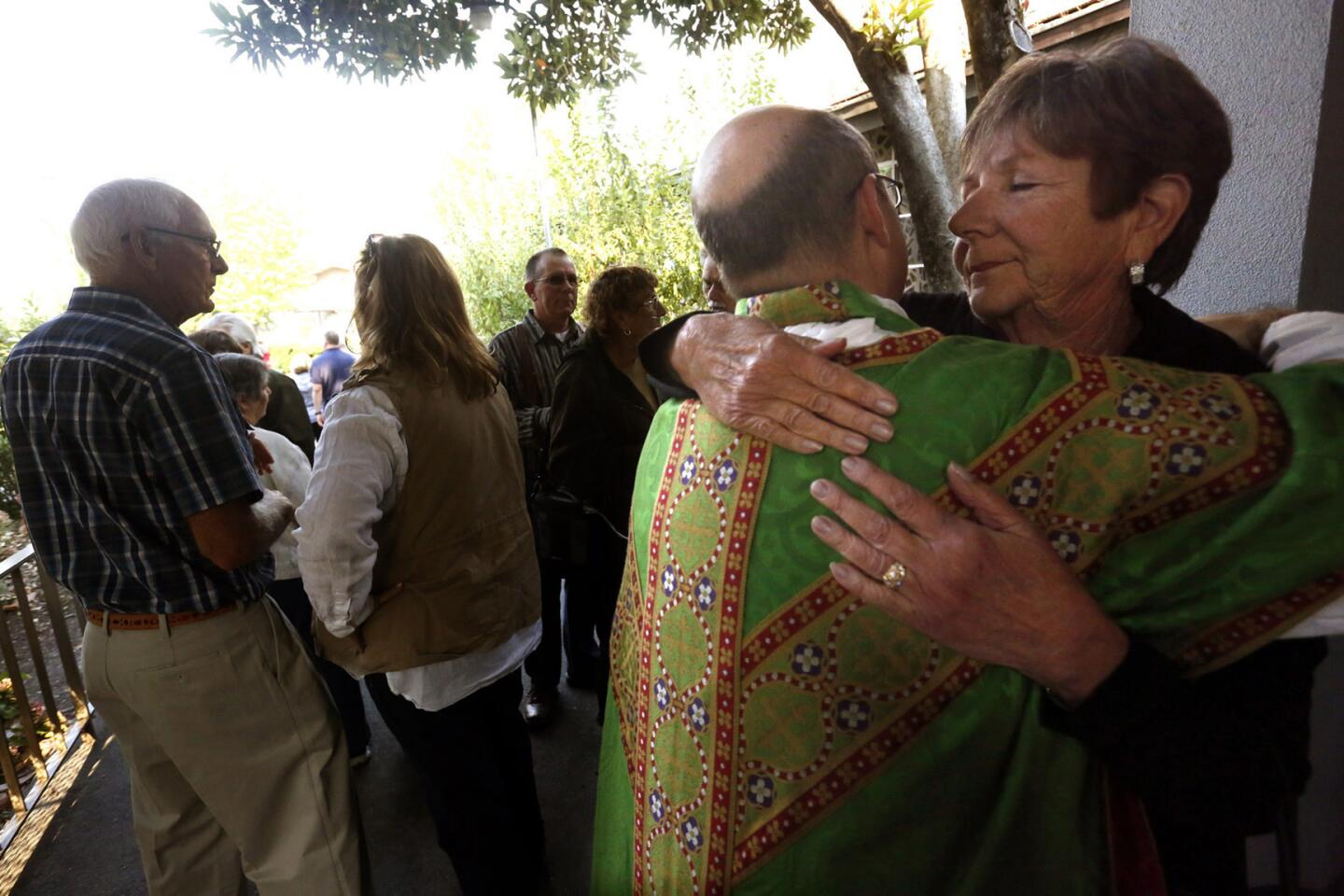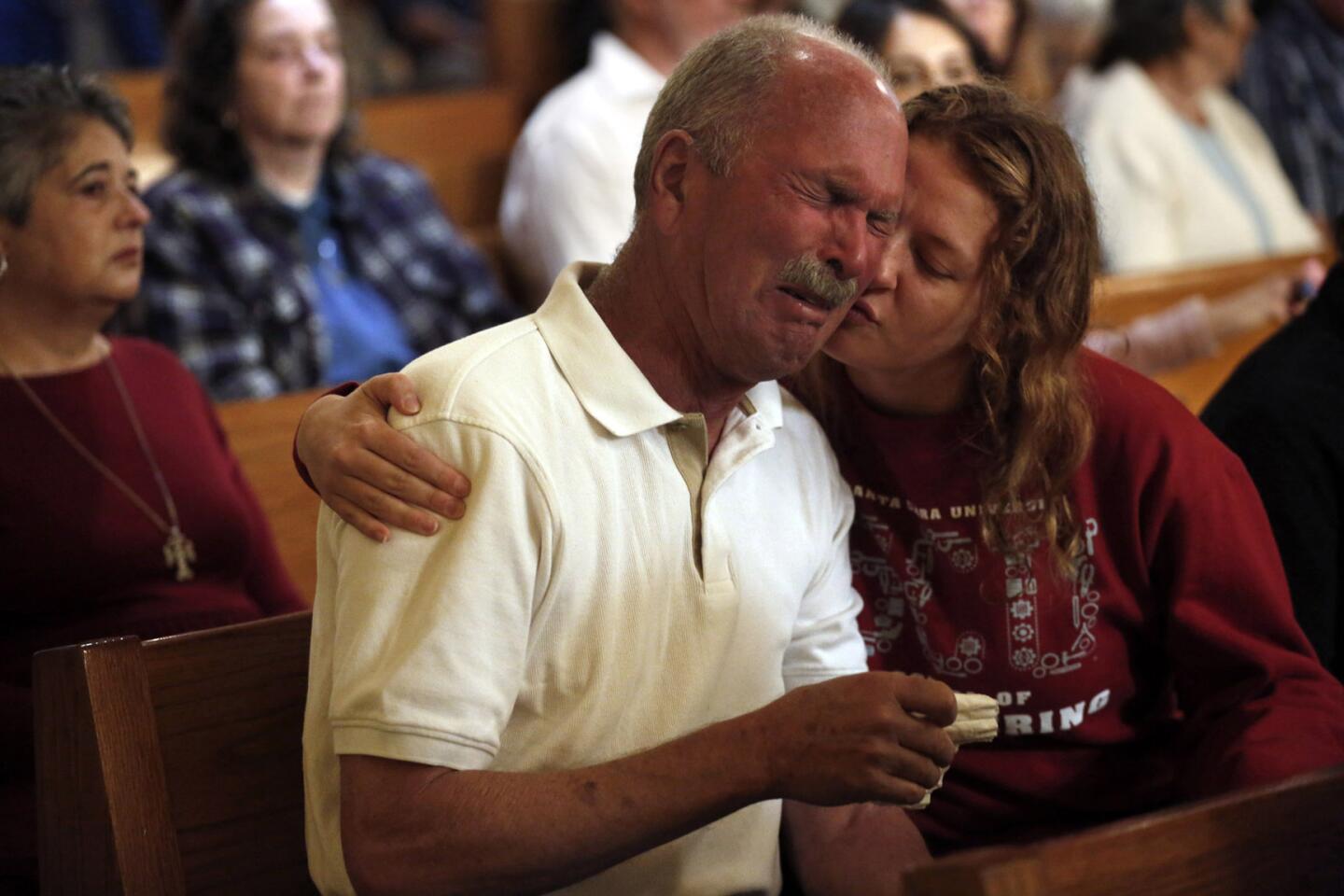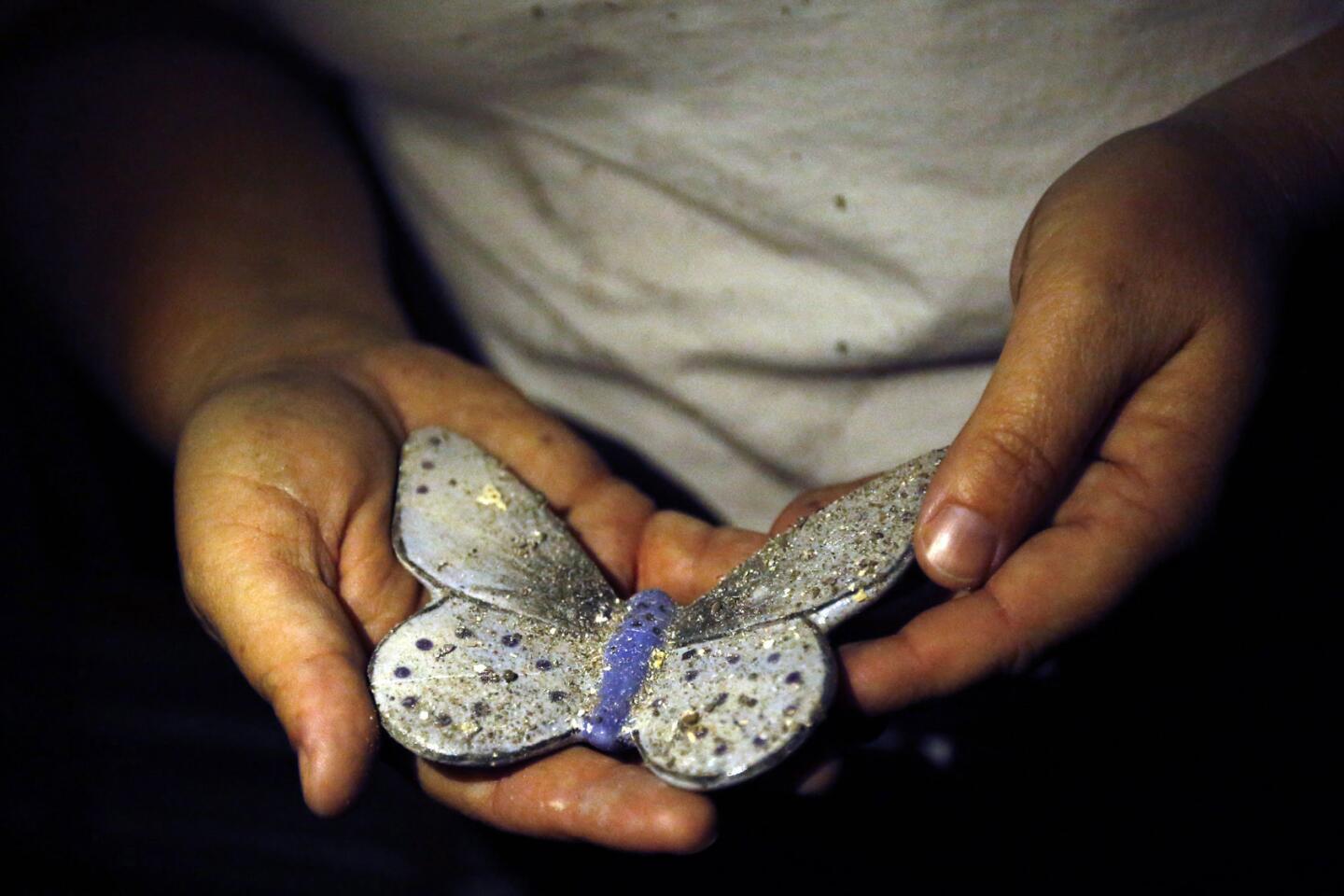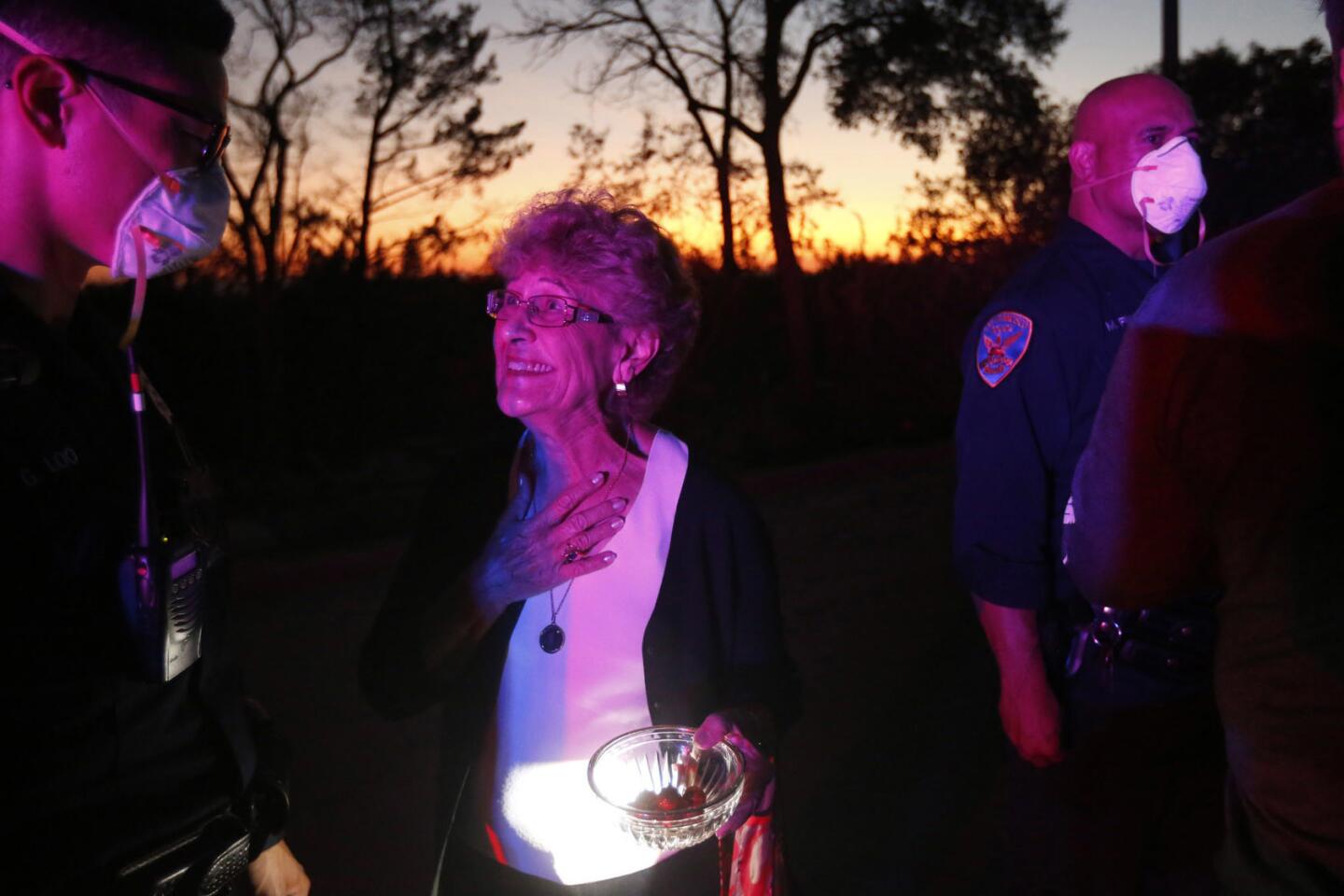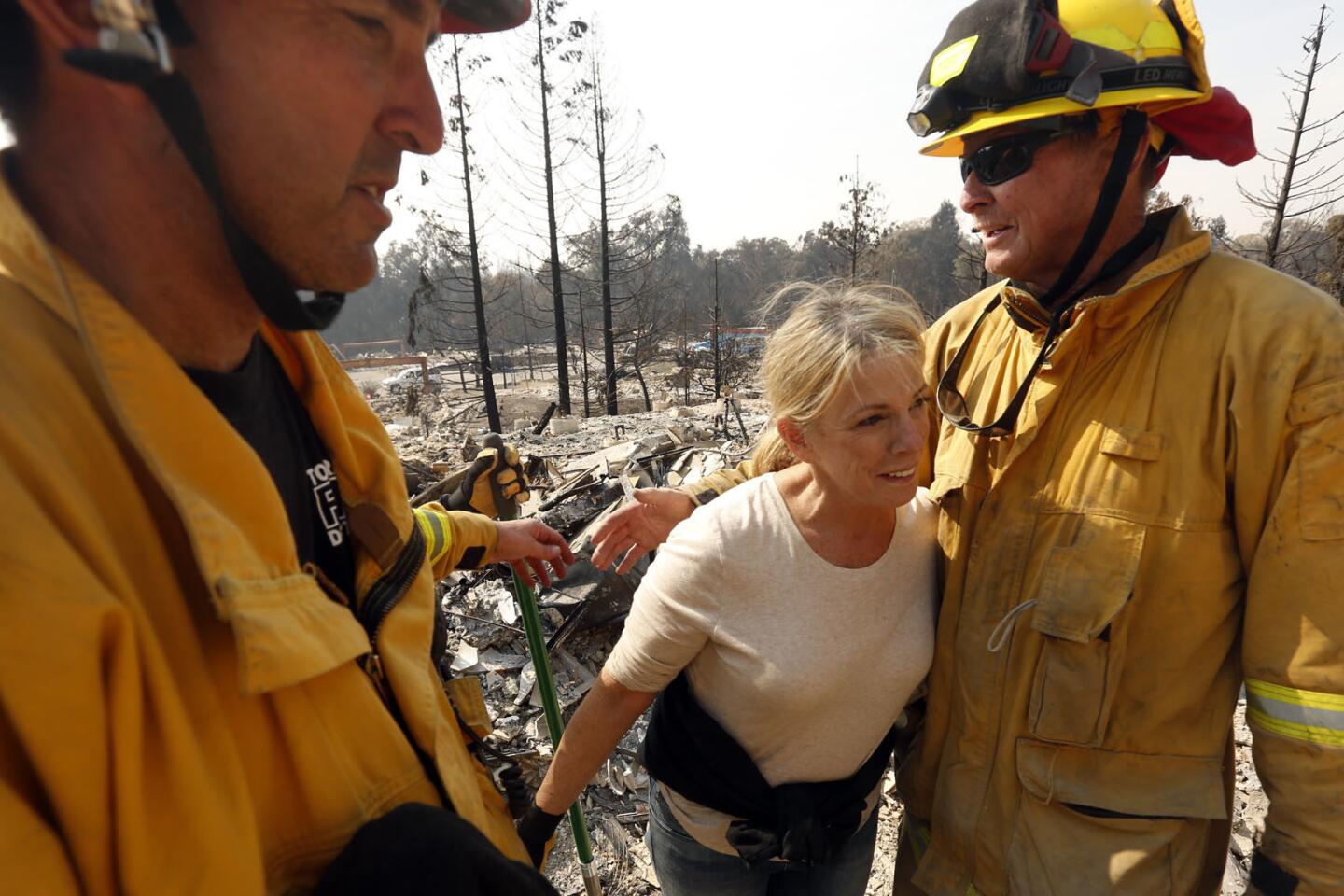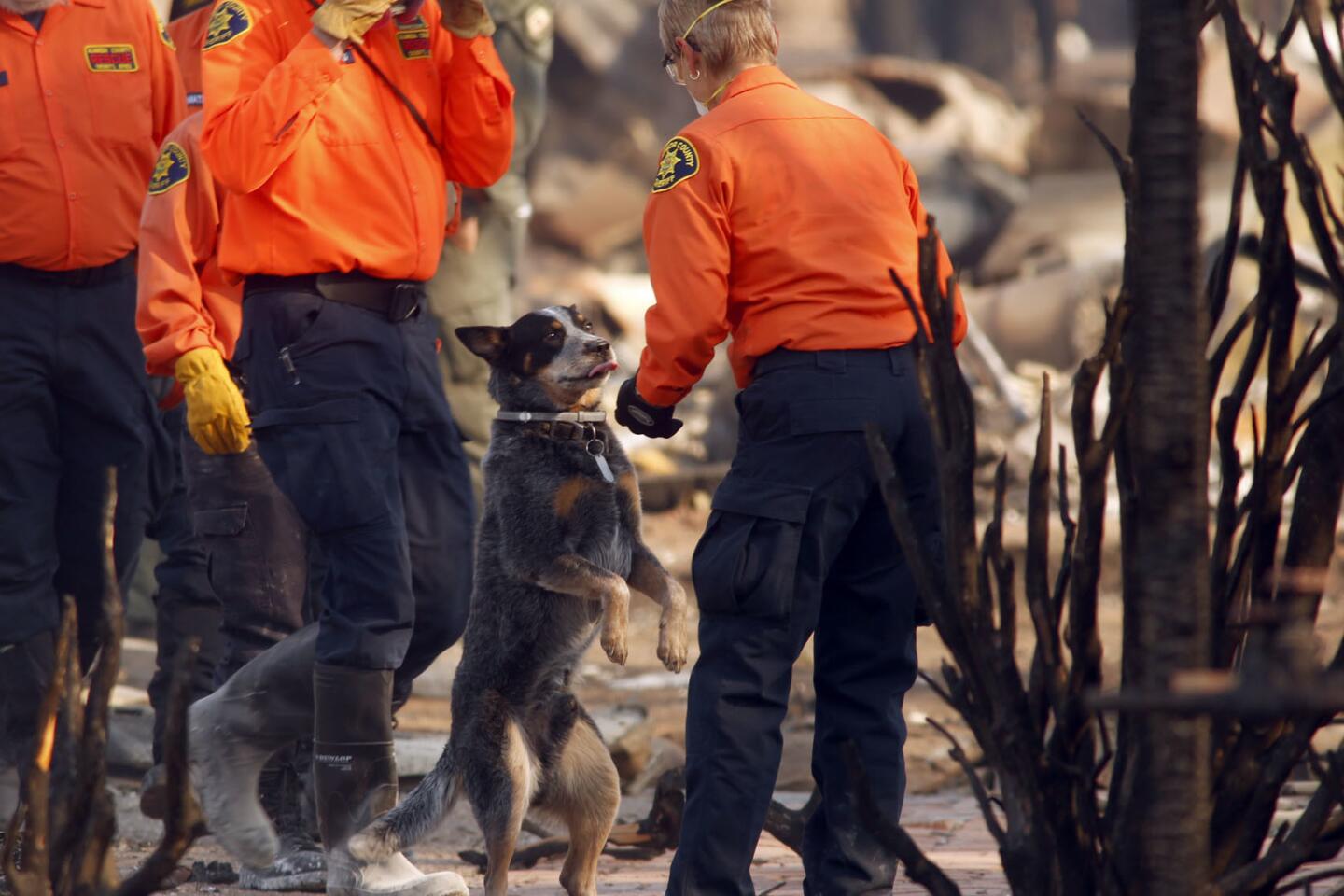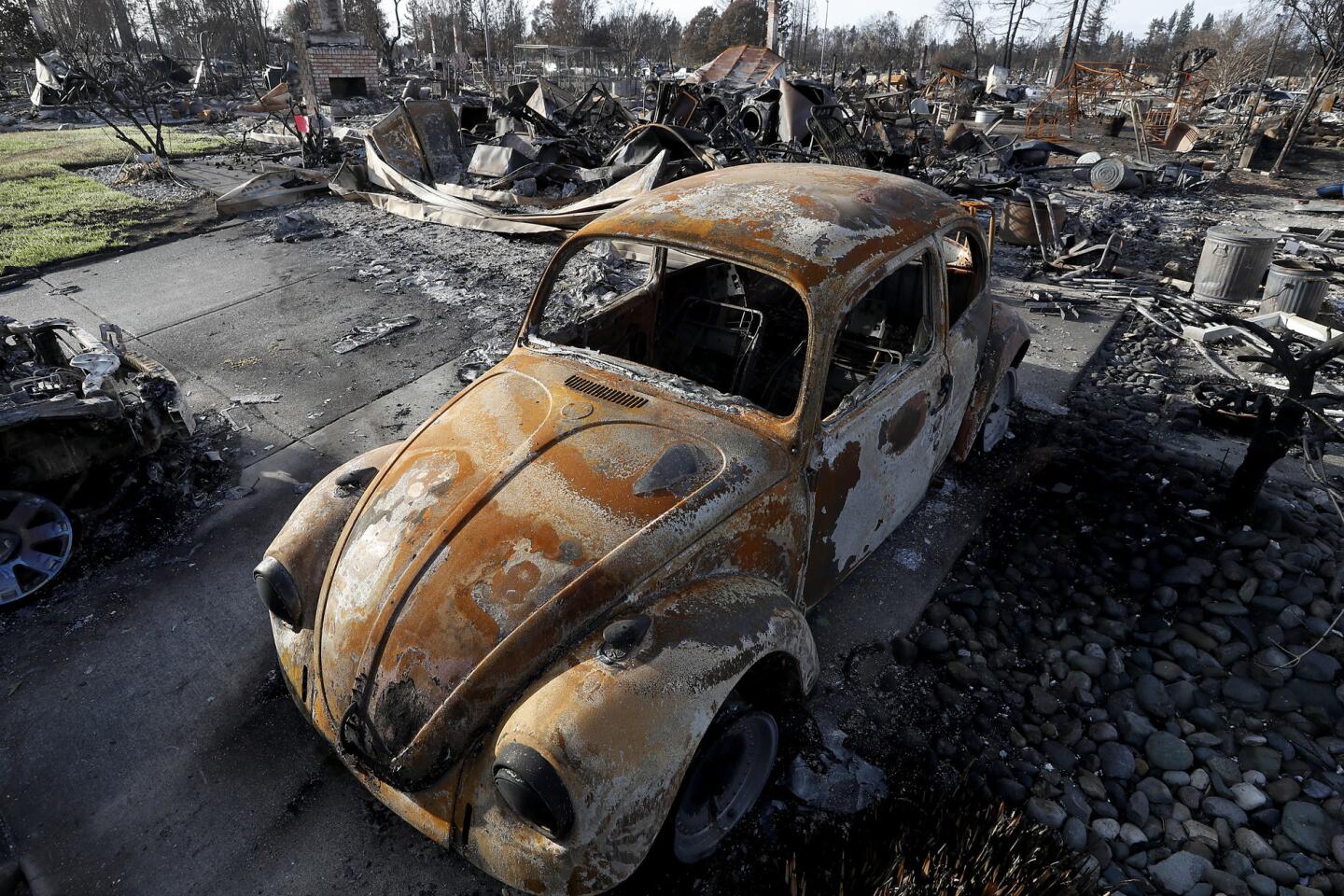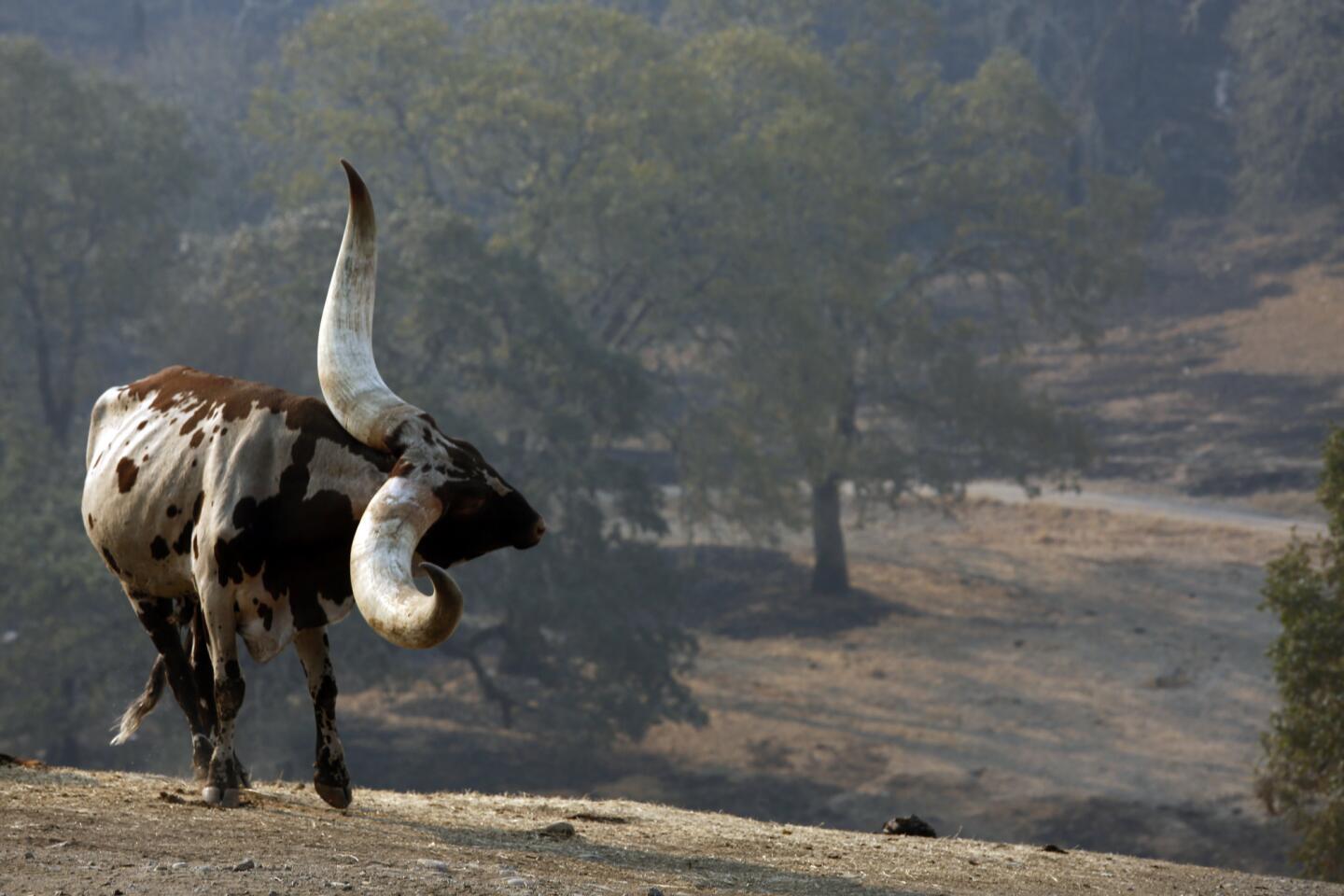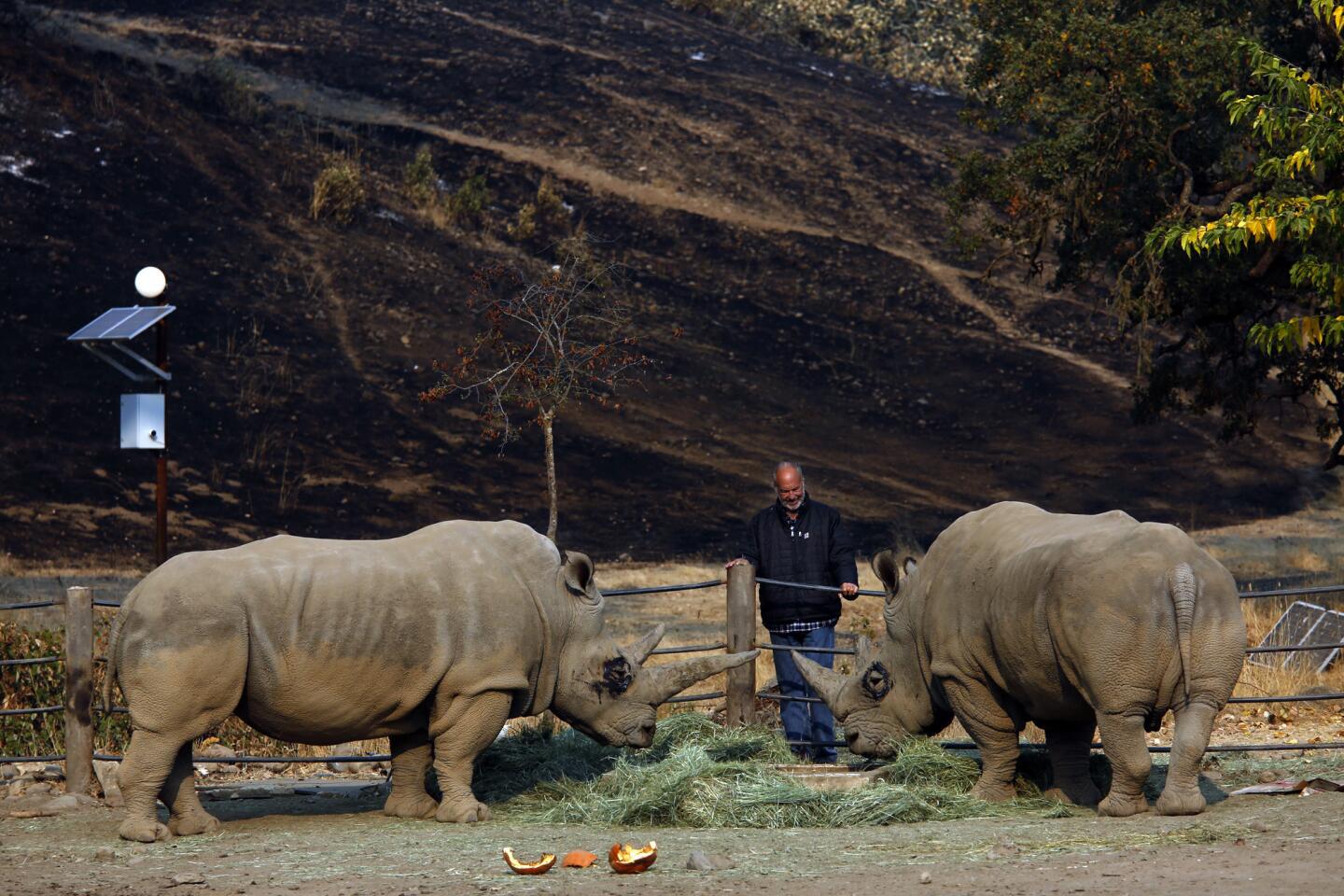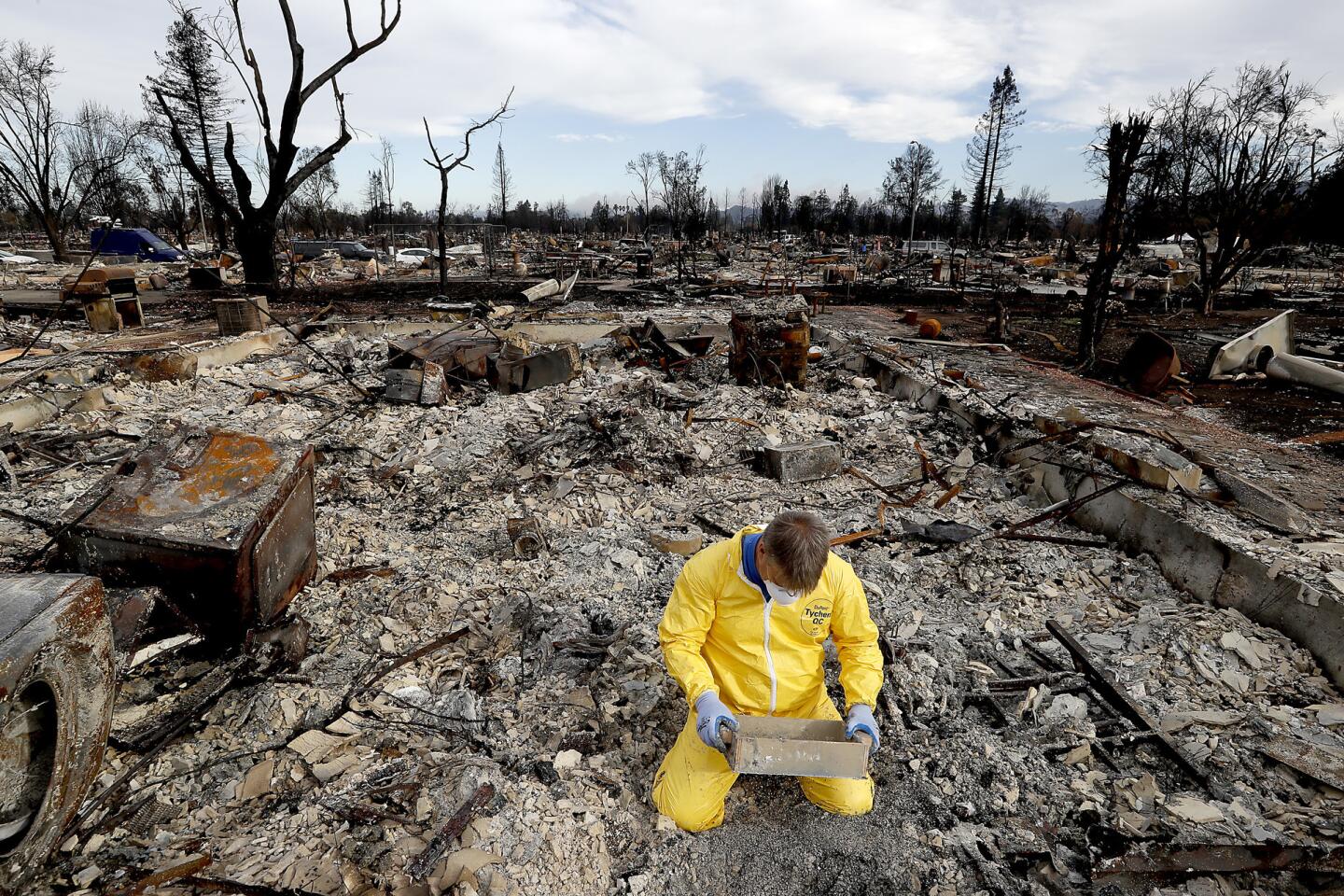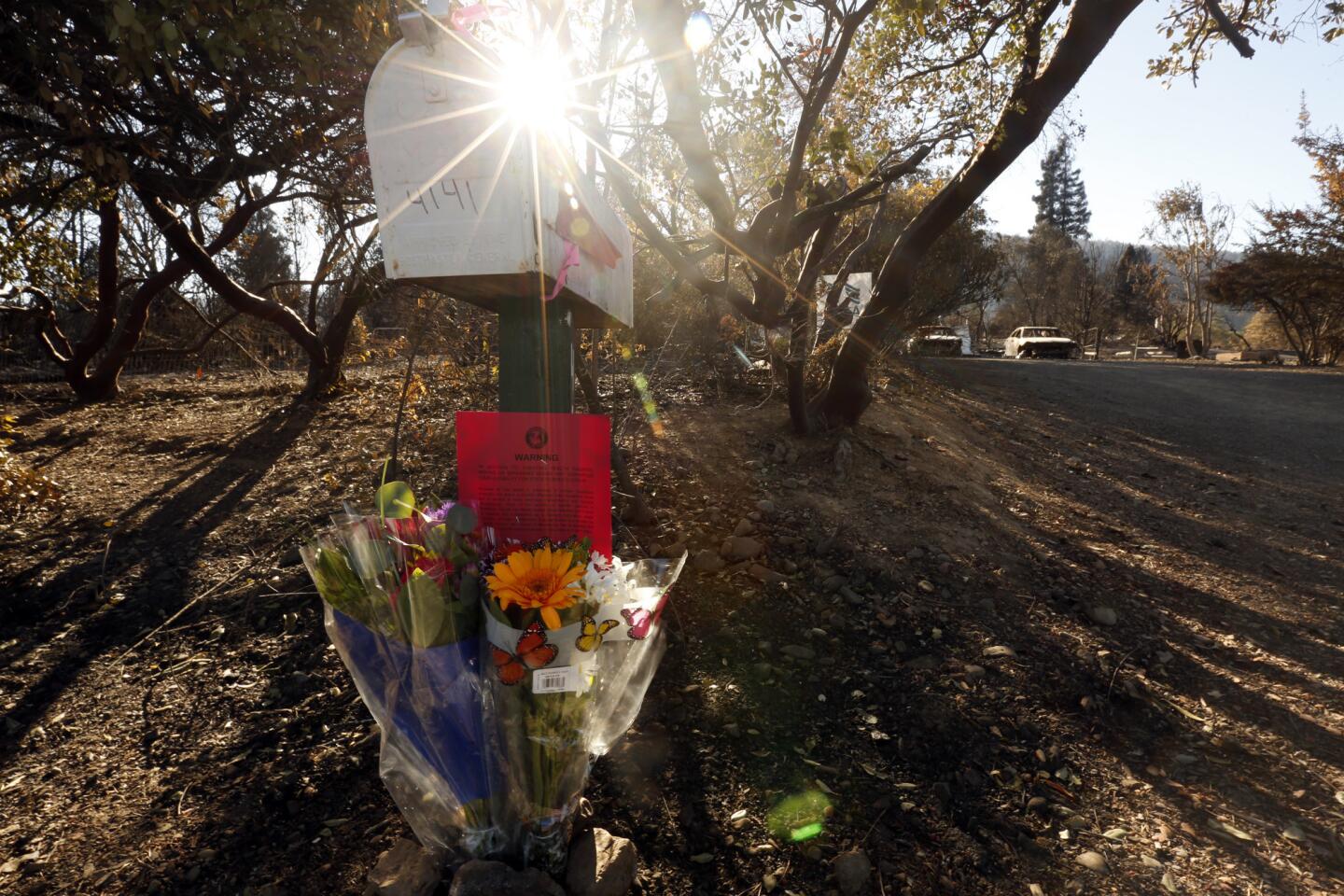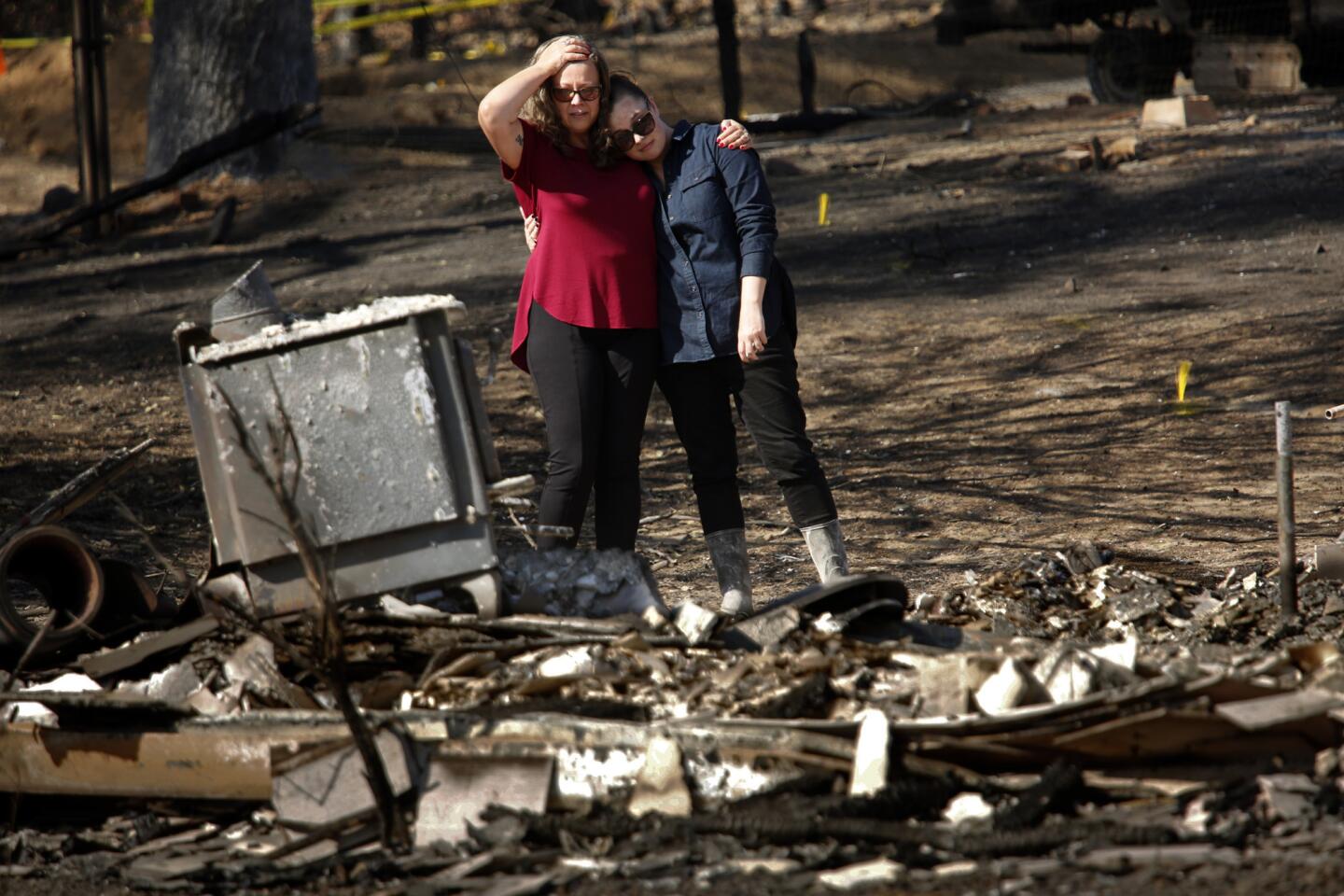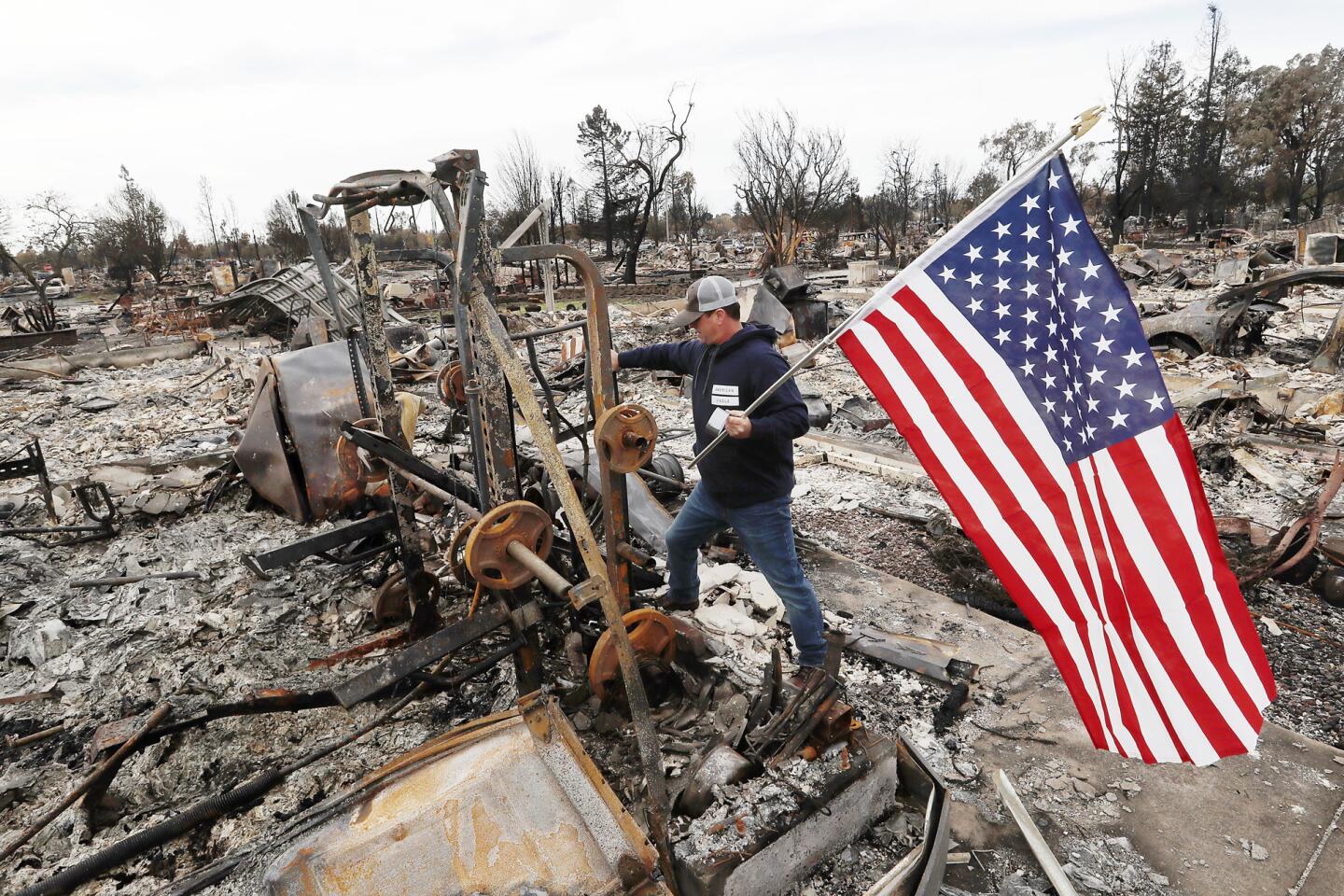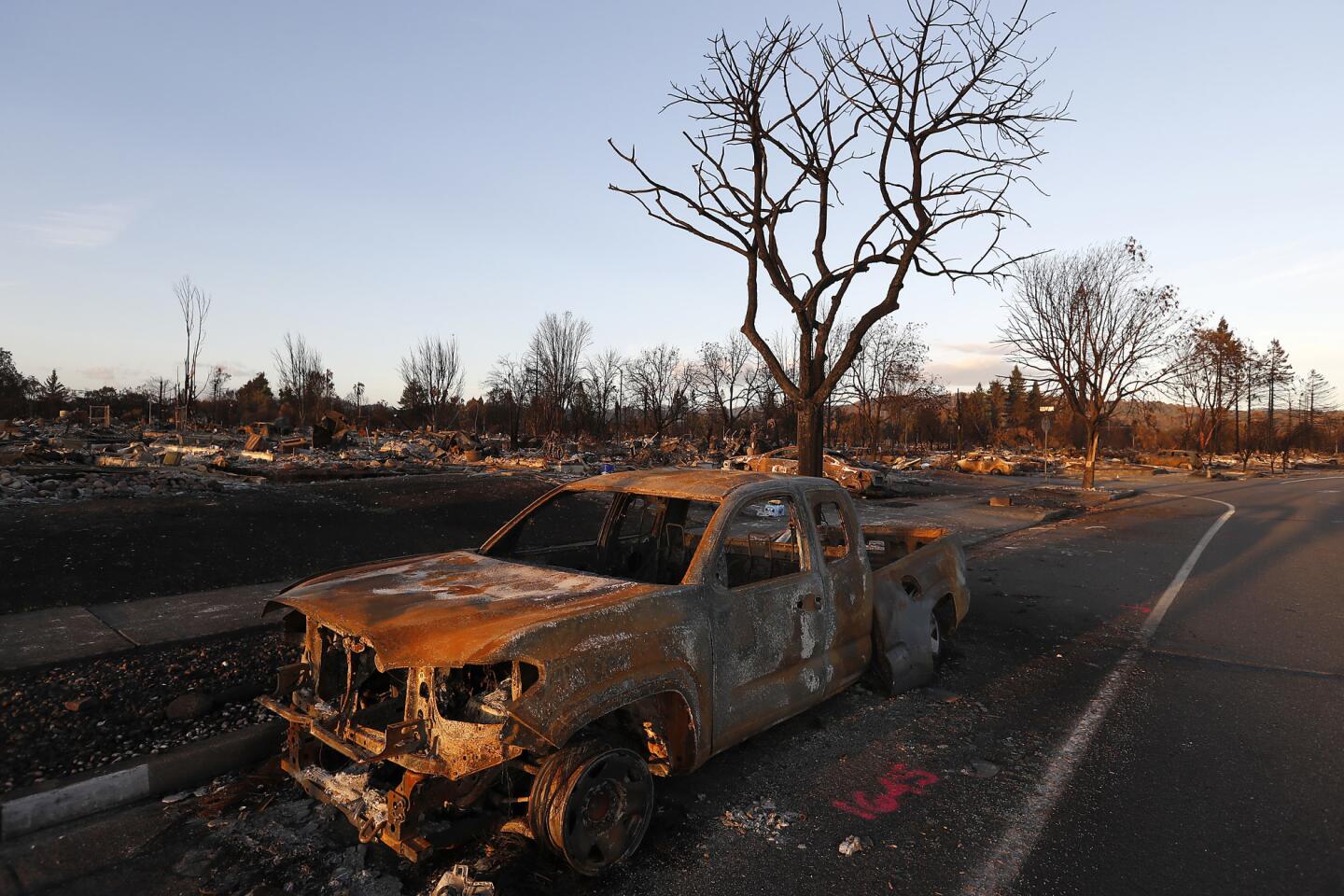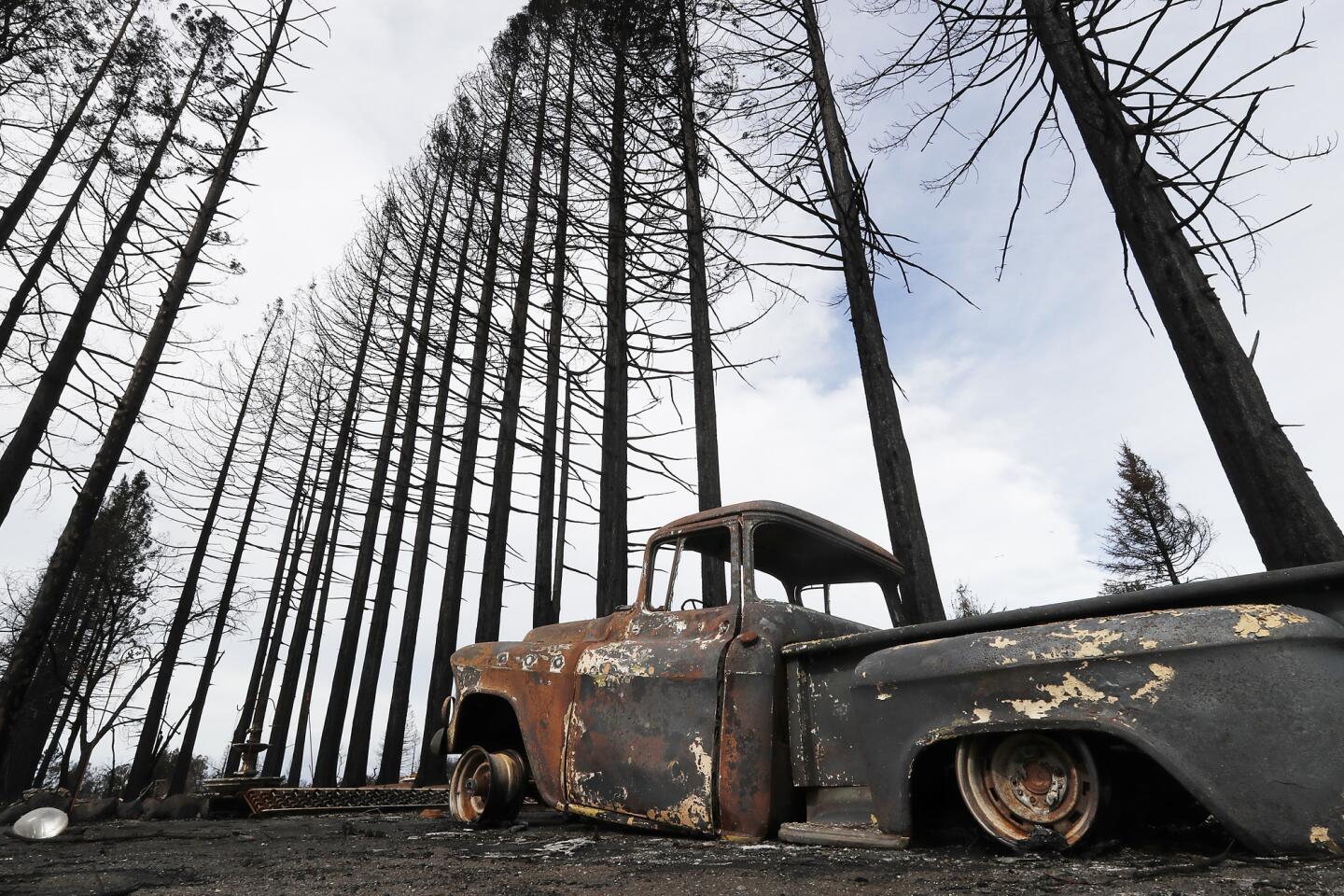Death toll from Northern California fires jumps to 31; names of 10 victims released

Over 160,000 acres have been destroyed in northern California fires.
- Share via
Reporting from Santa Rosa, Calif. — Fire crews began to make slow progress against wildfires that have killed at least 31 people in Northern California’s wine country as officials continued the grim search for more bodies amid the ashes.
In Santa Rosa, the hardest hit by the fires, officials said they were stunned by the scale of the destruction. An estimated 2,834 homes were destroyed in the city of Santa Rosa alone, along with about 400,000 square feet of commercial space, Santa Rosa Mayor Chris Coursey said in a news conference Thursday afternoon.
Flames left entire neighborhoods and commercial districts in ruins and even destroyed the city’s newest fire station, on Fountaingrove Parkway.
Sonoma County Sheriff Robert Giordano told reporters that another person was found dead in his county as search crews and cadaver dogs began sifting through debris for the first time Thursday.
Later Thursday, officials confirmed the discovery of several more bodies. Of the 31 deaths, 17 were in Sonoma County, eight were in Mendocino County, four were in Yuba County and two were in Napa County, according to Sonoma County, Cal Fire and Yuba County officials.
Taken together, the death toll from the wildfires in the wine country has now exceeded that of the 1991 Oakland Hills fire, which totaled 25. The Cedar fire, which swept through San Diego County in 2003, killed 15 people and destroyed more than 2,800 structures.
Late Thursday, the Sonoma County Sheriff’s Office identified 10 people who died in that county. They were:
- Carol Collins-Swasey, 76, of Santa Rosa
- Lynne Anderson Powell, 72, of Santa Rosa
- Arthur Tasman Grant, 95, of Santa Rosa
- Suiko Grant, 75, of Santa Rosa
- Donna Mae Halbur, 80, of Larkfield-Wikiup
- Leroy Peter Halbur, 80, of Larkfield-Wikiup
- Valerie Lynn Evans, 75, of Santa Rosa
- Carmen Caldentey Berriz, 75, of Apple Valley
- Michael John Dornbach, 57, of Calistoga
- Veronica Elizabeth McCombs, 67, of Santa Rosa
Some of the bodies were recovered intact, while others had been reduced to ashes and bones. In two cases, the remains were identified through the serial number on medical devices, such as a metal hip replacement. Two were identified by dental records, another through distinct tattoos. Authorities used fingerprints and family members to identify the rest.
The average age of the 10 who were named was 75, highlighting the risk among elderly and people with disabilities who live in rural regions where cellphones may not work.
As of late Thursday, about 400 people were still missing. The searches can take hours, and identification will be difficult, Giordano said.
“We will do everything in our power to locate all the missing persons, and I promise you we will handle the remains with care and get them returned to their loved ones,” Giordano said.
It could be weeks or even months before all the bodies are identified, he said.
Asked whether he expected the death toll to rise, Giordano said, “I’d be unrealistic if I didn’t.”
State and local officials expressed optimism that milder-than-expected winds and additional firefighting crews from across California were allowing them to make progress against the worst of the fires. But forecasters say winds and hot conditions will return Friday and Saturday.
“We need to hit this thing hard and get it done,” Santa Rosa Fire Chief Tom Gossner told hundreds of firefighters battling the devastating Tubbs fire in Santa Rosa. “It’s time to finish this thing.”
Fire authorities had feared that 40-mph winds predicted for early Thursday morning would further stoke flames and carry embers to residential areas that so far had escaped fire.
But those winds never materialized in the vicinity of Calistoga, where mandatory evacuation orders had forced 5,000 residents from their homes the previous afternoon. Cal Fire spokesman Richard Cordova said the lull allowed crews to establish a 10% containment around the 34,200-acre Tubbs fire.
On Thursday morning, Calistoga was still a ghost town, apart from a few dozen residents who stayed behind and a Cal Fire incident command center at the town’s Old Faithful geyser.
Motorcycle officers wearing masks were circling the deserted streets. Everything was closed in the downtown area — the art galleries, wine tasting rooms, cafes. Thick smoke hung like fog. Roads leading into town were closed.
There is still concern for Calistoga and elsewhere, as officials expect winds between 10 mph and 20 mph Thursday night, and stronger seasonal winds over the weekend, Cal Fire spokeswoman Heather Williams said.
Firefighters were battling the Tubbs fire around Mt. St. Helena on Thursday morning, but they started pulling back before noon. The fire had hopped Highway 29, which runs adjacent to the mountain north of evacuated Calistoga.
“It’s so thick [with vegetation], it’s so steep. The fire is unpredictable,” said Amy Head, a Cal Fire spokeswoman on the scene. “We don’t want to get trapped on this mountain.”
Firefighters had been setting backfires to try to ward off further damage, and contractors were trucking up tanks of water to resupply them. At noon Thursday, the air was thick with smoke.
Those who return “are on your own,” said Calistoga Mayor Chris Canning, warning residents not to expect personal fire protection.
“If you are trying to visit Calistoga, you are not welcome,” Canning said. “To the Calistogans out there, stay strong.”
About 10 miles away from the city at Napa Valley College, a Red Cross shelter swelled with hundreds of evacuees.
Crews also managed to start a containment line for the 43,000-acre Atlas fire — good news for Napa residents who were warned Wednesday afternoon that they might have to evacuate eastern sections of town closest to the fire.
The Atlas fire, which began in Napa and moved into Solano County, has put the Green Valley area in danger, Williams said. That area had mandatory evacuations earlier in the week.
“Additional resources are starting to give us the upper hand,” said Cal Fire deputy incident commander Barry Biermann in Napa.
Firefighters in Napa and Solano counties were warned Thursday morning that critical “red flag” conditions remain, with strong winds, low humidity and “extremely receptive fuels,” according to Thursday morning’s Cal Fire incident management plan for the Atlas and neighboring fires.
Despite continuing red flag conditions, forecasts called for cooler daytime temperatures and relatively light winds Thursday. Fire authorities were predicting a generally productive day.
By Thursday evening, mandatory evacuations were lifted in the areas of Silverado Country Club, Monticello Park and the Avenues, along with areas west of Silverado Trail, between Hardman Avenue and California 128.
While that forecast may give firefighters hope, tens of thousands of residents throughout the region were still reeling from the devastation.
The fires have consumed an estimated 180,000 acres and thousands of structures.
Beneath choking smoke-filled skies that made the morning sun appear deep orange, upscale neighborhoods on the northern edges of Santa Rosa were in ashes, along with gas stations, big-box stores and vineyards. Charming country towns of little more than a few antique shops, the post office and a grocery store remained emptied by evacuation orders.
Road closures are turning routine drives into long, circuitous routes across a landscape with fires burning and columns of smoke rising in almost every direction.
“It may be several days or more than a week before people who’ve been displaced can start the process of healing and rebuilding,” said Cordova, the Cal Fire spokesman. “That cannot happen until we remove all the hazards out there: downed power lines, toppled trees, smoldering hot spots and power outages.”
Thousands of people forced from their homes remain gathered in Red Cross shelters, and some still don’t know whether they have a home to return to.
Some in need are staying away from the shelters, afraid that officials will ask about immigration status.
Giordano, the Sonoma County sheriff, assured the public Thursday afternoon that while shelters will ask for names as a way to keep track of people and aid in finding missing persons, they cannot ask about immigration status.
“No one involved in this process is going to ask any immigration questions. It’s not appropriate, it’s not going to happen,” Giordano said “We’re only asking names, your immigration status is irrelevant. ... Help is there for everyone.”
Throughout the region, major highways and country lanes were packed with PG&E trucks aggressively working to restore communications by repairing downed power lines and replacing destroyed telephone poles.
There are a total of 17 fires in the area, Williams said.
The weaker winds also aided firefighters on the 9,500-acre Partrick fire, but the danger of its pushing into Sonoma and Vineburg remained Thursday.
The Mendocino Lake Complex fires, which includes the Redwood and Sulphur fires, reached 32,500 acres by Thursday, she said. The larger, 29,500-acre Redwood fire is 5% contained, and the Sulphur fire is 40% contained, Williams said.
“They do have structures that have been destroyed — a couple hundred residential structures and nearly 100 outbuildings,” she said.
The area saw mandatory evacuations Monday night in Potter Valley.
The winds can reignite embers and send them hurtling through the air. If they land in areas not yet burned, there would be little that firefighters could do to stop them from setting off new conflagrations, officials said.
“Every glowing ember is a ticking time bomb,” said Stephen Warren, a Cal Fire apparatus engineer.
In addition to Calistoga, residents of Geyserville, in Sonoma County, were ordered to leave their homes Wednesday night, and some in the northeast portion of Santa Rosa were advised to evacuate voluntarily.
Sonoma County also ordered Rio Lindo Adventist Academy, a boarding school on the outskirts of Healdsburg near the edge of the Tubbs fire, to prepare to evacuate if necessary. The school is “up a very long, narrow, two-lane road,” said Sonoma County Sheriff’s Deputy Brandon Jones “Logistically, it’s a nightmare to evacuate.”
“We’ve had big fires in the past,” Gov. Jerry Brown said Wednesday at a briefing with state and federal fire officials. “This is one of the biggest.”
Statewide, 30 air tankers, nearly 75 helicopters and 550 fire engines with several thousand firefighters already have been pressed into service. State officials have requested more than 300 additional engines from other states and the federal government.
Santa Rosa lost landmarks in the fire, including the home of “Peanuts” creator Charles Schulz.
ALSO
Firefighters tell residents in Napa County to flee, but some refuse
As California burns, here’s what you need to know about fire insurance
Why many didn’t get cellphone warnings before Northern California wildfires swept through
UPDATES:
10 p.m.: Updated with loss Peanuts creator’s home.
9 p.m.: This article was updated new forecast.
7:25 p.m.: This article was updated with information about how the bodies were identified, as well as how many people remain missing.
6:55 p.m.: This article was updated with context about other wildfires.
6:20 p.m.: This article was updated with the identities of 10 people killed in the wildfire.
6:15 p.m.: This article was updated with a new death toll.
5:45 p.m.: This article was updated with tweaks to the top.
4 p.m.: This article was updated with new details from Santa Rosa.
2 p.m.: This article was updated with information about destruction in Santa Rosa, attempts to combat the Tubbs fire near Calistoga and access to shelters.
1:20 p.m.: This article was updated with a revised death toll and information about firefighting efforts near Calistoga.
12:20 p.m.: This article was updated with information about searches for fire victims.
11:45 a.m.: This article was updated with information about search and rescue efforts, and information about the city of Calistoga.
10:45 a.m.: This article was updated with additional comments from Sonoma County Sheriff Robert Giordano.
9:50 a.m.: This article was updated with a revised death toll and comments from Calistoga Mayor Chris Canning.
9:05 a.m.: This article was updated with more information about the fires and firefighting efforts.
This article was originally published at 6:25 a.m.
More to Read
Sign up for Essential California
The most important California stories and recommendations in your inbox every morning.
You may occasionally receive promotional content from the Los Angeles Times.
